- Privacy Policy
Buy Me a Coffee

Home » 500+ Environmental Research Topics

500+ Environmental Research Topics

Environmental research is a crucial area of study in today’s world, as we face an increasing number of complex and pressing environmental challenges. From climate change to pollution, biodiversity loss to natural resource depletion, there is an urgent need for scientific inquiry and investigation to inform policy, decision-making, and action. Environmental research encompasses a broad range of disciplines, including ecology, biology , geology, chemistry , and physics , among others, and explores a diverse array of topics , from ocean acidification to sustainable agriculture. Through rigorous scientific inquiry and a commitment to generating evidence-based solutions, environmental research plays a vital role in promoting the health and well-being of our planet and its inhabitants. In this article, we will cover some trending Environmental Research Topics.
Environmental Research Topics
Environmental Research Topics are as follows:
- Climate change and its impacts on ecosystems and society
- The effectiveness of carbon capture and storage technology
- The role of biodiversity in maintaining healthy ecosystems
- The impact of human activity on soil quality
- The impact of plastic pollution on marine life
- The effectiveness of renewable energy sources
- The impact of deforestation on local communities and wildlife
- The relationship between air pollution and human health
- The impact of agricultural practices on soil erosion
- The effectiveness of conservation measures for endangered species
- The impact of overfishing on marine ecosystems
- The role of wetlands in mitigating climate change
- The impact of oil spills on marine ecosystems
- The impact of urbanization on local ecosystems
- The impact of climate change on global food security
- The effectiveness of water conservation measures
- The impact of pesticide use on pollinators
- The impact of acid rain on aquatic ecosystems
- The impact of sea level rise on coastal communities
- The effectiveness of carbon taxes in reducing greenhouse gas emissions
- The impact of habitat destruction on migratory species
- The impact of invasive species on native ecosystems
- The role of national parks in biodiversity conservation
- The impact of climate change on coral reefs
- The effectiveness of green roofs in reducing urban heat island effect
- The impact of noise pollution on wildlife behavior
- The impact of air pollution on crop yields
- The effectiveness of composting in reducing organic waste
- The impact of climate change on the Arctic ecosystem
- The impact of land use change on soil carbon sequestration
- The role of mangroves in coastal protection and carbon sequestration
- The impact of microplastics on marine ecosystems
- The impact of ocean acidification on marine organisms
- The effectiveness of carbon offsets in reducing greenhouse gas emissions
- The impact of deforestation on climate regulation
- The impact of groundwater depletion on agriculture
- The impact of climate change on migratory bird populations
- The effectiveness of wind turbines in reducing greenhouse gas emissions
- The impact of urbanization on bird diversity
- The impact of climate change on ocean currents
- The impact of drought on plant and animal populations
- The effectiveness of agroforestry in improving soil quality
- The impact of climate change on water availability
- The impact of wildfires on carbon storage in forests
- The impact of climate change on freshwater ecosystems
- The effectiveness of green energy subsidies
- The impact of nitrogen pollution on aquatic ecosystems
- The impact of climate change on forest ecosystems
- The effectiveness of community-based conservation initiatives
- The impact of climate change on the water cycle
- The impact of mining activities on local ecosystems
- The impact of wind energy on bird and bat populations
- The effectiveness of bioremediation in cleaning up contaminated soil and water
- The impact of deforestation on local climate patterns
- The impact of climate change on insect populations
- The impact of agricultural runoff on freshwater ecosystems
- The effectiveness of smart irrigation systems in reducing water use
- The impact of ocean currents on marine biodiversity
- The impact of climate change on wetland ecosystems
- The effectiveness of green buildings in reducing energy use
- The impact of climate change on glacier retreat and sea level rise
- The impact of light pollution on nocturnal wildlife behavior
- The impact of climate change on desert ecosystems
- The effectiveness of electric vehicles in reducing greenhouse gas emissions
- The impact of ocean pollution on human health
- The impact of land use change on water quality
- The impact of urbanization on bird populations
- The impact of oil spills on marine ecosystems and wildlife
- The effectiveness of green energy storage technologies in promoting renewable energy use
- The impact of climate change on freshwater availability and water management
- The impact of industrial pollution on air quality and human health
- The effectiveness of urban green spaces in promoting human health and well-being
- The impact of climate change on snow cover and winter tourism
- The impact of agricultural land use on biodiversity and ecosystem services
- The effectiveness of green incentives in promoting sustainable consumer behavior
- The impact of ocean acidification on shellfish and mollusk populations
- The impact of climate change on river flow and flooding
- The effectiveness of green supply chain management in promoting sustainable production
- The impact of noise pollution on avian communication and behavior
- The impact of climate change on arctic ecosystems and wildlife
- The effectiveness of green marketing in promoting sustainable tourism
- The impact of microplastics on marine food webs and human health
- The impact of climate change on invasive species distributions
- The effectiveness of green infrastructure in promoting sustainable urban development
- The impact of plastic pollution on human health and food safety
- The impact of climate change on soil microbial communities and nutrient cycling
- The effectiveness of green technologies in promoting sustainable industrial production
- The impact of climate change on permafrost thaw and methane emissions
- The impact of deforestation on water quality and quantity
- The effectiveness of green certification schemes in promoting sustainable production and consumption
- The impact of noise pollution on terrestrial ecosystems and wildlife
- The impact of climate change on bird migration patterns
- The effectiveness of green waste management in promoting sustainable resource use
- The impact of climate change on insect populations and ecosystem services
- The impact of plastic pollution on human society and culture
- The effectiveness of green finance in promoting sustainable development goals
- The impact of climate change on marine biodiversity hotspots
- The impact of climate change on natural disasters and disaster risk reduction
- The effectiveness of green urban planning in promoting sustainable cities and communities
- The impact of deforestation on soil carbon storage and climate change
- The impact of noise pollution on human communication and behavior
- The effectiveness of green energy policy in promoting renewable energy use
- The impact of climate change on Arctic sea ice and wildlife
- The impact of agricultural practices on soil quality and ecosystem health
- The effectiveness of green taxation in promoting sustainable behavior
- The impact of plastic pollution on freshwater ecosystems and wildlife
- The impact of climate change on plant-pollinator interactions and crop production
- The effectiveness of green innovation in promoting sustainable technological advancements
- The impact of climate change on ocean currents and marine heatwaves
- The impact of deforestation on indigenous communities and cultural practices
- The effectiveness of green governance in promoting sustainable development and environmental justice
- The effectiveness of wetland restoration in reducing flood risk
- The impact of climate change on the spread of vector-borne diseases
- The effectiveness of green marketing in promoting sustainable consumption
- The impact of plastic pollution on marine ecosystems
- The impact of renewable energy development on wildlife habitats
- The effectiveness of environmental education programs in promoting pro-environmental behavior
- The impact of deforestation on global climate change
- The impact of microplastics on freshwater ecosystems
- The effectiveness of eco-labeling in promoting sustainable seafood consumption
- The impact of climate change on coral reef ecosystems
- The impact of air pollution on human health and mortality rates
- The effectiveness of eco-tourism in promoting conservation and community development
- The impact of climate change on agricultural production and food security
- The impact of wind turbine noise on wildlife behavior and populations
- The impact of light pollution on nocturnal ecosystems and species
- The effectiveness of green energy subsidies in promoting renewable energy use
- The impact of invasive species on native ecosystems and biodiversity
- The impact of climate change on ocean acidification and marine ecosystems
- The effectiveness of green public procurement in promoting sustainable production
- The impact of deforestation on soil erosion and nutrient depletion
- The impact of noise pollution on human health and well-being
- The effectiveness of green building standards in promoting sustainable construction
- The impact of climate change on forest fires and wildfire risk
- The impact of e-waste on human health and environmental pollution
- The impact of climate change on polar ice caps and sea levels
- The impact of pharmaceutical pollution on freshwater ecosystems and wildlife
- The effectiveness of green transportation policies in reducing carbon emissions
- The impact of climate change on glacier retreat and water availability
- The impact of pesticide use on pollinator populations and ecosystems
- The effectiveness of circular economy models in reducing waste and promoting sustainability
- The impact of climate change on coastal ecosystems and biodiversity
- The impact of plastic waste on terrestrial ecosystems and wildlife
- The effectiveness of green chemistry in promoting sustainable manufacturing
- The impact of climate change on ocean currents and weather patterns
- The impact of agricultural runoff on freshwater ecosystems and water quality
- The effectiveness of green bonds in financing sustainable infrastructure projects
- The impact of climate change on soil moisture and desertification
- The impact of noise pollution on marine ecosystems and species
- The effectiveness of community-based conservation in promoting biodiversity and ecosystem health
- The impact of climate change on permafrost ecosystems and carbon storage
- The impact of urbanization on water pollution and quality
- The effectiveness of green jobs in promoting sustainable employment
- The impact of climate change on wetland ecosystems and biodiversity
- The impact of plastic pollution on terrestrial ecosystems and wildlife
- The effectiveness of sustainable fashion in promoting sustainable consumption
- The impact of climate change on phenology and seasonal cycles of plants and animals
- The impact of ocean pollution on human health and seafood safety
- The effectiveness of green procurement policies in promoting sustainable supply chains
- The impact of climate change on marine food webs and ecosystems
- The impact of agricultural practices on greenhouse gas emissions and climate change
- The effectiveness of green financing in promoting sustainable investment
- The effectiveness of rainwater harvesting systems in reducing water use
- The impact of climate change on permafrost ecosystems
- The impact of coastal erosion on shoreline ecosystems
- The effectiveness of green infrastructure in reducing urban heat island effect
- The impact of microorganisms on soil fertility and carbon sequestration
- The impact of climate change on snowpack and water availability
- The impact of oil and gas drilling on local ecosystems
- The effectiveness of carbon labeling in promoting sustainable consumer choices
- The impact of marine noise pollution on marine mammals
- The impact of climate change on alpine ecosystems
- The effectiveness of green supply chain management in reducing environmental impact
- The impact of climate change on river ecosystems
- The impact of urban sprawl on wildlife habitat fragmentation
- The effectiveness of carbon trading in reducing greenhouse gas emissions
- The impact of ocean warming on marine ecosystems
- The impact of agricultural practices on water quality and quantity
- The effectiveness of green roofs in improving urban air quality
- The impact of climate change on tropical rainforests
- The impact of water pollution on human health and livelihoods
- The effectiveness of green bonds in financing sustainable projects
- The impact of climate change on polar bear populations
- The impact of human activity on soil biodiversity
- The effectiveness of waste-to-energy systems in reducing waste and emissions
- The impact of climate change on Arctic sea ice and marine ecosystems
- The impact of sea level rise on low-lying coastal cities and communities
- The effectiveness of sustainable tourism in promoting conservation and community development
- The impact of deforestation on indigenous peoples and their livelihoods
- The impact of climate change on sea turtle populations
- The effectiveness of carbon-neutral and carbon-negative technologies
- The impact of urbanization on water resources and quality
- The impact of climate change on cold-water fish populations
- The effectiveness of green entrepreneurship in promoting sustainable innovation
- The impact of wildfires on air quality and public health
- The impact of climate change on human migration patterns and social systems
- The impact of noise pollution on bird communication and behavior in urban environments
- The impact of climate change on estuarine ecosystems and biodiversity
- The impact of deforestation on water availability and river basin management
- The impact of climate change on plant phenology and distribution
- The effectiveness of green marketing in promoting sustainable consumer behavior
- The impact of plastic pollution on freshwater ecosystems and biodiversity
- The impact of climate change on marine plastic debris accumulation and distribution
- The effectiveness of green innovation in promoting sustainable technology development
- The impact of climate change on crop yields and food security
- The impact of noise pollution on human health and well-being in urban environments
- The impact of climate change on Arctic marine ecosystems and biodiversity
- The effectiveness of green transportation infrastructure in promoting sustainable mobility
- The impact of deforestation on non-timber forest products and forest-dependent livelihoods
- The impact of climate change on wetland carbon sequestration and storage
- The impact of plastic pollution on sea turtle populations and nesting behavior
- The impact of climate change on marine biodiversity and ecosystem functioning in the Southern Ocean
- The effectiveness of green certification in promoting sustainable agriculture
- The impact of climate change on oceanographic processes and upwelling systems
- The impact of noise pollution on terrestrial wildlife communication and behavior
- The impact of climate change on coastal erosion and shoreline management
- The effectiveness of green finance in promoting sustainable investment
- The impact of deforestation on indigenous communities and traditional knowledge systems
- The impact of climate change on tropical cyclones and extreme weather events
- The effectiveness of green buildings in promoting energy efficiency and carbon reduction
- The impact of plastic pollution on marine food webs and trophic interactions
- The impact of climate change on algal blooms and harmful algal blooms in marine ecosystems
- The effectiveness of green business partnerships in promoting sustainable development goals
- The impact of climate change on ocean deoxygenation and its effects on marine life
- The impact of noise pollution on human sleep and rest patterns in urban environments
- The impact of climate change on freshwater availability and management
- The effectiveness of green entrepreneurship in promoting social and environmental justice
- The impact of deforestation on wildlife habitat and biodiversity conservation
- The impact of climate change on the migration patterns and behaviors of birds and mammals
- The effectiveness of green urban planning in promoting sustainable and livable cities
- The impact of plastic pollution on microplastics and nanoplastics in marine ecosystems
- The impact of climate change on marine ecosystem services and their value to society
- The effectiveness of green certification in promoting sustainable forestry
- The impact of climate change on ocean currents and their effects on marine biodiversity
- The impact of noise pollution on urban ecosystems and their ecological functions
- The impact of climate change on freshwater biodiversity and ecosystem functioning
- The effectiveness of green policy implementation in promoting sustainable development
- The impact of deforestation on soil carbon storage and greenhouse gas emissions
- The impact of climate change on marine mammals and their ecosystem roles
- The effectiveness of green product labeling in promoting sustainable consumer behavior
- The impact of plastic pollution on coral reefs and their resilience to climate change
- The impact of climate change on waterborne diseases and public health
- The effectiveness of green energy policies in promoting renewable energy adoption
- The impact of deforestation on carbon storage and sequestration in peatlands
- The impact of climate change on ocean acidification and its effects on marine life
- The effectiveness of green supply chain management in promoting circular economy principles
- The impact of noise pollution on urban birds and their vocal communication
- The impact of climate change on ecosystem services provided by mangrove forests
- The effectiveness of green marketing in promoting sustainable fashion and textiles
- The impact of plastic pollution on deep-sea ecosystems and biodiversity
- The impact of climate change on marine biodiversity hotspots and conservation priorities
- The effectiveness of green investment in promoting sustainable infrastructure development
- The impact of deforestation on ecosystem services provided by agroforestry systems
- The impact of climate change on snow and ice cover and their effects on freshwater ecosystems
- The effectiveness of green tourism in promoting sustainable tourism practices
- The impact of noise pollution on human cognitive performance and productivity
- The impact of climate change on forest fires and their effects on ecosystem services
- The effectiveness of green labeling in promoting sustainable seafood consumption
- The impact of climate change on insect populations and their ecosystem roles
- The impact of plastic pollution on seabird populations and their reproductive success
- The effectiveness of green procurement in promoting sustainable public sector spending
- The impact of deforestation on soil erosion and land degradation
- The impact of climate change on riverine ecosystems and their ecosystem services
- The effectiveness of green certification in promoting sustainable fisheries
- The impact of noise pollution on marine mammals and their acoustic communication
- The impact of climate change on terrestrial carbon sinks and sources
- The effectiveness of green technology transfer in promoting sustainable development
- The impact of deforestation on non-timber forest products and their sustainable use
- The impact of climate change on marine invasive species and their ecological impacts
- The effectiveness of green procurement in promoting sustainable private sector spending
- The impact of plastic pollution on zooplankton populations and their ecosystem roles
- The impact of climate change on wetland ecosystems and their services
- The effectiveness of green education in promoting sustainable behavior change
- The impact of deforestation on watershed management and water quality
- The impact of climate change on soil nutrient cycling and ecosystem functioning
- The effectiveness of green technology innovation in promoting sustainable development
- The impact of noise pollution on human health in outdoor recreational settings
- The impact of climate change on oceanic nutrient cycling and primary productivity
- The effectiveness of green urban design in promoting sustainable and resilient cities
- The impact of plastic pollution on marine microbial communities and their functions
- The impact of climate change on coral reef bleaching and recovery
- The impact of deforestation on ecosystem services provided by community-managed forests
- The impact of climate change on freshwater fish populations and their ecosystem roles
- The effectiveness of green certification in promoting sustainable tourism
- The impact of noise pollution on human stress and cardiovascular health
- The impact of climate change on glacier retreat and their effects on freshwater ecosystems
- The effectiveness of green technology diffusion in promoting sustainable development
- The impact of plastic pollution on sea grass beds and their ecosystem services
- The impact of climate change on forest phenology and productivity.
- The effectiveness of green transportation policies in promoting sustainable mobility
- The impact of deforestation on indigenous peoples’ livelihoods and traditional knowledge
- The impact of climate change on Arctic ecosystems and their biodiversity
- The effectiveness of green building standards in promoting sustainable architecture
- The impact of noise pollution on nocturnal animals and their behavior
- The impact of climate change on migratory bird populations and their breeding success
- The effectiveness of green taxation in promoting sustainable consumption and production
- The impact of deforestation on wildlife corridors and ecosystem connectivity
- The impact of climate change on urban heat islands and their effects on public health
- The effectiveness of green labeling in promoting sustainable forestry practices
- The impact of plastic pollution on sea turtle populations and their nesting success
- The impact of climate change on invasive plant species and their ecological impacts
- The effectiveness of green business practices in promoting sustainable entrepreneurship
- The impact of noise pollution on urban wildlife and their acoustic communication
- The impact of climate change on alpine ecosystems and their services
- The effectiveness of green procurement in promoting sustainable agriculture and food systems
- The impact of deforestation on soil carbon stocks and their effects on climate change
- The impact of climate change on wetland methane emissions and their contribution to greenhouse gas concentrations
- The effectiveness of green certification in promoting sustainable forestry and timber production
- The impact of plastic pollution on marine mammal populations and their health
- The impact of climate change on marine fisheries and their sustainable management
- The effectiveness of green investment in promoting sustainable entrepreneurship and innovation
- The impact of noise pollution on bat populations and their behavior
- The impact of climate change on permafrost thaw and its effects on Arctic ecosystems
- The impact of deforestation on ecosystem services provided by sacred groves
- The impact of climate change on tropical cyclones and their impacts on coastal ecosystems
- The effectiveness of green technology transfer in promoting sustainable agriculture and food systems
- The impact of plastic pollution on benthic macroinvertebrate populations and their ecosystem roles
- The impact of climate change on freshwater invertebrate populations and their ecosystem roles
- The effectiveness of green tourism in promoting sustainable wildlife tourism practices
- The impact of noise pollution on amphibian populations and their communication
- The impact of climate change on mountain ecosystems and their biodiversity
- The effectiveness of green certification in promoting sustainable agriculture and food systems
- The impact of deforestation on indigenous peoples’ food security and nutrition
- The impact of climate change on plant-pollinator interactions and their ecosystem roles
- The impact of plastic pollution on freshwater ecosystems and their services
- The impact of climate change on oceanic currents and their effects on marine ecosystems
- The effectiveness of green investment in promoting sustainable transportation infrastructure
- The impact of noise pollution on human sleep quality and mental health
- The impact of climate change on marine viruses and their effects on marine life
- The effectiveness of green labeling in promoting sustainable packaging and waste reduction
- The impact of deforestation on ecosystem services provided by riparian forests
- The impact of climate change on insect-pollinated crops and their yields
- The effectiveness of green procurement in promoting sustainable waste management
- The impact of plastic pollution on estuarine ecosystems and their services
- The impact of climate change on groundwater recharge and aquifer depletion
- The effectiveness of green education in promoting sustainable tourism practices
- The impact of climate change on coral reefs and their biodiversity
- The effectiveness of green labeling in promoting sustainable clothing and textile production
- The impact of deforestation on riverine fish populations and their fishery-dependent communities
- The impact of climate change on mountain water resources and their availability
- The effectiveness of green certification in promoting sustainable tourism accommodations
- The impact of plastic pollution on deep-sea ecosystems and their biodiversity
- The impact of climate change on sea-level rise and its effects on coastal ecosystems and communities
- The effectiveness of green energy policies in promoting renewable energy production
- The impact of noise pollution on human cardiovascular health
- The impact of climate change on biogeochemical cycles in marine ecosystems
- The effectiveness of green labeling in promoting sustainable personal care and cosmetic products
- The impact of deforestation on carbon sequestration and its effects on climate change
- The impact of climate change on wildfire frequency and severity
- The effectiveness of green procurement in promoting sustainable energy-efficient technologies
- The impact of plastic pollution on beach ecosystems and their tourism potential
- The impact of climate change on marine mammals and their habitat range shifts
- The effectiveness of green urban design in promoting sustainable and livable neighborhoods
- The impact of noise pollution on urban human and wildlife communities
- The impact of climate change on soil microorganisms and their roles in nutrient cycling
- The effectiveness of green labeling in promoting sustainable electronics and e-waste management
- The impact of deforestation on watershed services and their effects on downstream ecosystems and communities
- The impact of climate change on human migration patterns and their impacts on urbanization
- The effectiveness of green investment in promoting sustainable water management and infrastructure
- The impact of plastic pollution on seabird populations and their nesting success
- The impact of climate change on ocean acidification and its effects on marine ecosystems
- The effectiveness of green certification in promoting sustainable fisheries and aquaculture
- The impact of noise pollution on terrestrial carnivore populations and their communication
- The impact of climate change on snow and ice dynamics in polar regions
- The effectiveness of green tourism in promoting sustainable cultural heritage preservation
- The impact of deforestation on riverine water quality and their effects on aquatic life
- The impact of climate change on forest fires and their ecological effects
- The effectiveness of green labeling in promoting sustainable home appliances and energy use
- The impact of plastic pollution on marine invertebrate populations and their ecosystem roles
- The impact of climate change on soil erosion and its effects on agricultural productivity
- The effectiveness of green procurement in promoting sustainable construction materials and waste reduction
- The impact of noise pollution on marine mammal populations and their behavior
- The impact of climate change on ocean circulation and its effects on marine life
- The effectiveness of green investment in promoting sustainable forest management
- The impact of deforestation on medicinal plant populations and their traditional uses
- The impact of climate change on wetland ecosystems and their carbon storage capacity
- The effectiveness of green urban planning in promoting sustainable and resilient cities
- The impact of plastic pollution on seabed ecosystems and their biodiversity
- The effectiveness of green certification in promoting sustainable palm oil production
- The impact of noise pollution on bird populations and their communication
- The impact of climate change on freshwater quality and its effects on aquatic life
- The effectiveness of green labeling in promoting sustainable food packaging and waste reduction
- The impact of deforestation on streamflow and its effects on downstream
About the author
Muhammad Hassan
Researcher, Academic Writer, Web developer
You may also like

200+ Funny Research Topics

500+ Sports Research Topics

300+ American History Research Paper Topics

500+ Cyber Security Research Topics

500+ Economics Research Topics

500+ Physics Research Topics
Research Topics & Ideas: Environment
100+ Environmental Science Research Topics & Ideas

Finding and choosing a strong research topic is the critical first step when it comes to crafting a high-quality dissertation, thesis or research project. Here, we’ll explore a variety research ideas and topic thought-starters related to various environmental science disciplines, including ecology, oceanography, hydrology, geology, soil science, environmental chemistry, environmental economics, and environmental ethics.
NB – This is just the start…
The topic ideation and evaluation process has multiple steps . In this post, we’ll kickstart the process by sharing some research topic ideas within the environmental sciences. This is the starting point though. To develop a well-defined research topic, you’ll need to identify a clear and convincing research gap , along with a well-justified plan of action to fill that gap.
If you’re new to the oftentimes perplexing world of research, or if this is your first time undertaking a formal academic research project, be sure to check out our free dissertation mini-course. Also be sure to also sign up for our free webinar that explores how to develop a high-quality research topic from scratch.
Overview: Environmental Topics
- Ecology /ecological science
- Atmospheric science
- Oceanography
- Soil science
- Environmental chemistry
- Environmental economics
- Environmental ethics
- Examples of dissertations and theses
Topics & Ideas: Ecological Science
- The impact of land-use change on species diversity and ecosystem functioning in agricultural landscapes
- The role of disturbances such as fire and drought in shaping arid ecosystems
- The impact of climate change on the distribution of migratory marine species
- Investigating the role of mutualistic plant-insect relationships in maintaining ecosystem stability
- The effects of invasive plant species on ecosystem structure and function
- The impact of habitat fragmentation caused by road construction on species diversity and population dynamics in the tropics
- The role of ecosystem services in urban areas and their economic value to a developing nation
- The effectiveness of different grassland restoration techniques in degraded ecosystems
- The impact of land-use change through agriculture and urbanisation on soil microbial communities in a temperate environment
- The role of microbial diversity in ecosystem health and nutrient cycling in an African savannah
Topics & Ideas: Atmospheric Science
- The impact of climate change on atmospheric circulation patterns above tropical rainforests
- The role of atmospheric aerosols in cloud formation and precipitation above cities with high pollution levels
- The impact of agricultural land-use change on global atmospheric composition
- Investigating the role of atmospheric convection in severe weather events in the tropics
- The impact of urbanisation on regional and global atmospheric ozone levels
- The impact of sea surface temperature on atmospheric circulation and tropical cyclones
- The impact of solar flares on the Earth’s atmospheric composition
- The impact of climate change on atmospheric turbulence and air transportation safety
- The impact of stratospheric ozone depletion on atmospheric circulation and climate change
- The role of atmospheric rivers in global water supply and sea-ice formation

Topics & Ideas: Oceanography
- The impact of ocean acidification on kelp forests and biogeochemical cycles
- The role of ocean currents in distributing heat and regulating desert rain
- The impact of carbon monoxide pollution on ocean chemistry and biogeochemical cycles
- Investigating the role of ocean mixing in regulating coastal climates
- The impact of sea level rise on the resource availability of low-income coastal communities
- The impact of ocean warming on the distribution and migration patterns of marine mammals
- The impact of ocean deoxygenation on biogeochemical cycles in the arctic
- The role of ocean-atmosphere interactions in regulating rainfall in arid regions
- The impact of ocean eddies on global ocean circulation and plankton distribution
- The role of ocean-ice interactions in regulating the Earth’s climate and sea level

Tops & Ideas: Hydrology
- The impact of agricultural land-use change on water resources and hydrologic cycles in temperate regions
- The impact of agricultural groundwater availability on irrigation practices in the global south
- The impact of rising sea-surface temperatures on global precipitation patterns and water availability
- Investigating the role of wetlands in regulating water resources for riparian forests
- The impact of tropical ranches on river and stream ecosystems and water quality
- The impact of urbanisation on regional and local hydrologic cycles and water resources for agriculture
- The role of snow cover and mountain hydrology in regulating regional agricultural water resources
- The impact of drought on food security in arid and semi-arid regions
- The role of groundwater recharge in sustaining water resources in arid and semi-arid environments
- The impact of sea level rise on coastal hydrology and the quality of water resources

Topics & Ideas: Geology
- The impact of tectonic activity on the East African rift valley
- The role of mineral deposits in shaping ancient human societies
- The impact of sea-level rise on coastal geomorphology and shoreline evolution
- Investigating the role of erosion in shaping the landscape and impacting desertification
- The impact of mining on soil stability and landslide potential
- The impact of volcanic activity on incoming solar radiation and climate
- The role of geothermal energy in decarbonising the energy mix of megacities
- The impact of Earth’s magnetic field on geological processes and solar wind
- The impact of plate tectonics on the evolution of mammals
- The role of the distribution of mineral resources in shaping human societies and economies, with emphasis on sustainability
Topics & Ideas: Soil Science
- The impact of dam building on soil quality and fertility
- The role of soil organic matter in regulating nutrient cycles in agricultural land
- The impact of climate change on soil erosion and soil organic carbon storage in peatlands
- Investigating the role of above-below-ground interactions in nutrient cycling and soil health
- The impact of deforestation on soil degradation and soil fertility
- The role of soil texture and structure in regulating water and nutrient availability in boreal forests
- The impact of sustainable land management practices on soil health and soil organic matter
- The impact of wetland modification on soil structure and function
- The role of soil-atmosphere exchange and carbon sequestration in regulating regional and global climate
- The impact of salinization on soil health and crop productivity in coastal communities
Topics & Ideas: Environmental Chemistry
- The impact of cobalt mining on water quality and the fate of contaminants in the environment
- The role of atmospheric chemistry in shaping air quality and climate change
- The impact of soil chemistry on nutrient availability and plant growth in wheat monoculture
- Investigating the fate and transport of heavy metal contaminants in the environment
- The impact of climate change on biochemical cycling in tropical rainforests
- The impact of various types of land-use change on biochemical cycling
- The role of soil microbes in mediating contaminant degradation in the environment
- The impact of chemical and oil spills on freshwater and soil chemistry
- The role of atmospheric nitrogen deposition in shaping water and soil chemistry
- The impact of over-irrigation on the cycling and fate of persistent organic pollutants in the environment
Topics & Ideas: Environmental Economics
- The impact of climate change on the economies of developing nations
- The role of market-based mechanisms in promoting sustainable use of forest resources
- The impact of environmental regulations on economic growth and competitiveness
- Investigating the economic benefits and costs of ecosystem services for African countries
- The impact of renewable energy policies on regional and global energy markets
- The role of water markets in promoting sustainable water use in southern Africa
- The impact of land-use change in rural areas on regional and global economies
- The impact of environmental disasters on local and national economies
- The role of green technologies and innovation in shaping the zero-carbon transition and the knock-on effects for local economies
- The impact of environmental and natural resource policies on income distribution and poverty of rural communities
Topics & Ideas: Environmental Ethics
- The ethical foundations of environmentalism and the environmental movement regarding renewable energy
- The role of values and ethics in shaping environmental policy and decision-making in the mining industry
- The impact of cultural and religious beliefs on environmental attitudes and behaviours in first world countries
- Investigating the ethics of biodiversity conservation and the protection of endangered species in palm oil plantations
- The ethical implications of sea-level rise for future generations and vulnerable coastal populations
- The role of ethical considerations in shaping sustainable use of natural forest resources
- The impact of environmental justice on marginalized communities and environmental policies in Asia
- The ethical implications of environmental risks and decision-making under uncertainty
- The role of ethics in shaping the transition to a low-carbon, sustainable future for the construction industry
- The impact of environmental values on consumer behaviour and the marketplace: a case study of the ‘bring your own shopping bag’ policy
Examples: Real Dissertation & Thesis Topics
While the ideas we’ve presented above are a decent starting point for finding a research topic, they are fairly generic and non-specific. So, it helps to look at actual dissertations and theses to see how this all comes together.
Below, we’ve included a selection of research projects from various environmental science-related degree programs to help refine your thinking. These are actual dissertations and theses, written as part of Master’s and PhD-level programs, so they can provide some useful insight as to what a research topic looks like in practice.
- The physiology of microorganisms in enhanced biological phosphorous removal (Saunders, 2014)
- The influence of the coastal front on heavy rainfall events along the east coast (Henson, 2019)
- Forage production and diversification for climate-smart tropical and temperate silvopastures (Dibala, 2019)
- Advancing spectral induced polarization for near surface geophysical characterization (Wang, 2021)
- Assessment of Chromophoric Dissolved Organic Matter and Thamnocephalus platyurus as Tools to Monitor Cyanobacterial Bloom Development and Toxicity (Hipsher, 2019)
- Evaluating the Removal of Microcystin Variants with Powdered Activated Carbon (Juang, 2020)
- The effect of hydrological restoration on nutrient concentrations, macroinvertebrate communities, and amphibian populations in Lake Erie coastal wetlands (Berg, 2019)
- Utilizing hydrologic soil grouping to estimate corn nitrogen rate recommendations (Bean, 2019)
- Fungal Function in House Dust and Dust from the International Space Station (Bope, 2021)
- Assessing Vulnerability and the Potential for Ecosystem-based Adaptation (EbA) in Sudan’s Blue Nile Basin (Mohamed, 2022)
- A Microbial Water Quality Analysis of the Recreational Zones in the Los Angeles River of Elysian Valley, CA (Nguyen, 2019)
- Dry Season Water Quality Study on Three Recreational Sites in the San Gabriel Mountains (Vallejo, 2019)
- Wastewater Treatment Plan for Unix Packaging Adjustment of the Potential Hydrogen (PH) Evaluation of Enzymatic Activity After the Addition of Cycle Disgestase Enzyme (Miessi, 2020)
- Laying the Genetic Foundation for the Conservation of Longhorn Fairy Shrimp (Kyle, 2021).
Looking at these titles, you can probably pick up that the research topics here are quite specific and narrowly-focused , compared to the generic ones presented earlier. To create a top-notch research topic, you will need to be precise and target a specific context with specific variables of interest . In other words, you’ll need to identify a clear, well-justified research gap.
Need more help?
If you’re still feeling a bit unsure about how to find a research topic for your environmental science dissertation or research project, be sure to check out our private coaching services below, as well as our Research Topic Kickstarter .
Need a helping hand?
You Might Also Like:

research topics on climate change and environment
I wish to learn things in a more advanced but simple way and with the hopes that I am in the right place.
Thank so much for the research topics. It really helped
the guides were really helpful
Research topics on environmental geology
Thanks for the research topics….I need a research topic on Geography
I want the research on environmental planning and management
Submit a Comment Cancel reply
Your email address will not be published. Required fields are marked *
Save my name, email, and website in this browser for the next time I comment.
- Print Friendly
50 Best Environmental Science Research Topics
May 31, 2023

Environmental science is a varied discipline that encompasses a variety of subjects, including ecology, atmospheric science, and geology among others. Professionals within this field can pursue many occupations from lab technicians and agricultural engineers to park rangers and environmental lawyers. However, what unites these careers is their focus on how the natural world and the human world interact and impact the surrounding environment. There is also one other significant commonality among environmental science careers: virtually all of them either engage in or rely on research on environmental science topics to ensure their work is accurate and up to date.
In this post, we’ll outline some of the best environmental science research topics to help you explore disciplines within environmental science and kickstart your own research. If you are considering majoring in environmental science or perhaps just need help brainstorming for a research paper, this post will give you a broad sense of timely environmental science research topics.
What makes a research topic good?
Before we dive into specific environmental science research topics, let’s first cover the basics: what qualities make for a viable research topic. Research is the process of collecting information to make discoveries and reach new conclusions. We often think of research as something that occurs in academic or scientific settings. However, everyone engages in informal research in everyday life, from reading product reviews to investigating statistics for admitted students at prospective colleges . While we all conduct research in our day-to-day lives, formal academic research is necessary to advance discoveries and scholarly discourses. Therefore, in this setting, good research hinges on a topic in which there are unanswered questions or ongoing debates. In other words, meaningful research focuses on topics where you can say something new.
However, identifying an interesting research topic is only the first step in the research process. Research topics tend to be broad in scope. Strong research is dependent on developing a specific research question, meaning the query your project will seek to answer. While there are no comprehensive guidelines for research questions, most scholars agree that research questions should be:
1) Specific
Research questions need to clearly identify and define the focus of your research. Without sufficient detail, your research will likely be too broad or imprecise in focus to yield meaningful insights. For example, you might initially be interested in addressing this question: How should governments address the effects of climate change? While that is a worthwhile question to investigate, it’s not clear enough to facilitate meaningful research. What level of government is this question referring to? And what specific effects of global warming will this research focus on? You would need to revise this question to provide a clearer focus for your research. A revised version of this question might look like this: How can state government officials in Florida best mitigate the effects of sea-level rise?
Our interest in a given topic often starts quite broad. However, it is difficult to produce meaningful, thorough research on a broad topic. For that reason, it is important that research questions be narrow in scope, focusing on a specific issue or subtopic. For example, one of the more timely environmental science topics is renewable energy. A student who is just learning about this topic might wish to write a research paper on the following question: Which form of renewable energy is best? However, that would be a difficult question to answer in one paper given the various ways in which an energy source could be “best.” Instead, this student might narrow their focus, assessing renewable energy sources through a more specific lens: Which form of renewable energy is best for job creation?
3) Complex
As we previously discussed, good research leads to new discoveries. These lines of inquiry typically require a complicated and open-ended research question. A question that can be answered with just a “yes” or “no” (or a quick Google search) is likely indicative of a topic in which additional research is unnecessary (i.e. there is no ongoing debate) or a topic that is not well defined. For example, the following question would likely be too simple for academic research: What is environmental justice? You can look up a definition of environmental justice online. You would need to ask a more complex question to sustain a meaningful research project. Instead, you might conduct research on the following query: Which environmental issue(s) disproportionately impact impoverished communities in the Pacific Northwest? This question is narrower and more specific, while also requiring more complex thought and analysis to answer.
4) Debatable
Again, strong research provides new answers and information, which means that they must be situated within topics or discourses where there is ongoing debate. If a research question can only lead to one natural conclusion, that may indicate that it has already been sufficiently addressed in prior research or that the question is leading. For example, Are invasive species bad? is not a very debatable question (the answer is in the term “invasive species”!). A paper that focused on this question would essentially define and provide examples of invasive species (i.e. information that is already well documented). Instead, a researcher might investigate the effects of a specific invasive species. For example: How have Burmese pythons impacted ecosystems in the Everglades, and what mitigation strategies are most effective to reduce Burmese python populations?
Therefore, research topics, including environmental science topics, are those about which there are ample questions yet to be definitively answered. Taking time to develop a thoughtful research question will provide the necessary focus and structure to facilitate meaningful research.
10 Great Environmental Science Research Topics (With Explanations!)
Now that we have a basic understanding of what qualities can make or break a research topic, we can return to our focus on environmental science topics. Although “great” research topics are somewhat subjective, we believe the following topics provide excellent foundations for research due to ongoing debates in these areas, as well as the urgency of the challenges they seek to address.
1) Climate Change Adaptation and Mitigation
Although climate change is now a well-known concept , there is still much to be learned about how humans can best mitigate and adapt to its effects. Mitigation involves reducing the severity of climate change. However, there are a variety of ways mitigation can occur, from switching to electric vehicles to enforcing carbon taxes on corporations that produce the highest carbon emission levels. Many of these environmental science topics intersect with issues of public policy and economics, making them very nuanced and versatile.
In comparison, climate change adaptation considers how humans can adjust to life in an evolving climate where issues such as food insecurity, floods, droughts, and other severe weather events are more frequent. Research on climate change adaptation is particularly fascinating due to the various levels at which it occurs, from federal down to local governments, to help communities anticipate and adjust to the effects of climate change.
Both climate change mitigation and adaptation represent excellent environmental science research topics as there is still much to be learned to address this issue and its varied effects.
2) Renewable Energy
Renewable energy is another fairly mainstream topic in which there is much to learn and research. Although scientists have identified many forms of sustainable energy, such as wind, solar, and hydroelectric power, questions remain about how to best implement these energy sources. How can politicians, world leaders, and communities advance renewable energy through public policy? What impact will renewable energy have on local and national economies? And how can we minimize the environmental impact of renewable energy technologies? While we have identified alternatives to fossil fuels, questions persist about the best way to utilize these technologies, making renewable energy one of the best environmental science topics to research.
3) Conservation
Conservation is a broad topic within environmental science, focusing on issues such as preserving environments and protecting endangered species. However, conservation efforts are more challenging than ever in the face of a growing world population and climate change. In fact, some scientists theorize that we are currently in the middle of a sixth mass extinction event. While these issues might seem dire, we need scientists to conduct research on conservation efforts for specific species, as well as entire ecosystems, to help combat these challenges and preserve the planet’s biodiversity.
4) Deforestation
The Save the Rainforest movement of the 1980s and 90s introduced many people to the issue of deforestation. Today, the problems associated with deforestation, such as reduced biodiversity and soil erosion, are fairly common knowledge. However, these challenges persist due, in part, to construction and agricultural development projects. While we know the effects of deforestation, it is more difficult to identify and implement feasible solutions. This is particularly true in developing countries where deforestation is often more prevalent due to political, environmental, and economic factors. Environmental science research can help reduce deforestation by identifying strategies to help countries sustainably manage their natural resources.
Environmental Science Topics (Continued)
5) urban ecology.
When we think of “the environment,” our brains often conjure up images of majestic mountain ranges and lush green forests. However, less “natural” environments also warrant study: this is where urban ecology comes in. Urban ecology is the study of how organisms interact with one another and their environment in urban settings. Through urban ecology, researchers can address topics such as how greenspaces in cities can reduce air pollution, or how local governments can adopt more effective waste management practices. As one of the newer environmental science topics, urban ecology represents an exciting research area that can help humans live more sustainably.
6) Environmental Justice
While environmental issues such as climate change impact people on a global scale, not all communities are affected equally. For example, wealthy nations tend to contribute more to greenhouse-gas emissions. However, less developed nations are disproportionately bearing the brunt of climate change . Studies within the field of environmental justice seek to understand how issues such as race, national origin, and income impact the degree to which people experience hardships from environmental issues. Researchers in this field not only document these inequities, but also identify ways in which environmental justice can be achieved. As a result, their work helps communities have access to clean, safe environments in which they can thrive.
7) Water Management
Water is, of course, necessary for life, which is why water management is so important within environmental science research topics. Water management research ensures that water resources are appropriately identified and maintained to meet demand. However, climate change has heightened the need for water management research, due to the occurrence of more severe droughts and wildfires. As a result, water management research is necessary to ensure water is clean and accessible.
8) Pollution and Bioremediation
Another impact of the increase in human population and development is heightened air, water, and soil pollution. Environmental scientists study pollutants to understand how they work and where they originate. Through their research, they can identify solutions to help address pollution, such as bioremediation, which is the use of microorganisms to consume and break down pollutants. Collectively, research on pollution and bioremediation helps us restore environments so they are sufficient for human, animal, and plant life.
9) Disease Ecology
While environmental science topics impact the health of humans, we don’t always think of this discipline as intersecting with medicine. But, believe it or not, they can sometimes overlap! Disease ecology examines how ecological processes and interactions impact disease evolution. For example, malaria is a disease that is highly dependent on ecological variables, such as temperature and precipitation. Both of these factors can help or hinder the breeding of mosquitoes and, therefore, the transmission of malaria. The risk of infectious diseases is likely to increase due to climate change , making disease ecology an important research topic.
10) Ecosystems Ecology
If nothing else, the aforementioned topics and their related debates showcase just how interconnected the world is. None of us live in a vacuum: our environment affects us just as we affect it. That makes ecosystems ecology, which examines how ecosystems operate and interact, an evergreen research topic within environmental science.
40 More Environmental Science Research Topics
Still haven’t stumbled upon the right environmental science research topic? The following ideas may help spark some inspiration:
- The effects of agricultural land use on biodiversity and ecosystems.
- The impact of invasive plant species on ecosystems.
- How wildfires and droughts shape ecosystems.
- The role of fire ecology in addressing wildfire threats.
- The impact of coral bleaching on biodiversity.
- Ways to minimize the environmental impact of clean energies.
- The effects of climate change on ocean currents and migration patterns of marine species.
Environmental Justice and Public Policy
- Opportunities to equalize the benefits of greenspaces for impoverished and marginalized communities.
- The impact of natural disasters on human migration patterns.
- The role of national parks and nature reserves in human health.
- How to address inequalities in the impact of air pollution.
- How to prevent and address the looming climate refugee crisis.
- Environmentally and economically sustainable alternatives to deforestation in less developed countries.
- Effects of environmental policies and regulations on impoverished communities.
- The role of pollutants in endocrine disruption.
- The effects of climate change on the emergence of infectious diseases.
AP Environmental Science Research Topics (Continued)
Soil science.
- Effects of climate change on soil erosion.
- The role of land management in maintaining soil health.
- Agricultural effects of salinization in coastal areas.
- The effects of climate change on agriculture.
Urban Ecology
- How road construction impacts biodiversity and ecosystems.
- The effects of urbanization and city planning on water cycles.
- Impacts of noise pollution on human health.
- The role of city planning in reducing light pollution.
Pollution and Bioremediation
- The role of bioremediation in removing “forever” chemicals from the environment.
- Impacts of air pollution on maternal health.
- How to improve plastic recycling processes.
- Individual measures to reduce consumption and creation of microplastics.
- Environmental impacts of and alternatives to fracking.
Environmental Law and Ethics
- Ethical implications of human intervention in the preservation of endangered species.
- The efficacy and impact of single-use plastic laws.
- Effects of religious and cultural values in environmental beliefs.
- The ethics of climate change policy for future generations.
- Ethical implications of international environmental regulations for less developed countries.
- The impact and efficacy of corporate carbon taxes.
- Ethical and environmental implications of fast fashion.
- The ethics and efficacy of green consumerism.
- Impacts of the hospitality and travel industries on pollution and emissions.
- The ethical implications of greenwashing in marketing.
- Effects of “Right to Repair” laws on pollution.
Final Thoughts: Environmental Science Research Topics
Environmental science is a diverse and very important area of study that impacts all aspects of life on Earth. If you’ve found a topic you’d like to pursue, it’s time to hit the books (or online databases)! Begin reading broadly on your chosen topic so you can define a specific research question. If you’re unsure where to begin, contact a research librarian who can connect you with pertinent resources. As you familiarize yourself with the discourse surrounding your topic, consider what questions spring to mind. Those questions may represent gaps around which you can craft a research question.
Interested in conducting academic research? Check out the following resources for information on research opportunities and programs:
- Research Opportunities for High School Students
- Colleges with the Best Undergraduate Research Programs
- College Success
- High School Success

Emily Smith
Emily earned a BA in English and Communication Studies from UNC Chapel Hill and an MA in English from Wake Forest University. While at UNC and Wake Forest, she served as a tutor and graduate assistant in each school’s writing center, where she worked with undergraduate and graduate students from all academic backgrounds. She also worked as an editorial intern for the Wake Forest University Press as well as a visiting lecturer in the Department of English at WFU, and currently works as a writing center director in western North Carolina.
- 2-Year Colleges
- Application Strategies
- Big Picture
- Career & Personality Assessment
- College Essay
- College Search/Knowledge
- Costs & Financial Aid
- Dental School Admissions
- Extracurricular Activities
- Graduate School Admissions
- High Schools
- Law School Admissions
- Medical School Admissions
- Navigating the Admissions Process
- Online Learning
- Private High School Spotlight
- Summer Program Spotlight
- Summer Programs
- Test Prep Provider Spotlight

“Innovative and invaluable…use this book as your college lifeline.”
— Lynn O'Shaughnessy
Nationally Recognized College Expert
College Planning in Your Inbox
Join our information-packed monthly newsletter.
Sign Up Now
Top 150 Environmental Science Research Topics
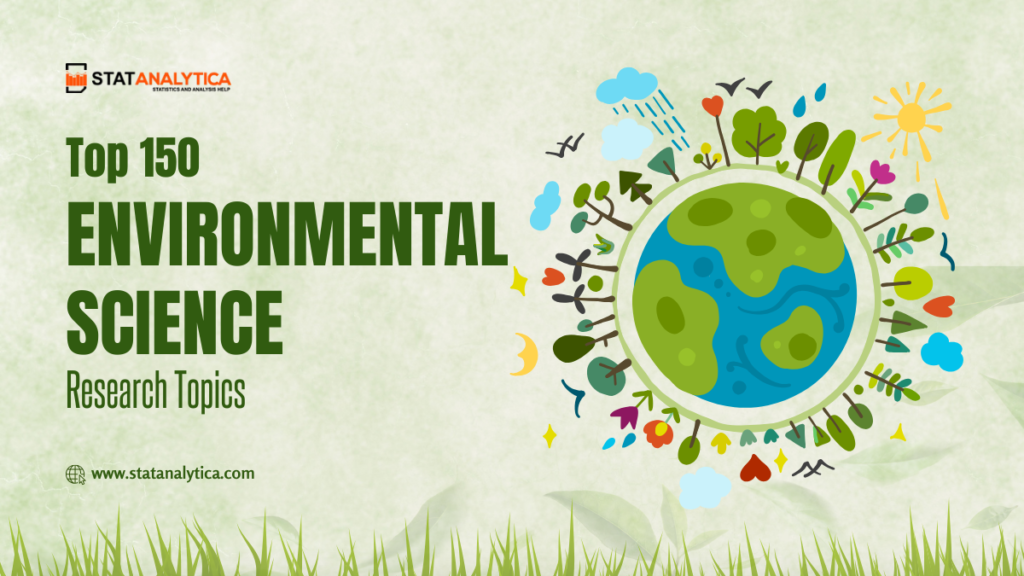
Hey there, fellow explorers of the environmental world. Ready to dive into the kingdom of Environmental Science? We’ve got an epic list of the Top 150 Environmental Science Research Topics waiting for you.
From climate change mysteries to wildlife wonders, this treasure covers it all. Ever wondered about the impact of pollution on our oceans or how to protect endangered species? Curious about sustainable energy or the future of our planet’s forests? We’ve got you covered.
Whether you’re a student seeking inspiration for a killer research paper or just passionate about saving our planet, these topics are your launchpad into discovering, exploring, and understanding the world around us. Get ready to free your inner environmental scientist and make a difference one topic at a time.
Understanding The Concept Of Environmental Science
Table of Contents
Environmental science is a multidimensional field that examines relationships between human beings and the environment. It delves into understanding, protecting, and sustaining our planet’s health. Here’s a quick glance.
What is Environmental Science?
- Interdisciplinary Study: Environmental science combines elements of biology, chemistry, physics, geology, and social sciences to understand environmental issues comprehensively.
- Study of Systems: It focuses on ecosystems, examining how various components interact and influence each other within the environment.
Key Components
- Biodiversity: Understanding and conserving the variety of life forms on Earth.
- Climate Change: Examining the impacts of human activities on the Earth’s climate system.
- Pollution: Investigating the sources, effects, and mitigation strategies for air, water, and soil pollution.
- Resource Management: Exploring sustainable practices for using and conserving natural resources.
Importance of Environmental Science
- Critical Problem-Solving: Addresses pressing issues like habitat loss, water scarcity, and global warming.
- Policy Formation: Provides scientific data to guide environmental policies and regulations.
- Community Engagement: Educates and involves communities in environmental conservation efforts.
Careers in Environmental Science
- Environmental Scientist: Conducts research to identify and solve environmental problems.
- Conservation Biologist: Focuses on protecting and managing natural resources.
- Environmental Engineer: Designs systems to address environmental challenges.
Future Challenges
- Sustainable Development: It includes Balancing economic growth via environmental conservation.
- Climate Resilience: Adapting to and mitigating the impacts of climate change.
- Global Cooperation: Addressing environmental issues requires international collaboration.
Environmental science plays a pivotal role in shaping policies, technologies, and behaviors that contribute to a sustainable future. Understanding its significance empowers us to take proactive steps in preserving our planet for generations to come.
Updated 2024: Top 150 Environmental Science Research Topics
Now we are presenting an extensive collection of current and relevant subjects shaping the field. Covering climate change, biodiversity conservation, pollution, renewable energy, and much more, this curated list reflects the latest trends and pressing issues in environmental science. Dive into these topics to explore cutting edge research opportunities and contribute to the solutions that our planet urgently needs.
Top 10 Research Topics On Climate Change Adaptation Strategies
- Coastal Protection Measures
- Resilient Infrastructure Development
- Sustainable Agriculture in Changing Climates
- Community-Based Adaptation Initiatives
- Water Resource Management Strategies
- Urban Heat Island Mitigation
- Forest Conservation and Restoration
- Climate-Resilient Housing Solutions
- Biodiversity Conservation for Adaptation
- Renewable Energy Integration for Climate Resilience
Top 10 Research Topics On Biodiversity Conservation
- Endangered Species Protection Programs
- Habitat Restoration Initiatives
- Effects of Climate Change on Biodiversity
- Conservation Genetics and Species Preservation
- Sustainable Management of Ecosystems
- Role of National Parks in Biodiversity Conservation
- Community-Based Conservation Efforts
- Biodiversity Hotspots and Priority Areas
- Wildlife Corridors and Connectivity Conservation
- Invasive Species Management Strategies
Top 10 Environmental Science Research Topics On Renewable Energy Sources
- Solar Energy: Advancements and Applications
- Wind Power: Harnessing Renewable Energy
- Hydroelectricity: Sustainable Hydropower Technologies
- Biomass Energy: Sustainable Fuel Sources
- Geothermal Energy: Earth’s Renewable Heat Source
- Tidal and Wave Energy: Harnessing Ocean Power
- Biofuels: Sustainable Alternatives for Transportation
- Solar Photovoltaic Technology: Efficiency and Innovation
- Wind Turbine Technology: Evolution and Efficiency
- Sustainable Energy Policies and Implementation
Top 10 Research Topics On Pollution Control And Mitigation
- Air Pollution Control Strategies
- Water Pollution Remediation Techniques
- Soil Contamination Management
- Industrial Pollution Prevention Methods
- Waste Management and Recycling
- Noise Pollution Reduction Measures
- Emission Reduction in Transportation
- Green Chemistry for Pollution Control
- Urban Planning for Pollution Mitigation
- Policy Frameworks for Pollution Control
Top 10 Environmental Science Research Topics On Sustainable Agriculture Practices
- Organic Farming Techniques and Benefits
- Agroforestry: Integrating Trees in Agriculture
- Permaculture: Sustainable Farm Design
- Soil Health Management in Agriculture
- Precision Agriculture for Resource Efficiency
- Crop Rotation and Diversification
- Water-Efficient Irrigation Methods
- Integrated Pest Management Strategies
- Sustainable Livestock Farming Practices
- Climate-Smart Agriculture Techniques
Top 10 Research Topics On Urban Environmental Management
- Urban Green Spaces and Biodiversity
- Waste Management in Urban Areas
- Air Quality Monitoring and Improvement
- Sustainable Urban Transportation
- Urban Heat Island Mitigation Strategies
- Stormwater Management in Cities
- Noise Pollution Control Measures
- Green Building and Sustainable Architecture
- Community Engagement in Urban Sustainability
- Urban Resilience and Adaptation Strategies
Top 10 Research Topics On Water Resource Management
- Urban Water Conservation Strategies
- Water Recycling and Reuse Methods
- Sustainable Groundwater Management
- Drought Management and Preparedness
- Efficient Agricultural Water Use
- River Basin Management and Restoration
- Stormwater Management Techniques
- Water Quality Monitoring and Protection
- Community-Based Water Resource Management
- Technology for Water Efficiency
Top 10 Environmental Science Research Topics On Air Quality Improvement
- Urban Air Pollution Control Measures
- Industrial Emission Reduction Strategies
- Indoor Air Quality Management
- Impact of Transportation on Air Quality
- Green Technologies for Air Purification
- Role of Vegetation in Air Quality Improvement
- Clean Energy Transition and Air Quality
- Air Quality Monitoring and Assessment
- Public Health Interventions for Air Pollution
- Policy Initiatives for Air Quality Enhancement
Top 10 Research Topics On Ecosystem Restoration
- Wetland Restoration Strategies
- Reforestation and Afforestation Programs
- Coral Reef Rehabilitation Efforts
- River and Stream Restoration Initiatives
- Urban Green Spaces and Restoration
- Degraded Land Restoration Techniques
- Coastal and Marine Habitat Restoration
- Ecological Restoration in Mining Areas
- Restoring Biodiversity in Disturbed Ecosystems
- Restoring Indigenous Ecosystems and Habitats
Top 10 Environmental Science Research Topics On Environmental Policy And Governance
- Climate Change Policies and Agreements
- Environmental Impact Assessment Regulations
- National and International Conservation Laws
- Green Taxation and Incentive Programs
- Sustainable Development Goals Implementation
- Biodiversity Conservation Policies
- Water Resource Management Policies
- Waste Management Legislation
- Air Quality Control and Regulations
- Forest Protection and Governance
Top 10 Research Topics On Wildlife Conservation And Management
- Wildlife Population Monitoring Techniques
- Conservation Genetics for Endangered Species
- Human-Wildlife Conflict Resolution
- Wildlife Trafficking and Illegal Trade
- Habitat Fragmentation and Conservation
- Protected Area Management and Expansion
- Wildlife Migration Patterns and Conservation
- Conservation of Keystone Species
- Captive Breeding and Reintroduction Programs
- Wildlife Forensics and Crime Investigation
Top 10 Research Topics On Ocean And Coastal Studies
- Coral Reef Conservation and Restoration
- Marine Biodiversity Monitoring
- Coastal Erosion and Management Strategies
- Ocean Acidification Impacts and Mitigation
- Marine Pollution: Causes and Solutions
- Oceanography: Understanding Marine Systems
- Sustainable Fisheries Management
- Tsunami and Storm Surge Studies
- Marine Protected Areas and Conservation
- Seabed Mining Impacts and Regulations
Top 10 Environmental Science Research Topics On Environmental Health And Toxicology
- Air Quality and Human Health
- Water Contamination and Public Health
- Pesticides and Human Exposure
- Heavy Metals and Health Impacts
- Endocrine Disruptors in the Environment
- Occupational Health in Hazardous Environments
- Environmental Carcinogens and Risks
- Risk Assessment in Toxicology
- Environmental Impact on Reproductive Health
- Neurotoxicity of Environmental Pollutants
Top 10 Research Topics On Green Technology Innovations
- Smart Grid Technology for Energy Efficiency
- Energy-Efficient Building Designs
- Electric Vehicles and Sustainable Transportation
- Advanced Waste-to-Energy Technologies
- Nanotechnology in Environmental Remediation
- Green Chemistry : Sustainable Manufacturing
- Hydrogen Fuel Cell Technology
- Vertical Farming and Urban Agriculture
- AI and IoT in Environmental Monitoring
- Biodegradable Materials and Packaging
Top 10 Environmental Science Research Topics On Climate Change Adaptation Strategies
- Coastal Zone Adaptation Measures
- Agriculture Resilience to Climate Change
- Water Resource Management under Climate Change
- Infrastructure Adaptation for Extreme Weather
- Forest and Biodiversity Resilience Strategies
- Health Sector Adaptation to Changing Climates
- Indigenous Knowledge in Climate Adaptation
- Climate-Resilient Energy Infrastructure
And there you have it, folks, our ultimate list of 150 Environmental Science Research Topics. We’ve covered everything from climate change and biodiversity to pollution and renewable energy. But hey, this isn’t the end; it’s just the beginning of your eco-journey. Dive into these topics, explore what sparks your interest, and dig deep into making our planet a better place. Whether it’s studying ways to protect endangered species or finding innovative solutions for a greener tomorrow, there’s a topic here for everyone. So, grab your thinking cap, pick a topic, and let’s get cracking on saving the planet one research topic at a time.
Related Posts

Step by Step Guide on The Best Way to Finance Car

The Best Way on How to Get Fund For Business to Grow it Efficiently
351 Environmental Science Research Topics & Ideas
18 January 2024
last updated
Environmental science research topics depend on a vast range of issues pivotal to understanding and safeguarding the natural world. Some themes may dive deep into studies of climate change, assessing its impact on ecosystems and suggesting mitigation strategies. Various topics also explore biodiversity, looking at species conservation and threats to habitats globally. Pollution is another focal area, investigating the sources, effects, and solutions to air, water, and soil contamination. Moreover, sustainable practices focus on renewable energy, green urban planning, and sustainable agriculture. This interdisciplinary field even scrutinizes human behavior, illustrating the complex interplay between socioeconomic factors and environmental health. Thus, environmental science research topics cover exploration, data interpretation, and creative problem-solving, all with the ultimate goal of developing ecologically responsible and sustainable methods for the proper coexistence of people and the natural world.
Hot Environmental Research Topics
- Understanding Climate Change and Food Security Nexus
- Unveiling Mysteries of Deep Ocean Biodiversity
- Exploring Strategies for Sustainable Agriculture
- Harnessing Green Energy: Opportunities and Challenges
- Rethinking Urban Design for Climate Resilience
- Insights Into Ecological Consequences of Deforestation
- Green Building Practices: A Comparative Study
- Endangered Species and Conservation Efforts: A Comprehensive Review
- Examining the Potential of Vertical Farming in Urban Areas
- Strategies for Plastic Waste Management: A Global Perspective
- Microplastics in Marine Ecosystems: An Unseen Threat
- Decoding Links Between Soil Health and Agricultural Productivity
- Effective Water Management Strategies in Arid Regions
- Emerging Contaminants in Freshwater Bodies: Trends and Solutions
- E-Waste Recycling: Technological Advancements and Challenges
- Carbon Sequestration in Forest Ecosystems: A Multidisciplinary Approach
- Human Behavioral Change for Environmental Sustainability
- Analyzing the Effects of Air Pollution on Human Health
- Biodiversity Hotspots and Their Conservation Significance
- Assessing Geoengineering Techniques for Climate Change Mitigation

Easy Environmental Research Topics
- Exploration of Solar Energy Advantages
- Rainwater Harvesting: A Simple Guide
- Why Recycling Matters: A Closer Look
- Green Spaces in Urban Planning
- Wildlife Conservation in Local Communities
- Understanding the Threat of Endangered Species
- Eco-Friendly Farming: The Basics
- Pollution in Cities: An Overview
- Renewable Energy: Current Trends
- Conservation of Water: Simple Methods
- Sustainable Living: Small Changes, Big Effects
- Climate Change: Easy-to-Understand Facts
- Rising Sea Levels: Exploring Causes
- Greenhouse Gases: A Beginner’s Study
- Composting at Home: An Introduction
- Biodiversity in Backyards: A Survey
- Plastic Waste: The Global Picture
- Community Gardens: Environmental and Social Benefits
- Forest Fires and Climate Change: A Link
Interesting Environmental Topics
- Decoding Coral Reef Bleaching Phenomena
- Intricacies of Permaculture Design Principles
- Fascinating World of Biofuels: A Deeper Dive
- Cryptic Life of Microorganisms in Soil Health Maintenance
- Innovative Techniques in Water Purification and Conservation
- Ecology of Urban Bees: A Novel Approach
- Mysterious Decline of Honeybee Populations
- Analysis of Climate Change Predictive Models
- Rise of Veganism: Environmental Implications
- Bizarre Effects of Light Pollution on Wildlife
- Ecosystem Services Provided by Wetlands
- Unfolding the Hidden Costs of Fast Fashion
- Overpopulation and Strain on Environmental Resources
- Wonders of Agroforestry: An Interdisciplinary Investigation
- Unraveling the Puzzle of Eutrophication
- Curious Case of Invasive Species: Winners or Losers?
- Dissecting the Intricacies of Carbon Footprints
- A Magnet for Pollution: The Great Pacific Garbage Patch
- Invisible Enemy: Silent Threat of Indoor Air Pollution
- Glacial Retreat: A Story of Changing Climates
Environmental Research Topics for High School
- Influence of Climate Change on Local Weather Patterns
- Renewable Energy Sources: An Overview
- Understanding the Process of Composting
- Examining the Threat of Endangered Species Locally
- Exploring the Concept of Carbon Footprint
- Deforestation and Its Consequences: A Closer Look
- Greenhouse Effect Simplified: Causes and Consequences
- Waste Management: Importance of Recycling and Reusing
- Biodiversity in Your Backyard: An Introduction
- Diving Into the World of Organic Farming
- Air Quality Index and Its Significance
- Examining Coral Reefs: Importance and Threats
- Water Conservation Techniques for Sustainable Use
- Unpacking the Plastic Problem: From Production to Pollution
- Agriculture and Its Environmental Effects: An Overview
- Urban Heat Islands: Causes and Mitigation Strategies
- Natural Disasters: Causes and Preparation Techniques
- Exploring the Connection Between Diet and Environment
- Invasive Species’ Impact on Native Ecosystems
- Sustainability in Action: Everyday Practices for a Greener Future
Environmental Research Topics for College Students
- Unraveling the Mystery of Coral Bleaching
- Environmental Justice: A Multidisciplinary Approach
- Sustainable Transport: A Comparative Study
- Diving Into Deep Sea Mining: Pros and Cons
- Solar Power Efficiency: Opportunities and Challenges
- Biodegradable Plastics: A Solution or a Mirage?
- Hydroelectric Power: Evaluating Environmental Trade-offs
- Permaculture Principles and Its Real-World Applications
- Ecotourism: An Assessment of Environmental and Social Effects
- Air Pollution and Public Health: An Interdisciplinary Study
- Ecological Footprint: Calculation and Interpretation
- Climate Change Adaptation Strategies in Agriculture
- Industrial Agriculture vs. Organic Farming: A Comparative Analysis
- Urban Planning for Climate Resilience: A Detailed Review
- Conservation Strategies for Endangered Species
- Wetlands: Ecological Importance and Conservation Measures
- Ocean Acidification: Causes and Effects on Marine Life
- Green Architecture: Innovations and Challenges
- Sustainable Waste Management: Technological Innovations and Best Practices
Environmental Research Topics for University
- Interconnections Between Forest Fires and Climate Change
- Assessing Sustainability in Supply Chain Management
- Urban Sprawl and Environmental Degradation: A Case Study
- GMO Crops: An Environmental and Social Analysis
- Geospatial Techniques in Environmental Conservation
- Water Quality in Developing Countries: Comprehensive Study
- Marine Pollution: Sources, Consequences, and Mitigation Strategies
- Environmental Ethics: Perspectives and Applications
- Soil Erosion: Causes, Effects, and Control Measures
- Geoengineering Techniques for Climate Change Mitigation
- Sustainable Urban Development: New Avenues and Challenges
- Nanotechnology in Environmental Remediation: A Critical Review
- Climate Policy and International Relations: A Complex Nexus
- Sustainable Fashion: Practices, Challenges, and Future Directions
- Technological Innovations in Renewable Energy: A Trend Analysis
- Green Spaces and Mental Health: An Interdisciplinary Review
- Trends in Sustainable Aquaculture Practices
- Wildlife Trafficking and Environmental Security: A Global Perspective
- Analyzing the Health Effects of Air Pollution
- Disposal and Management of Hazardous Waste: Current Techniques and Challenges
Topics in Environmental Science Research
- Challenges of Sustainable Resource Management
- Environmental Epigenetics: A New Frontier
- Plant-Based Diets and Sustainability: A Deeper Insight
- Unfolding Mysteries of Climate Migration Patterns
- Urban Ecology: Interactions of Humans and Nature
- Biochar as a Soil Amendment: An Analysis
- Threats to Arctic Ecosystems: A Detailed Review
- Influence of Mining Activities on Local Environments
- Deciphering the Ozone Layer Depletion Puzzle
- Flood Risk Management in Changing Climates
- Regenerative Agriculture: Practices and Prospects
- Methane Emissions From Livestock Farming: A Critical Review
- Ecohydrology: Interactions Between Water and Ecosystems
- Ecological Restoration of Degraded Landscapes
- Exploring the World of Conservation Genetics
- Plastic Pollution in Terrestrial Environments: An Emerging Issue
- Bioinformatics in Biodiversity Conservation: A Novel Approach
- Sustainable Tourism Practices: A Global Overview
- Life Cycle Analysis of Consumer Products
- Urban Farming Innovations: A Potential Solution for Food Security
Research Topics for Environmental Issues
- Deciphering the Global Nitrogen Cycle: Anthropogenic Effects
- Climate-Smart Agriculture: Innovation and Adoption Challenges
- Environmental Governance: Comparative Analysis of Global Frameworks
- Quantifying Biodiversity: Advanced Metrics and Methodologies
- Radiative Forcing From Atmospheric Aerosols: A Detailed Study
- Advancing Sustainable Urban Development: A Systems Perspective
- Environmental Risks of Nanomaterials: A Comprehensive Review
- Plant-Microbe Interactions in Phytoremediation: Molecular Mechanisms
- Ecological Modelling for Ecosystem Service Valuation
- Assessing Future Trajectories of Sea Level Rise
- Climate Change Adaptation: Evaluating the Effectiveness of Policy Interventions
- Agricultural Practices and Soil Carbon Sequestration: An In-Depth Study
- Socioeconomic Determinants of Environmental Behavior: A Cross-Cultural Analysis
- Sustainable Water Management in Arid Regions: Novel Approaches
- Challenges in Implementing a Circular Economy: A Case Study
- Holocene Climate Variability: Paleoenvironmental Reconstructions
- Green Chemistry: Emerging Techniques and Environmental Implications
- Bioenergy Production: Environmental Trade-Offs and Opportunities
- Ecosystem Resilience in the Face of Anthropogenic Disturbances
Environmental Safety and Health Topics for Research
- Health Implications of Air Quality: A Comprehensive Study
- Assessing Occupational Hazards in the Mining Industry
- Water Quality and Public Health: An Interdisciplinary Study
- Developing Safety Protocols in the Chemical Industry
- Exploring the Nexus Between Climate Change and Vector-Borne Diseases
- Managing Safety and Health in the Construction Industry
- Radioactive Pollution: Risks and Mitigation Strategies
- Effects of Noise Pollution on Human Health
- Biosecurity Measures in Agriculture: Policies and Implementation
- Assessing Risks of Genetically Modified Organisms to Human Health
- Exposure to Heavy Metals: Health Risks and Regulatory Standards
- Quantifying Health Impacts of Industrial Pollutants
- Food Safety in a Changing Climate: Challenges and Solutions
- Indoor Air Pollution and Respiratory Diseases: A Detailed Study
- Developing Protocols for Hazardous Waste Management
- Assessing the Health Effects of Microplastics Exposure
- Understanding Health Risks of Pesticide Exposure in Agriculture
- Psychosocial Factors and Safety Culture in the Oil and Gas Industry
- Health Impact Assessment of Nuclear Energy Facilities
Environmental Engineering Topics for Research
- Innovative Techniques in Wastewater Treatment
- Biofuel Production: Process Optimization and Scale-Up Challenges
- Advancements in Water Desalination Technologies
- Novel Materials for Photovoltaic Cells
- Harnessing Energy From Tidal and Wave Power: Engineering Challenges
- Biodegradable Materials for Sustainable Packaging Solutions
- Remediation Techniques for Contaminated Soil
- Carbon Capture and Storage: Technological Developments
- Improving Efficiency of Wind Turbines: A Technical Review
- Sustainable Construction Materials: A Life Cycle Analysis
- Geotechnical Considerations for Offshore Wind Farms
- Green Synthesis of Nanomaterials for Environmental Applications
- Advanced Oxidation Processes for Water Treatment
- Modeling and Optimization of Landfill Gas Recovery
- Acid Mine Drainage: Mitigation Strategies and Techniques
- Environmental Biotechnology: Harnessing Microbes for Pollution Control
- Heat Transfer in Energy Efficient Buildings: An Analysis
- Natural Fiber Reinforced Composites for Construction Applications
- Sustainable Approaches to Pavement Design and Materials
- Developing Energy Efficient Processes in Chemical Industries
Research Topics for Environmental Biology
- Unraveling Symbiotic Relationships in Coral Reefs
- Genetic Diversity and Conservation: An Interdisciplinary Approach
- Decoding the Functioning of Biofilms in Environmental Systems
- Plant-Soil Interactions in Changing Climate Scenarios
- Molecular Mechanisms of Microbial Bioremediation
- Eco-Immunology: Exploring Disease Dynamics in Wildlife Populations
- Plant Adaptation Strategies to Abiotic Stress Factors
- Marine Microbial Ecology: Unseen Life in the Oceans
- Metagenomics Approaches in Soil Microbial Ecology
- Understanding Invasive Species: Genetic and Ecological Perspectives
- Examining Trophic Interactions Under Climate Change
- Phylogenetic Analysis of Endangered Species for Conservation Strategies
- Genomics of Extremophiles: Survival in Harsh Environments
- Investigating Effects of Plastic Pollutants on Aquatic Life
- Landscape Genetics: Applications in Conservation Biology
- Molecular Mechanisms Underlying Plant Responses to Heavy Metal Stress
- Disease Dynamics in Pollinator Populations
- Functional Traits in Community Ecology: A Novel Approach
- Metabolic Engineering for Biofuel Production
Environmental Law Topics for Research
- Environmental Justice in Land Use Planning: A Legal Perspective
- Assessing Regulatory Frameworks for Carbon Markets
- International Law and Marine Plastic Pollution: A Comprehensive Analysis
- Enforcement Challenges in Wildlife Trafficking Laws
- Analysis of Climate Change Litigation: Global Trends
- Understanding the Legal Aspects of Transboundary Water Conflicts
- Legal Frameworks for the Conservation of Migratory Species
- Analysis of Environmental Impact Assessment Laws Across Countries
- Regulating Genetically Modified Organisms: A Comparative Legal Study
- Corporate Environmental Responsibility: Legal and Ethical Dimensions
- Evaluating Legal Mechanisms for Marine Protected Areas
- Exploring Legal Implications of Geoengineering Techniques
- Regulatory Challenges in the Transition to Renewable Energy
- Forest Rights and Conservation: A Legal Analysis
- Legal Frameworks for the Protection of Indigenous Environmental Knowledge
- Laws Regulating Hazardous Waste Management: A Comparative Study
- Legal Implications of Ecological Restoration Projects
- Regulation of Pesticides: Balancing Health and Environmental Concerns
- Legal Instruments for Regulating Noise Pollution: An Overview
- Analysis of International Agreements on Biodiversity Conservation
Environmental Research Topics About Economics
- Economic Valuation of Ecosystem Services: A Critical Review
- Economic Analysis of Climate Change Mitigation Strategies
- Socioeconomic Drivers of Deforestation: A Comprehensive Study
- Green Growth: Challenges and Opportunities for Developing Countries
- Assessing the Economic Viability of Renewable Energy Sources
- Economic Incentives for Biodiversity Conservation: An Overview
- Incorporating Environmental Costs in Product Pricing: A Case Study
- Investigating the Economics of Carbon Capture and Storage
- Market-Based Instruments for Pollution Control: A Detailed Analysis
- Economic Impacts of Natural Disasters: A Global Perspective
- Analysis of Cap-and-Trade Systems for Carbon Emissions
- Investigating the Effectiveness of Environmental Taxes
- Economic Analysis of Sustainable Agriculture Practices
- Assessing the Economic Feasibility of Biofuel Production
- Economic Implications of Water Scarcity: A Cross-Country Analysis
- Transition to a Circular Economy: Economic and Policy Considerations
- Economics of Sustainable Urban Development: A Detailed Study
- Cost-Benefit Analysis of Green Building Techniques
- Economic Impacts of Coastal Erosion and Sea Level Rise
Environmental History Research Topics
- Perception of Climate Change: A Historical Analysis
- Amazon Rainforest’s Environmental History Unraveled
- Consequences of the Agricultural Revolution on Environment: A Detailed Study
- United States Environmental Movements: An Historical Exploration
- Influence of the Industrial Revolution on Modern Environmental Challenges
- Green Spaces in Urban Planning: A History of Urban Parks
- Global Patterns and Causes of Deforestation: A Historical Overview
- Insights From Paleoclimatology: Climate Variability in Historical Context
- Arctic Exploration and Its Environmental History
- The Emergence of Environmental Law: A Historical Understanding
- From Fossil Fuels to Renewables: A History of Energy Transition
- River Management and Conservation: Historical Perspectives
- Lessons for Climate Change Adaptation From The Dust Bowl History
- Causes and Consequences of Marine Pollution: A Historical Analysis
- Natural Resource Exploitation in Colonial Periods: A Historical Overview
- Forest Management Practices: Historical Insights
- Endangered Species Conservation: Understanding the Historical Context
- Environmental Implications of Pesticide Use: A Historical Analysis
- Nuclear Age: Unraveling Its Environmental History
Controversial Environmental Research Topics
- Genetically Modified Crops: Environmental Savior or Biohazard?
- Nuclear Energy: A Sustainable Solution or Environmental Risk?
- Hydraulic Fracturing and Its Environmental Consequences
- Climate Change Denial: Analyzing the Motives and Consequences
- Geoengineering Solutions for Climate Change: Promise or Peril?
- Anthropocene: Valid Geological Epoch or Human Egotism?
- Intensive Animal Farming: Environmental Concerns and Ethical Dilemmas
- De-extinction and Its Potential Ecological Consequences
- Plastic Waste Management: Incineration vs. Recycling
- Neonicotinoids and Bee Decline: Assessing the Controversy
- Economic Growth vs. Environmental Protection: Reconciling the Dichotomy
- Landfilling vs. Zero Waste Approach: A Comparative Study
- Ocean Fertilization as a Carbon Sequestration Strategy
- E-Waste Management: Export or Domestic Recycling?
- Noise Pollution: Overlooked Environmental Hazard or Nuisance Issue?
- Fast Fashion Industry and Its Environmental Footprint
- Artificial Intelligence in Environmental Management: Boon or Bane?
- Palm Oil Production and Biodiversity Loss: A Complex Connection
- Desalination Plants: Solution for Water Scarcity or Ecological Threat?
Persuasive Environmental Research Topics
- Promoting Green Energy Transition: Evaluating Success Stories
- Waste Segregation at Source: An Essential Step Toward Effective Waste Management
- Adoption of Organic Farming for Sustainable Agriculture
- Nature-Based Solutions: An Underutilized Tool in Climate Change Mitigation
- Changing Consumer Behavior for Sustainable Fashion
- Shifting to Public Transportation: A Key to Urban Sustainability
- Coral Reef Protection: Strategies and Success Stories
- Green Building: A Must for Sustainable Urban Development
- Incorporation of Environmental Education Into School Curriculum
- The Shift From Fast to Slow Fashion: Need of the Hour
- Afforestation as a Natural Climate Solution: Examining Its Potential
- Promoting Circular Economy: A Way Forward for Waste Reduction
- Divestment From Fossil Fuels: An Imperative Climate Action
- Supporting Indigenous Knowledge for Biodiversity Conservation
- Plant-Based Diet: A Strategy for Reducing Carbon Footprint
- Urban Green Spaces: Essential for Human Wellbeing and Biodiversity
- Adoption of Electric Vehicles: A Key to Reduce Carbon Emissions
- Reducing Single-Use Plastics: A Critical Move Toward Sustainability
- Transitioning to Sustainable Fishing Practices: A Global Priority
- Decentralized Renewable Energy Systems: A Solution for Energy Access and Climate Mitigation
Argumentative Environmental Research Topics
- Dams and Hydroelectric Power: Net Gain or Loss for the Environment?
- Wind Energy: Assessing Arguments Around Bird Mortality
- Population Control: Necessary Environmental Strategy or Human Rights Violation?
- International Trade and Its Environmental Consequences
- Arguments Around Carbon Trading and Its Efficacy
- Trophy Hunting: Conservation Strategy or Ecological Disaster?
- Marine Protected Areas: Effective Conservation or Displacement of Fishing Pressure?
- Arguments For and Against Climate Change Geoengineering
- Food Waste: Ethical, Environmental, and Economic Implications
- GMOs and Biodiversity: Assessing Potential Risks
- Arguments Surrounding Water Fluoridation: An Environmental Perspective
- Ecotourism: Sustainable Practice or Threat to Wild Areas?
- Carbon Capture and Storage: Viable Solution or Costly Distraction?
- Deep Sea Mining: Economic Opportunity or Ecological Risk?
- Aquaculture: Solution to Overfishing or New Environmental Problem?
- Arguments For and Against Biofuels as a Green Energy Source
- Fusion Energy: Future of Clean Energy or Pipe Dream?
- Debate Around the Environmental Effects of Cryptocurrency Mining
- Environmental Implications of Space Travel and Exploration
Research Topics for Environmental Debates
- Pros and Cons of Solar Geoengineering as a Climate Solution
- Arguments Surrounding the Use of Genetically Modified Mosquitoes
- Land Rights vs. Conservation: Examining the Debate
- Debate Around Large-Scale Reforestation and Natural Forest Regrowth
- Investigating the Controversy Over Invasive Species Control
- Environmental Justice in Waste Management: A Heated Debate
- Nuclear Power in the Age of Renewable Energy: An Ongoing Debate
- Controversy and Debate Surrounding Carbon Taxes
- Debating the Effects of Air Travel on Climate Change
- Green New Deal: Revolution or Unrealistic Ambition?
- The Controversy Around Synthetic Meat: Environmental Savior or Unproven Experiment?
- Analyzing the Debate Surrounding E-Waste Export Policies
- Understanding the Ongoing GMO Labeling Debate
- Debates Around Solar Energy and Land Use
- Animal Rights vs. Conservation: Unpacking the Conflict
- Exploring the Controversial Intersection of Environmentalism and Immigration
- Debate Over Ocean Acidification and Its Effects on Marine Life
- Investigating the Debate on the Environmental Impact of Veganism
- Analyzing the Controversy Over Urban Vertical Farming
- Debate Surrounding Environmental Cost of Electric vs. Gasoline Cars
To Learn More, Read Relevant Articles
293 good nutrition research topics & ideas, 801 chemistry research topics & interesting ideas.

Top 111 Environmental Issues Research Topics to Explore
The environment is experiencing a series of problems that have never been seen before. Climate change , which is about to occur, the terrifying rate at which biodiversity is decreasing, and pollution as a ubiquitous problem, among others, have made environmental issues some of the main concerns in today’s world.
It is important to carry out research and create awareness on these critical topics in order to achieve positive transformation and develop sustainable solutions.
This list contains 111 thought-provoking and pertinent environmental research topics that will be invaluable for students, academics, policymakers, or anyone else who cares about protecting our planet’s future.
Whether you are investigating the complexity of ecosystem networks and human activities’ effects on them or looking for new ways of preserving the environment, these issues are perfect for exploring the intricacies of our natural world with an eye toward making it more sustainable.
Importance of Environmental Research
Table of Contents
Studying the environment is extremely important. By doing careful research, we can better understand the connections between human actions and nature. Environmental research helps us in several key ways:
- Growing our Knowledge
It expands what we know about complex ecosystems, climate patterns, diverse life forms, pollution issues, and how different parts of the environment are linked together. This knowledge lays the groundwork for making good decisions.
- Identifying Environmental Dangers
Research helps spot new environmental threats, such as new types of pollution, habitat loss, or the effects of climate change, by closely examining data and evidence. Knowing about these threats means we can take action to prevent or reduce potential harm.
- Finding Sustainable Solutions
By examining what causes environmental damage, researchers can create new solutions for sustainability—using resources wisely and protecting the environment. Solutions could involve new technologies, policy changes, or changing human behaviors.
- Guiding Policies and Decisions
Environmental research gives policymakers, governments, and organizations the scientific proof and facts needed to make smart choices about environmental rules, conservation efforts, and sustainable development plans.
- Raising Public Awareness
Research findings shared through simple communication play a huge role in raising the public’s awareness of environmental issues. This can influence public opinion and motivate people to be more environmentally responsible.
By investing in environmental research, we gain extremely valuable insights into our planet’s complex workings. This allows us to develop strategies to tackle environmental threats, protect diverse life, and promote sustainability for present and future generations.
Recommended Readings: “225 Social Work Research Topics For College Students – Ideas For College Students “.
Top 111 Environmental Issues Research Topics
Here is our list of the top 111 environmental issues research topics, organized into different categories; let’s take a look.
Climate Change and Global Warming
- How melting ice at the North and South poles raises sea levels.
- How cutting down forests makes climate change worse.
- Ways to reduce the pollution from cars and trucks.
- What happens to oceans when they become more acidic?
- Reviewing if global agreements, like the Paris Agreement, really work.
- How bad weather harms communities and buildings.
- Ways to switch to cleaner energy like wind and solar power.
- How farm animals produce gas that’s bad for the environment.
- Big cities are becoming hotter than surrounding areas.
- Finding ways for places to handle extreme weather.
Biodiversity and Conservation
- Why is losing homes for animals and plants a big problem?
- Why saving some animals and plants can save whole ecosystems.
- Ways to stop people from selling endangered animals and plants.
- Programs to help animals and plants in danger of disappearing.
- How can tourists help protect nature and help local people?
- Why can animals and plants from other places be a problem?
- Why is having many different plants and animals important?
- How pollution makes water dangerous for plants and animals.
- How some native people can help protect the environment.
- Making special areas where nature is kept safe.
Pollution and Waste Management
- What happens when too much plastic gets into the oceans?
- Ways to use less plastic and make more things out of recycled plastic.
- How dirty air hurts people’s health.
- What happens when old electronics get thrown away?
- Dirty water from factories and farms goes into rivers.
- Cleaning up places that are dirty from old factories.
- Why loud noises can hurt animals and people.
- Getting rid of dangerous waste safely.
- What happens when too many lights at night hurt nature?
- Making chemicals that don’t hurt the environment.
Water Resources and Management
- How to save water in places where it’s very dry.
- What happens when there’s not enough water for farmers?
- Medicine and soap are getting into the water.
- Making dirty rivers and lakes clean again.
- How wetlands can help clean water and stop floods.
- Using less water in cities and on farms.
- Why climate change makes water harder to find.
- Sharing water with people who live nearby.
- What happens when drilling deep into the ground for gas?
- Making sure everyone has clean bathrooms.
Land Use and Agriculture
- How farming can make the ground worse.
- Ways to farm without making climate change worse.
- Cities were growing too big and covering up nature.
- Making dry places into places where things can grow again.
- Growing trees where crops are grown too.
- Why is having only one kind of plant a bad idea?
- The ground is getting dirty from bug killers and metals.
- Making rules about where things can be built.
- People who have always lived in a place protecting nature.
- Growing food in cities to help everyone eat.
Renewable Energy and Technology
- New ways to get energy from the sun.
- How wind can make electricity without pollution.
- Machines using the power of ocean waves.
- Getting heat from underground to make electricity.
- Better batteries to save energy from the sun and wind.
- Poor countries having a hard time getting clean energy.
- Smart ways to use electricity in homes and cities.
- Mixing clean energy into what we already use.
- Big dams hurting animals and plants.
- Making energy from things that were once alive.
Environmental Policy and Governance
- Checking if projects hurt nature before they start.
- How laws can make businesses pollute less.
- How groups speaking up for nature can change laws.
- Fair treatment for everyone when fixing problems.
- Countries work together to fix problems they share.
- Why is it hard to stop people from selling animals and plants?
- Listening to people who have lived in a place for a long time.
- Taxes and rewards for making less pollution.
- Companies take care of the planet they use.
- What people know and feel about nature and rules.
Human Health and Environment
- How getting nature dirty can make people sick.
- Breathing in dirty air makes people cough.
- How bug killers and other chemicals can hurt people.
- Having clean water to drink, cook, and wash with.
- Bugs spread sickness faster when it gets hotter.
- Feeling sad or worried when bad things happen to nature.
- Everyone has the same chance to see a doctor.
- Feel better when there are parks and trees around.
- Jobs that are bad for people and the planet.
- Teaching doctors and nurses about nature and sickness.
Environmental Education and Communication
- Learning about nature helps take care of it.
- Making people care about nature by talking to them.
- Teaching kids in school about taking care of nature.
- How TV and news tell people about problems in nature.
- Regular people help scientists with their work.
- Telling stories about nature to make people care.
- Using social media to talk about nature and problems.
- Sharing stories about nature to make people care more.
- Making sure everyone knows about nature, even if they’re far away.
- Checking if teaching about nature works well.
Sustainable Development and Green Economy
- Using things again and again to make less trash.
- Using money to help make things better for nature.
- Jobs in clean energy and helping nature.
- Making cars and trucks that don’t make bad air.
- Using only what’s needed so as not to make extra trash.
- Making things better for people who don’t have much.
- Making cities with trees and parks to help with heat and rain.
- Traveling in a way that doesn’t hurt nature.
- Using machines that don’t make the air dirty.
- Helping neighborhoods without hurting nature.
Ecosystem Services and Natural Resource Management
- How does nature help people, and what is it worth?
- Paying to keep nature safe and healthy.
- Using nature to help with big weather changes.
- Fishing and taking care of oceans and rivers.
- Bugs that help plants make food and other plants.
- Trees and grasses that stop water from washing away land.
- Cleaning up land and water that’s dirty.
- Using what people knew about nature long ago to help now.
- Parks and trees help people and nature in cities.
- Fixing a broken nature can help with big problems.
- People who lived somewhere for a long time took care of nature.
These topics cover a wide range of environmental issues and offer ample opportunities for research and exploration within each category. Feel free to select a topic that aligns with your interests and expertise for further investigation.

Tips For Choosing the Right Environmental Issues Research Topics
With so many big environmental issues to study, picking the perfect research topic can feel really hard. But by thinking about a few key things, you can find a topic that fits what you like and your goals and can make an important impact. Here are some helpful tips to guide you:
- Find Your Passion: Choose a topic that truly excites and motivates you. When you really care about the subject, you’ll work on the research with joy and hard work, leading to better results.
- Look at Current Events: Search for topics that are in the news right now or being talked about a lot in the science world. Studying current issues can make your research more impactful and relevant.
- Study Local Problems: Examine environmental problems in your local area or region. Focusing on issues that directly affect your community can provide useful insights and solutions tailored to your situation.
- Check for Links Across Topics: Many environmental issues connect to multiple subjects, such as science, economics, policy, and social studies. Exploring these links across different topics can lead to unique and insightful research angles.
- Find Knowledge Gaps: Review existing research to identify areas that need more study. Filling these gaps in knowledge can greatly advance our understanding of environmental challenges.
- Consider What’s Realistic: Consider whether your chosen topic is possible based on your resources, access to information, and the size of the research. Finding a balance between dreaming big and being realistic is key.
- Ask for Help: Talk to professors, researchers, or professionals to gain valuable advice on selecting an impactful research topic.
Remember, the right environmental research topic should excite you and give you a chance to make meaningful progress on environmental issues .
By carefully considering these tips, you can find a topic that fits your goals and makes an important contribution to environmental sustainability.
Closing Up
The environmental problems we face today are very complicated, but through hard work researching and finding solutions, we can build a path toward a more sustainable future.
The 111 research topics in this big list offer a wide range of opportunities to explore the complex workings of nature deeply and find ways to tackle major issues like climate change, the loss of plant and animal species, pollution, and overuse of resources.
Whether you are a student wanting to make an important contribution, a researcher driven by curiosity, or someone passionate about protecting the environment, these topics provide a solid foundation for exploration and discovery.
By combining different subjects, working together, and using the power of scientific study, we can gain extremely valuable insights and create new strategies to reduce environmental damage and promote harmony between humans and the natural world.
Environment research is not just for academics; it is crucial work that could shape policies, influence behaviors, and inspire collective action toward a greener, stronger planet.
As we begin these research journeys, let’s feel a sense of urgency and be firm in our commitment to uncovering solutions that protect the delicate balance of our ecosystems for future generations.
How do I choose an environmental research topic that is relevant and impactful?
Look for topics that align with current global priorities like the United Nations’ Sustainable Development Goals or issues frequently discussed at major environmental conferences. You can also consult experts to gauge the potential impact of your chosen topic.
Can I combine multiple environmental issues into one research topic?
Yes, absolutely! Many environmental challenges are interconnected, so exploring the relationships between different issues can lead to insightful research. For example, you could look at the links between deforestation, biodiversity loss, and climate change.
Are there any underrepresented or emerging environmental topics to consider?
Yes, there are several underrepresented or new issues that need more attention, such as environmental justice, impacts of microplastics, environmental effects of cryptocurrency mining, and the role of traditional ecological knowledge in conservation.
Similar Articles

Top 19 Tips & Tricks On How To Improve Grades?
Do you want to improve your grades? If yes, then don’t worry! In this blog, I have provided 19 tips…

How To Study For Final Exam – 12 Proven Tips You Must Know
How To Study For Final Exam? Studying for the final exam is very important for academic success because they test…
Leave a Comment Cancel Reply
Your email address will not be published. Required fields are marked *
This site uses Akismet to reduce spam. Learn how your comment data is processed .
- Research Paper Guides
- Research Paper Topics
Environmental Research Topics: 235 Ideas for Students
- Speech Topics
- Basics of Essay Writing
- Essay Topics
- Other Essays
- Main Academic Essays
- Basics of Research Paper Writing
- Miscellaneous
- Chicago/ Turabian
- Data & Statistics
- Methodology
- Admission Writing Tips
- Admission Advice
- Other Guides
- Student Life
- Studying Tips
- Understanding Plagiarism
- Academic Writing Tips
- Basics of Dissertation & Thesis Writing
- Essay Guides
- Formatting Guides
- Basics of Research Process
- Admission Guides
- Dissertation & Thesis Guides

Table of contents
Use our free Readability checker

You may also like

Are you looking for environmental research paper topics? With ongoing debates about global warming, air pollution, and other issues, there is no shortage of exciting topics to craft a research paper around. Whether you’re studying ecology, geology, or marine biology, developing the perfect environmental research topic to get your science research assignment off the ground can be challenging. Stop worrying – we got you covered. Continue reading to learn about 235 different ideas on environmental research topics. In this article, we will discuss environmental topics and show you how to choose an interesting research topic for your subject. We will also provide a list of various environmental topics from our research paper services . In addition, we will present you with environmental science research topics, discuss other ideas about the environment for research papers, and offer our final thoughts on these topics for research papers.
Get in touch with our academic writing service and receive expert help. Let us know your topic, pay for research paper and get an excellent result in no time.
Joe Eckel is an expert on Dissertations writing. He makes sure that each student gets precious insights on composing A-grade academic writing.
Environmental topics provide an analysis of environmental issues and their effect on people, culture, nature, or a particular place, often interdisciplinary, drawing from sciences, politics, economics, sociology, and public policy. Topics about environmental science may include environmental justice, engineering and communication, regulation, economics, and health. Environment research topics may focus on environmental sustainability, impact assessment, management systems, and resources. In addition, these areas for research papers offer a few opportunities to explore our relationship with the environment and consider how human activities influence it through climate change, pollution, or other factors such as natural resource usage as well as biodiversity loss.
When choosing an environmental research topic, it is essential to consider what makes good environmental topics. Below is an expert list outlining what your topic should be like:
When choosing research topics for environmental science, it is essential to research the available information and determine its relevance. It all depends on whether the research topic is feasible and has the potential for exploration. Environmental issue topics should be well-defined and interesting to the researcher. The reason is that the researcher should be able to provide solutions or make suggestions on improvement strategies. You can follow the below steps when choosing environmental science topics for research:
Step 1: Identify topics that are relevant to your research context. Step 2: Develop a list of research areas by extracting critical concepts from the available literature.
Step 3: Select interesting and feasible topics by considering the methods available for analysis.
Step 4: Analyze these topics to identify the gaps in current research and formulate questions for further investigation. Step 5: Review the available literature to gain insights about the chosen topic and develop a research proposal.
Step 6: Consult experts in this field to get feedback and refine the proposed research.
Don’t have time for writing your environmental research paper? Count on StudyCrumb. Send us a ‘ write a research paper for me ’ message and get professional assistance in a timely manner.
Environmental topics for a research paper can be overwhelming to navigate due to the vast number of issues you can discuss in your article. To help narrow down your research paper search, below is a list of environmental research topics that include climate change, renewable energy, ecology, pollution, sustainability, endangered species, ecosystems, nature, and water management. You can choose one of them as a guide to writing an excellent essay
Climate change is one of the most pressing issues that humanity is currently facing due to increased temperature levels. Climate change is amongst the most debated environmental research topics among researchers, policymakers, and governments. Here are critical areas related to climate change that you can use for your environmental science research paper topics:
Renewable energy is essential due to its potential to reduce ecological damage from burning fossil fuels and provides valuable topics in environmental science. You can use renewable energy technologies as a cleaner alternative for generating electricity and heating. In addition, renewable energy is crucial for cooling homes and factories in the world. The following are environmental science topics for research paper on renewable energy:
Ecology studies how living organisms interact with each other and their environment. Also, it is an important area of research for understanding how the environment affects the function of various species and ecosystems. It also gives a background for one of the best environment research paper topics. Below are topics for environmental research paper on ecology:
Pollution is an issue at the forefront of scientific research. As one of the environmental science paper topics, it offers insights into how pollution destroys the environment and its negative impact on human and animal health. Stated below are hot environmental science research topics on pollution which you can use for your article:
One of the many topics for environmental research papers is sustainability. Sustainability is an important topic to explore, as it involves finding a way for humans to reduce their ecological footprint and ensure that the environment can recover from our activities. Stated below are environmental topics for research paper on sustainability which you can explore:
Endangered species are one of the environmental topics of great importance to research and find solutions for their conservation. Poaching, habitat destruction, and climate change negatively impact endangered species. Also, human activities have put other species at risk of extinction by competing for resources as well as introducing invasive species. Below is a list of cool environment topics to write about endangered species:
Ecosystems are fascinating to explore in environmental paper topics because they contain a variety of living organisms and are a complex web of interactions between species, the environment, and humans. The subject provides environmental issues topics for research paper essential in exploring the dynamics of ecosystems and their importance. Below is a list of topics for environmental science research paper:
Nature is a broad topic that includes ecological conservation, protection, and sustainability issues. Environmental research topics about nature allow us to explore areas that focus on preserving and conserving the environment. Research papers about nature can provide insight into utilizing nature as a resource, both from a practical and ecological aspect. Below is a list of environment topics that you can explore in your essays:
Water management is an issue that has a significant impact on the environment. Exploring a topic related to water management can provide experts, among others, with insights into environmental science issues and their implications. When it's time to write your project related to water management, you can explore the following topics for environmental issues:
Environmental science studies ecological processes and their interactions with living organisms. Exploring environmental science related topics can provide valuable insights into environmental science issues, their ecological implications, and conservation efforts. In addition, these topics can also be explored in different areas, providing a comprehensive understanding of how different factors impact the environment. This section delves into various environmental science topics for projects related to law, justice, policy, economics, biology, chemistry, and health science.
Environmental law governs environmental processes and their interactions with living organisms. Delving into environmental law can uncover invaluable information on environment paper topics, ranging from legal matters and their consequences to preservation initiatives. Students can use the following environmental issue topics for research papers for their essays:
Environmental justice seeks to ensure equitable treatment and meaningful involvement of all people in ecological protection, regardless of their race, sex, or economic status. Environment topics related to justice can provide valuable insights into ecological issues and their impacts. Listed below are justice-related Environmental topics to research:
Environmental policy is a set of laws, rules, and regulations created to protect the environment as well as its resources. Studying environment-related policies provides an area for students to explore a range of subjects related to the environment, ranging from local to global. Below are potential environmental sciences research topics for your reference.
Environmental economics seeks to understand environmental issues from an economic perspective. Examining environmental studies topics can offer insights into ecological conservation and sustainability while connecting protection efforts with economic interests and helping inform policies. The following are creative topics about environmental science related to economics:
>> Learn more: Economics Research Topics
Environmental biology is a field of science that focuses on understanding the interactions between living organisms and their environment. It covers environmental biology topics such as biodiversity, conservation, pollution, management, health, and sustainability. The following are environment research paper topics related to biology:
Keep in mind that we have a whole blog on biological topics if you need more ideas in this field.
Environmental chemistry research is a complex interdisciplinary field aiming to understand the behavior of a chemical process within an environment. It involves researching the impact of pollutants in the air, soil, water, and other ecological media. Possible research topics about the environment related to this field include:
Need more ideas? There is one more blog with chemistry research topics on our platform.
Environmental health is a diverse field focusing on the natural environment as well as its effects on human health. It is an interdisciplinary field that offers environment topics for research, such as environmental epidemiology, toxicology, and ecology, in addition to risk assessment. Provided below is a list of topics for an environmental science project that is suitable for your research paper:
Ecological crisis is a key issue that has continuously affected planet earth. People are becoming more aware of environmental problems as well as their impact on health, well-being, and quality of life. As such, ecological fields for research are becoming ever more critical. This section will explore interesting environmental topics related to current ecological issues, controversial, interesting topics, easy research questions for projects, as well as unique research areas which students might study. These environmental issue project ideas below will help you develop interesting fields for research papers.
Current ecological issues are a hot topic that has become increasingly important. They provide outstanding environmental issues to write about due to their impact on the environment and human health. The following are environmental issue topics for paper writing that are currently in discussion:
Environmental controversies constitute a significant challenge facing society today. From climate change to air and water pollution, the effects of human activity on our natural environment are increasingly becoming a focus of public debate and research. Research papers on environmental controversial topics can help inform the public as well as policymakers about the potential impacts of human activities on the environment. The following are examples of environmental controversy topics for research paper:
In the context of environmental subjects, research topics explore the effects of human activities on the environment as well as the potential solutions to the identified problems. In addition to providing insight into ecological protection and conservation, research areas in this category cover social issues related to environmentalism and ecological justice. Below are interesting environmental science topics to consider when looking for a research topic in the future:
When it comes to environmental science topics for project work, there are plenty of easy options. Research projects in this category can explore ecological issues as well as their consequences or potential solutions to these problems. The following is a list of the top fifteen most accessible environment project topics for your research project.
As environmental issues become increasingly complex, research fields for students become more varied. Unique environmental research topics for college students can range from local ecological concerns to global ones. The following are fifteen unique environmental science research topics for high school students and college students:
This article has provided 235 environmental science research topics for research papers as well as project work that high school and college students can use. Topics range from local issues, such as assessing air pollution levels in an urban area, to global concerns, like examining the ecological effects of plastic pollution. Whether its health risks are associated with air pollution in an environment or the impacts of industrialization, research can help shape your understanding of how to protect as well as preserve our planet. It is up to the students to identify good environmental research topics that are interesting and relevant to them and to delve deeper to understand the earth better.
- It should be interesting and relevant to your study field.
- It's essential to consider the topic's potential implications on environment-related policies. Think about the possible positive or negative effects this topic could have when implemented in terms of protecting our environment.
- A good topic should be specific enough to provide a focus for your research paper and allow you to explore a particular issue in depth.
- The research topic should be feasible and manageable to ensure that you can find the necessary information and resources.
- Environmental sciences research topics should be current and relevant to ecological developments.
- Causes and effects of climate change.
- Climate change adaptation strategies.
- Climate change impact on rural communities.
- Role of renewable energy sources in mitigating climate change.
- Carbon dioxide emission policies.
- Global warming and its impact on ocean acidification.
- Social effects of climate change.
- Permafrost melting and its implications.
- Role of international organizations in climate change.
- Climate change and forest fire: examining the role of climate change on wildfire season, frequency, and burned area.
- Renewable energy types, sources, and their impact on the environment.
- Economic benefits of renewable energy.
- Research on new technologies in renewable energy.
- Role of renewable energy in protecting businesses from legal actions.
- Hydropower and its role in renewable energy.
- Chemical batteries for renewable energy storage.
- Green microgrids in optimizing renewable energy usage.
- Ocean energy and its effects on the environment.
- Geothermal drilling and its consequences.
- Biomass resources and their use in renewable energy.
- Biodiversity conservation strategies.
- Impact of pollution on ecosystems.
- Ecological research on saving endangered species from extinction.
- Role of environment in migrations patterns of animals.
- Habitat fragmentation effects on the environment.
- Ecological implications of climate change.
- Ecology and pest control strategies.
- Ecological effects of deforestation.
- Ecology and conservation of marine life.
- Ecological consequences of urbanization.
- Air pollution: causes & effects.
- Water pollution and its consequences for people and other living organisms.
- Issue of urban & industrial pollution.
- Noise pollution and environment-related health risks.
- Marine plastic pollution in oceans.
- Radiological waste disposal policies.
- Nuclear energy, radiation & health impacts.
- Sustainable waste management solutions.
- Impact of pollution on biodiversity.
- Soil pollution and its effects on agriculture.
- Strategies for sustainable development.
- Renewable energy sources and their effects.
- Environmental sustainability and its economic benefits.
- Sustainable energy sources and their effects.
- Implications of sustainable agriculture on the environment.
- Ecological impacts of sustainable forestry.
- Social implications of renewable energy use.
- Strategies for mitigating ecological impact from unsustainable development.
- Psychological effects of ecological awareness on sustainable practices.
- Influence of ecological sustainability on economic growth.
- Endangered species conservation.
- Causes & effects of habitat fragmentation.
- Wildlife conservation strategies.
- Climate change impacts on endangered species.
- Illegal wildlife trade and trafficking.
- Marine protected areas for conserving marine life.
- Ecological restoration and reintroduction programs.
- Endangered species in developing nations.
- Human rights & animal welfare laws .
- Captive breeding for conservation purposes.
- Ecosystem services & their value.
- Climate change impacts on ecosystems.
- Hydrological cycle & effects on ecosystems.
- Ecological restoration & biodiversity conservation.
- Invasive species & their impact on native species.
- Biodiversity hotspots: areas of high endemism.
- Soil degradation & its impact on ecosystems.
- Sustainable forestry practices.
- Ecological restoration of wetlands.
- Nature conservation & preservation strategies.
- Climate change effects on natural environments.
- Natural resource management strategies.
- Policies for natural resources management.
- Impact of human development on wildlands.
- Sustainable use of natural resources.
- Role of ethics in nature conservation.
- De-extinction: pros & cons of bringing back extinct species.
- Protected areas & conservation of rare species.
- Water pollution & its control.
- Groundwater management strategies.
- Climate change impact on water resources.
- Integrated water resources management.
- Wetland conservation & restoration projects.
- Industrial effluents role in water pollution.
- Desalination technologies for freshwater production.
- Urbanization impact on groundwater resources.
- Inland & coastal water management strategies.
- Wastewater treatment & reuse technologies.
- Climate change liability & lawsuits.
- Strategies for conservation and protection under environmental law.
- Consequences of non-compliance with regulations on the environment.
- Impact of trade agreements on environment protection.
- Regulatory strategies for hazardous waste disposal.
- Strategies for enforcement and compliance with environment-related laws.
- International environment treaties and their implications.
- Effects of climate change legislation on the environment.
- Corporate environmental policies and regulations and their effects.
- Role of law in mitigating environment-related issues.
- Implications of unequal access to resources.
- Disproportionate impacts of climate change on vulnerable populations.
- Consequences of marginalization of marginalized communities from environmental processes.
- Links between poverty and environment degradation.
- Effects of non-participation in environment-related decision-making.
- Policies to ensure access to clean air and water.
- Impact of social inequality on environment protection.
- Intersection between gender, race, and environment justice.
- Ecological consequences of corporate negligence of marginalized communities.
- Disproportionate implications of climate change on vulnerable populations.
- Environmental policy initiatives' implications on global climate change.
- Effectiveness of carbon taxes for air pollution control.
- Land use and development impact on the environment.
- Water quality in the united states, focusing on natural resource governance.
- Educational initiative's impact on public opinion and policy outcomes.
- Social aspects of policy making and implementation on the environment.
- Promoting sustainability from a global perspective.
- Potential for justice initiatives in promoting equitable and effective management.
- Rise of green economy its impact.
- Environment policies and their potential for success.
- Economic impacts of regulating the environment.
- Strategies for environmentally sustainable economic growth.
- Consequences of non-compliance with environment-related regulations.
- Environment conservation and protection using economic incentives.
- Taxes and subsidies and their implications on the environment.
- Economic implications of climate change legislation.
- The private sector role in environment conservation and protection.
- Green finance role in mitigating ecological issues.
- Economics of pollution control and management.
- Conservation and protection of the environment in the face of economic interests.
- Biodiversity conservation in managing the environment.
- Role of biotechnology in reducing air pollution.
- Environment degradation and its consequences on wildlife.
- Role of microorganisms in maintaining soil fertility.
- Ecological consequences of over-exploitation of natural resources.
- Habitat fragmentation and its role in species conservation.
- Education's role in environment conservation.
- Environment degradation and its effects on food security.
- Invasive species and their impacts on ecosystem.
- Effect of agricultural chemicals on water systems.
- Air pollution control strategies and their effectiveness.
- Climate change impacts on aquatic ecosystems.
- Sources and implications of persistent organic pollutants.
- Air quality monitoring for urban areas.
- Water quality monitoring in coastal areas.
- Characterization and fate of toxic compounds in soil and groundwater.
- Impact of hazardous chemical waste on the environment.
- Monitoring and remediation of contaminated sites.
- The roles of environmental chemistry in climate change research.
- Air pollution effects on human health.
- Climate change effects on health.
- Water pollution and public health.
- Noise pollution effects on well-being.
- Mental health effects of environment-related toxins.
- Human health effects of natural disasters.
- Urbanization's effect on human health.
- Sustainable development and public health.
- Role of social media in promoting environmental health and awareness.
- Biodiversity preservation and its impact on human health.
- Global warming and how to prevent its impact.
- Sustainable energy and its role in protecting the environment.
- Water conservation practices.
- Renewable energy role in global ecological protection.
- Carbon footprint and climate change.
- Ozone layer depletion and its effects on human health.
- Plastic pollution and its impact.
- Land degradation and soil erosion.
- Energy industry activities effects on ecological health.
- Air pollution and its impact on human health.
- Deforestation and its consequences.
- Effect of agricultural practices on ecological health.
- Overuse and exploitation of natural resources.
- Industrial waste impact on health.
- Green technology role in ecological protection.
- Climate change: is human activity a primary cause of global warming.
- Deforestation: are current logging practices sustainable in the long term.
- Air pollution: what are the health impacts of air pollution.
- Water pollution: how is water pollution impacting biodiversity and ecosystems.
- Geothermal energy: what potential impacts does geothermal energy extraction have on the environment.
- Renewable energy: are wind and solar energy carbon-neutral.
- Arctic drilling: is drilling for oil in the arctic ocean a viable option given current climate conditions.
- Nuclear power: what health risks are associated with nuclear power plants.
- Biodiversity loss: what steps can you take to protect biodiversity from human activities.
- Endangered species: how protecting endangered species can impact conservation efforts and how they live.
- GMO foods: are genetically modified organisms safe for human consumption? how does GMO food affect humans.
- Pesticides: how does pesticide use affect our health and the environment.
- Ocean acidification: how is ocean acidification impacting marine ecosystems.
- Waste management: what are the most effective ways to manage waste and reduce pollution.
- Resource exploitation: how does the exploitation of natural resources impact local communities.
- Effects of environment-related toxins on human health.
- Climate change effects on coastal habitats.
- Agricultural activities impacts on the environment.
- Groundwater contamination and its effects on water quality.
- Pollution from factories and its impact on the environment.
- Waste management strategies and their impacts.
- Consequences of water contamination on local wildlife.
- Impacts of mining.
- Deforestation effects on ecosystems and species diversity.
- Industrial fishing practices effects.
- Sustainable forestry practices and their impact on ecosystems.
- Nuclear energy production and its consequences.
- Reducing emissions from vehicles and their effects on air quality.
- Landfills implications on the environment.
- Implications of plastic pollution.
- Air pollution levels impact on urban areas.
- Agricultural practices effects on the environment.
- Developing strategies for sustainable development.
- Causes of water contamination.
- Factors contributing to global warming.
- Natural disasters effects on the environment.
- Land use changes effects on the environment.
- Energy consumption impacts on the environment.
- Climate change effects on the environment.
- Industrialization and its consequences.
- Impact of plastic pollution.
- Health risks associated with air pollution.
- Deforestation impacts on the environment.
- Soil erosion and its effects on the environment.
- Causes and consequences of species extinction.
- Climate change impact on water quality.
- Acid rain and its effects.
- Urbanization's effect on biodiversity.
- Effects of offshore drilling.
- Ocean acidification and its impact.
- Impact of privatization on natural resources.
- Effectiveness of renewable energy sources.
- Relationship between energy consumption and the environment.
- Potential impacts regarding genetic engineering on biodiversity.
- Toxic waste disposal and its impacts.
- Environment-related policies impact on water quality.
- Deforestation and its effects on soil quality.
- Causes and consequences of ozone layer depletion.
- Relationship between pollution and public health issues.
What Are Environmental Topics?
What makes a good environmental research topic , how to choose environmental science topics, list of environment research paper topics, environmental research topics on climate change, environmental science research topics on renewable energy, environment research topics on ecology, research topics in environmental science about pollution, environmental topics for research papers on sustainability, environmental topics to write about endangered species, environmental research paper topics on ecosystems, environmental topics about nature, environmental issues topics on water management, environmental science topics in different areas, environmental law research topics, environmental justice research topics, environmental policy research paper topics, environmental economics research topics, environmental biology research topics, environmental chemistry research topics, environmental health science research topics, other ideas & topics about environment for research papers, current issues in environmental science, controversial environmental topics for research paper, interesting environmental research topics, easy environmental research questions for projects, unique environmental research topics for students, final thoughts on environmental topics for research papers.

An official website of the United States government
Here’s how you know
Official websites use .gov A .gov website belongs to an official government organization in the United States.
Secure .gov websites use HTTPS A lock ( Lock A locked padlock ) or https:// means you’ve safely connected to the .gov website. Share sensitive information only on official, secure websites.
JavaScript appears to be disabled on this computer. Please click here to see any active alerts .
Environmental Topics
Epa environmental topics.
EPA's environmental topics guides you to the most popular pages in your topic of interest.
Find EPA Articles and News Releases related to popular topics.
Search the A-Z Topic Index for specific terms.
- Kreyòl ayisyen

- Criteria (NAAQS) Air Pollutants
- Particulate Matter (PM)
- Greenhouse Gas (GHG) Emissions

Chemicals, Pesticides, and Toxics
- Chemicals under the Toxic Substances Control Act (TSCA)
- Formaldehyde
- Managing Chemical Risks
- Per- and Polyfluoroalkyl Substances (PFAS)
Chemicals, Pesticides, and Toxics Topics

Environmental Information by Location
- Cleanups in My Community
- Environmental Justice in Your Community
- Radon Zones: Maps and Supporting Documents by State
- Toxic Chemical Releases
More Location-Specific Info

Greener Living
- Energy and the Environment
- Greener Products and Services
- Reduce, Reuse, Recycle
- Sustainability
Greener Living Topics

- Children's Health Protection
- Coronavirus (COVID-19)
- Endocrine Disruption
- Human Health Risk Assessment
- Pesticides and Food: Healthy, Sensible Food Practices
Health Topics
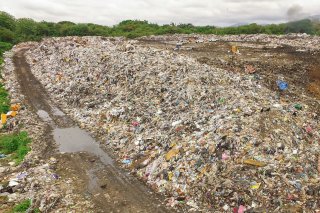
Land, Waste, and Cleanup
- Household Hazardous Waste (HHW)
- Learn About Hazardous Waste
Land, Waste, and Cleanup Topics

- Citizen Science for Environmental Protection
- Climate Change Indicators
- Environmental Measurements and Modeling
- EPA Science Models and Research Tools (SMaRT) Search
- Research at EPA
- Research Grants
More Science Topics

- Drinking Water Basics
- Lakes and Rivers
- Local Water Quality Reports
- National Aquatic Resource Surveys
- Wastewater Treatment
Water Topics

More Environmental Topics
- Climate Change
- Children's Health
- Environmental Justice
- Pesticides
EPA Articles and News Releases
Recent EPA Perspectives Articles:

Acting Upstream for Creek and Community
A common threat to streams is runoff from heavy rains that cause floods, wearing away at riverbanks. Across the country, the Green Infrastructure program works with communities to address the effects of stormwater runoff through a variety of programs.
- Date: March 27, 2024
- By: Jake Krauss

Fifty Years Later
I viscerally remember what it felt like to walk through the dark entrance halls, turn a corner and then stop before the spectacular Giant Ocean Tank. I was able to connect these visits, 50 years apart, in my head and heart, in ways I never had before.
- Date: March 11, 2024
- By: David Cash

From Peace Corps to EPA
Meet some returned Peace Corps Volunteers who now work at EPA.
- Date: March 1, 2024
- By: Clayton Batko
Recent EPA News Releases:
EPA starts lead inspection sweep in the greater Manchester New Hampshire area to prevent childhood lead poisoning
Homes built before 1978 are very likely to contain lead paint
EPA News Release: EPA starts lead inspection sweep in the greater Manchester New Hampshire area to prevent childhood lead poisoning
- Release Date: March 28, 2024
EPA announces $194M to King County to improve wastewater infrastructure resiliency, protect Puget Sound
EPA News Release: EPA announces $194M to King County to improve wastewater infrastructure resiliency, protect Puget Sound
EPA Fines Scrap Metal Facility in Kansas City, Kansas, for Alleged Clean Water Act Violations
EPA News Release: EPA Fines Scrap Metal Facility in Kansas City, Kansas, for Alleged Clean Water Act Violations
EPA announces $12M to protect salmon by reducing toxic tire dust, other pollutants in stormwater
EPA News Release: EPA announces $12M to protect salmon by reducing toxic tire dust, other pollutants in stormwater
- Release Date: March 27, 2024
180 Environmental Research Topics & Questions to Write about
Environment affects us all, whether we want it or not. Political leaders and students alike discuss ways to tackle environmental topics & issues. Some might argue about the role humans play in all this. The fact remains that our environment is a delicate matter. That’s why we must educate ourselves on the issues related to it.
Our specialists will write a custom essay specially for you!
In this article by custom writing experts, you’ll find a list of environmental research questions to scrutinize and write about. The environmental essay topics in the collection below are related to economics, health, sociology, law, and even psychology. These ideas might be helpful either for school or for college students.
- 🔝 Top 10 Topics
- 🌡️🌍 Climate Change Topics
- 🏭🌱 Sustainability
- 🔬🌻 Environmental Science
- 🌳⚖️ Environmental Law
- 🧑🌿 Environmentalism
🔬 Top 10 Environmental Research Topics
- 📖 Environmental Research Questions
🔝 Top 10 Environment Essay Topics
- The life cycle of tornados
- History of environmental studies
- Positive impact of birdwatching
- Drinking water and the environment
- Christianity’s impact on the climate crisis
- Climate’s effect on mountain ecosystems
- How aviation contributes to global warming
- Early commercial adaptation of thermal energy
- What does nuclear meteorology investigate?
- Fruitarianism’s benefits for the environment
🌡️🌍 Environmental Research Topics on Climate Change
Throughout history, the Earth’s climate always fluctuated. Ice ages were followed by warmer periods. However, the increase in temperature we perceive today is unusual. Because of this, climate change is one of today’s most pressing problems. Below we have compiled a list of 25 global warming topics. Have a look!
- What is the difference between climate change and global warming?
- Investigate how humans influence the climate.
- Which regions suffer the most due to the rising sea levels?
- How did the average weather in your region change over the past 20 years?
- Why are coral reefs endangered?
- How do melting glaciers impact the environment?
- Examine what natural disasters are linked to climate change.
- What does ocean acidification mean?
- What are the effects of global warming?
- Analyze the phenomenon of climate refugees.
- How does global warming affect biodiversity?
- Discuss the most significant causes of climate change.
- Why are hurricanes becoming more intense?

- What are the most significant agricultural problems caused by climate change?
- How does the excess of CO2 impact the environment?
- What actions lead to a CO2 increase in the atmosphere?
- Discuss how hydraulic fracturing affects nature.
- Explain how the greenhouse effect works.
- What can each of us do to stop global warming?
- How is ozone depletion related to climate change?
- What was the purpose of the Paris Agreement?
- Investigate how deforestation affects the climate.
- Can we reverse global warming?
- Examine why some people don’t believe in climate change.
- What is the correlation between tree planting and climate change?
🌲 Environmental Research Topics on Ecology
Ecology is a branch of biology that investigates how organisms coexist. The environment shapes the way different species interact with each other. Essential factors can be living, such as nutrition, or nonliving, like water. Here are 25 prompts for your ecology essay:
- Examine the ecological research methods.
- What defines the number of organisms living in a community?
- How does an ecosystem work?
- Why do plants and animals go extinct?
- Do non-native snakes threaten the U.S. ecosystem?
- Explain the elements of population growth.
- What would the world look like without bees?
- How do organisms adapt to their environment?
- Analyze how photosynthesis occurs.
- What different relationships can organisms form with their surroundings?
- Discuss the research methods of bird behavioral ecology.
- How do organisms survive under extreme conditions?
- Why do some birds migrate?

- Investigate why some animals benefit from living alone.
- What can humans do to prevent pandas from extinction?
- How do plants help combat climate change?
- What’s the correlation between water management and ecology issues?
- How does commercial fishing affect the oceans?
- What are the most prominent current environmental threats?
- How does the ecological footprint method work?
- What are the long-term consequences of plastic use?
- Analyze how nutrient cycles work.
- What impact does human waste have on marine ecosystems?
- Examine the different types of healthy bacteria.
- How do cacti grow in the desert?
🏭🌱 Sustainability Topics for an Essay
According to the UN World Commission , sustainable development “meets the needs of the present without compromising the ability of future generations to meet their own needs.” Simply put, sustainability means fulfilling the demand without exhausting any resources. Today, it plays a vital role in protecting the environment.
- Give an example of sustainable practice.
- Analyze the process of recycling.
- Investigate what sustainability wants to achieve.
- Explore the history of the green movement.
- What can a country do to become greener?
- Why do we need the concept of sustainable development?
- Examine the ways of recycling water.
- How can you make food sources more sustainable?
- What does zero-waste mean?
- Talk about the issues related to eco-friendly packaging.
- Discuss ways of saving more energy.
- What are the greener alternatives to plastic?
- Examine the different sources of renewable energy.
- How can a person live more sustainably?
- Explain the three pillars of sustainability.

- How does green construction work?
- What’s the connection between sustainability and climate change?
- What can we do to reduce water pollution?
- Discuss the impact of globalization on sustainable agriculture.
- What is responsible consumption?
- Why should we not use plastic?
- Describe how wind turbines produce electricity.
- How can technology become green?
- What is social sustainability?
- What are the most critical sustainability issues today?
🔬🌻 Environmental Science Topics for an Essay
Environmental science combines various approaches to study nature. In doing so, it tries to find solutions for ecological issues. Research goes into areas such as pollution and alternative energy. If you want to write about it, have a look at our topics:
Just in 1 hour! We will write you a plagiarism-free paper in hardly more than 1 hour
- What are the environmental impacts of production and consumption?
- Examine ways of improving agriculture.
- What are the critical elements of environmental science?
- Discuss the advantages of green engineering.
- What are the different types of pollution?
- Determine the primary goals of environmental science.
- What are invasive species?
- Investigate the benefits of reforestation.
- Describe the Amazon rainforest and its role in the environment.
- Explore the various types of agriculture.
- Discuss the pros and cons of GMOs.
- What effects does a biodiversity loss have on humanity?
- How do dams and channels affect ecosystems?
- What is the connection between social and environmental sciences?
- Why is overpopulation a problem?
- Explain the process of desertification.
- How does mining cause environmental disasters?
- Investigate the Gaia Hypothesis.
- What are the causes of acid rain?
- How is our health affected by pollution?

- Explain the importance of energy efficiency.
- Explore the link between globalization and ecological problems.
- Why are fossil fuels harmful to the environment?
- What are ecological niches?
- Analyze the pros and cons of nuclear energy.
🌳⚖️ Environmental Law Topics for Papers
Environmental law aims to protect nature. It’s the legal foundation of human interaction with their surroundings. Besides, it formulates how we should utilize natural resources. Take a look at these compelling topics for your paper:
- How is waste regulated in your community?
- What laws address contaminant cleanup?
- Why do we need chemical safety regulations?
- Examine legal ways to curb hunting and fishing.
- Describe environmental protection in the US and in the Hawaii state.
- Discuss the Rio Declaration.
- Why can environmental laws be controversial?
- What are the advantages of emission certificates?
- Investigate the process of emissions trading.
- How does your country regulate air quality?
- What makes the laws concerning water quality vital?
- What are the general principles of environmental law?
- When can a piece of land be declared a natural reserve?
- Should there be a binding international environmental constitution?
- Explore the history of environmental law.
- What purposes do wildlife reserves serve?
- Discuss the legacy of Kyoto Protocol.
- Analyze the marine pollution prevention efforts in Australia.
- What are environmental assessment mandates?
- Investigate economic incentives for environmental protection.
- Discuss why ecotourism needs to be regulated.
- Why is it difficult for some countries to become green?
- Establish a connection between free trade agreements and ecological problems.
- Do businesses have to incorporate environmental law?
- Compare several international agreements on ecological issues.
🧑🌿 Environmentalism Topics to Write About
Movements aiming to protect nature are at the core of environmentalism. The idea first gained traction in the 1960s. Notable organizations include PETA and Greenpeace. If you’re interested in environmentalism, consult this topics list:
- Investigate the history of environmentalism.
- Discuss the negative impacts of urban sprawl.
- What is Earth Day?

- Describe the key concepts of environmentalism.
- What are the different types of green movements?
- Compare the goals of various NGOs.
- What does the WWF do?
- Describe the main achievements of nature activists.
- Explain what apocalyptic environmentalism is.
- Who is Greta Thunberg?
- Discuss the impact of the Fridays for Future movement.
- Explain emancipatory environmentalism.
- Investigate the Animal Liberation Front.
- Analyze the central concerns of ecofeminism.
- Why are environmental movements important?
- Who was John Muir?
- Explain what ecoterrorism is.
- Does going green equal saving the environment?
- Who were the first nature activists?
- Discuss the influence of green political parties.
- What is environmental justice?
- Explain how civic environmentalism works.
- Are the actions of Greenpeace always justified?
- What are some examples of good nature activism tactics?
- Analyze the effect environmentalist movements have on politics.
- Types of marine pollution
- Concepts of ecofeminism
- Causes of grassland degradation
- Advantages of hydroelectricity
- Organic farming support in the US
- Energy conservation in the US
- What does photochemical smog depend on?
- Seasonal behavior of urban heat island
- Nuclear and radiation accident categories
- Can baffle spray scrubbers control pollution?
📖 Top 10 Environmental Research Questions
- What are the causes and effects of air pollution?
- What are the most dangerous effects of climate change?
- What are the most severe diseases caused by water pollution?
- Is global warming real?
- How does deforestation affect people and animals?
- Do carbon offset programs work?
- How to prevent and control soil pollution?
- How does plastic pollution affect marine life?
- What are the most threatened biodiversity hotspots?
- What should we do about overpopulation?
We hope this article helped you decide what your paper will be about. If the topic you’ve chosen is still not perfect, feel free to customize it! Good luck, and have fun with your essay.
You might also be interested in:
- A List of 212 Brilliant Research Proposal Topics to Investigate
- 220 Interesting Biology Topics for Essays & Research Papers
- A List of 220 Physics Topics & Questions to Research
- 300 Interesting Chemistry Topics & Writing Tips
- 281 Best Health & Medical Research Topics
🔍 References
- Environmental Issues Guide: Giving Compass
- Climate Change: National Geographic
- Climate Change and Global Warming: NASA
- What Is Ecology?: Khan Academy
- Ecology: Encyclopedia Britannica
- What Is Sustainability and Why Is It Important?: Environmental Science
- Environmentalism: Learning to Give
- Share to Facebook
- Share to Twitter
- Share to LinkedIn
- Share to email

Our code of ethics is derived from what we think is right or wrong. On top of that, we have to agree to the moral standards established by the society we live in. Conventional norms generally label theft, murder, or harassment as bad. However, there are many influences that impact...

A definition explains the meaning of a term or a concept. In a dictionary, you’ll find a definition in a single sentence. A definition paper, however, encompasses several paragraphs. Such an essay, amongst other things, can include personal experience and examples. To write a successful definition paper, you need to...

As simple as it is, the purpose of the descriptive essay is to explain or portray its subject. It can focus on any topic or issue you want to write about. Be sure that any middle school, high school, or college student can manage this type of creative writing assignment!...

Rhetorical analysis essay focuses on assessing the method used for delivering a message. This assignment isn’t about giving an opinion on the topic. The purpose is to analyze how the author presents the argument and whether or not they succeeded. Keep reading to find out more strategies and prompts for...

A narrative essay tells a story about a series of events. At the core of this kind of essay can be a personal experience or a fictional plot. Any story can be a basis for a narrative essay! Narratives can look similar to descriptions. Still, they are different. A descriptive...

Similar to the instructions in a recipe book, process essays convey information in a step-by-step format. In this type of paper, you follow a structured chronological process. You can also call it a how-to essay. A closely related type is a process analysis essay. Here you have to carefully consider...

In a classification essay, you divide the subject into categories. To create these categories, you single out certain attributes of things. You can classify them according to their characteristics, themes, or traits. Sounds complicated? Be sure that any high school or college student can manage this type of essay!

Throughout your high school years, you are likely to write many evaluative papers. In an evaluation essay you aim is to justify your point of view through evidence.

Immigration is a permanent move to a foreign country. It takes place all over the globe, including the United States. It played an important role in history, and it continues to influence society today. This article offers a variety of immigration essay topics. They are suitable for college-level works, as...

Should you buy a green or a red apple? Before making a decision, people often compare their options. In a compare and contrast essay, you analyze the similarities and differences between certain things. In this article, you’ll find interesting and easy compare and contrast essay topics for college, high school...

An opinion essay requires a student to present a point of view on a chosen subject and back it up with substantial evidence. Like in a debate, the writer has to give their opinion and defend it while using scholarly resources. This article will help you find a good opinion...

When you start studying philosophy, you may think it’s boring and has nothing to do with the real world. It couldn’t be further from the truth! The study of philosophy deals with the most exciting and mysterious aspects of reality. It is closely connected with science, psychology, art, and politics....
- Name This field is for validation purposes and should be left unchanged.
- Climate Change
- Policy & Economics
- Biodiversity
- Conservation
Get focused newsletters especially designed to be concise and easy to digest
- ESSENTIAL BRIEFING 3 times weekly
- TOP STORY ROUNDUP Once a week
- MONTHLY OVERVIEW Once a month
- Enter your email *
- Comments This field is for validation purposes and should be left unchanged.
15 Biggest Environmental Problems of 2024
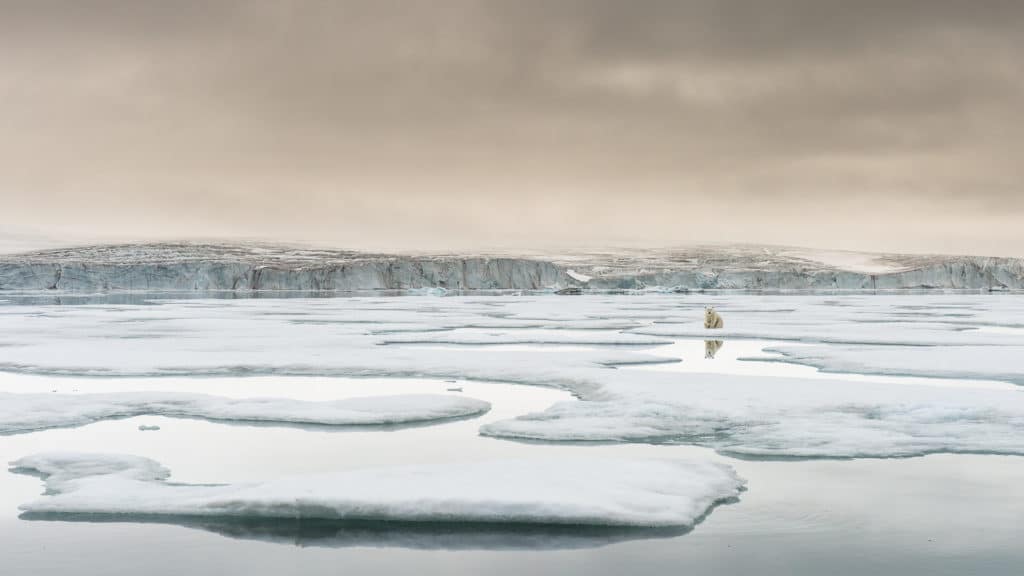
While the climate crisis has many factors that play a role in the exacerbation of the environment, some warrant more attention than others. Here are some of the biggest environmental problems of our lifetime, from deforestation and biodiversity loss to food waste and fast fashion.
1. Global Warming From Fossil Fuels
2023 was the hottest year on record , with global average temperatures at 1.46C above pre-industrial levels and 0.13C higher than the eleven-month average for 2016, currently the warmest calendar year on record. The year was marked by six record-breaking months and two record-breaking seasons.
What’s more, carbon dioxide (CO2) levels have never been so high . After being consistently around 280 parts per million (ppm) for almost 6,000 years of human civilisation, CO2 levels in the atmosphere are now well above 420 ppm, more than double what they were before the onset of the Industrial Revolution in the 19th century. According to National Oceanic and Atmospheric Administration (NOAA) Administrator Rick Spinrad, the steady annual increase is a “direct result of human activity,” mainly from the burning of fossil fuels for transportation and electricity generation but also from cement manufacturing, deforestation , and agriculture .
This is undoubtedly one of the biggest environmental problems of our lifetime: as greenhouse gas emissions blanket the Earth, they trap the sun’s heat, leading to global warming.
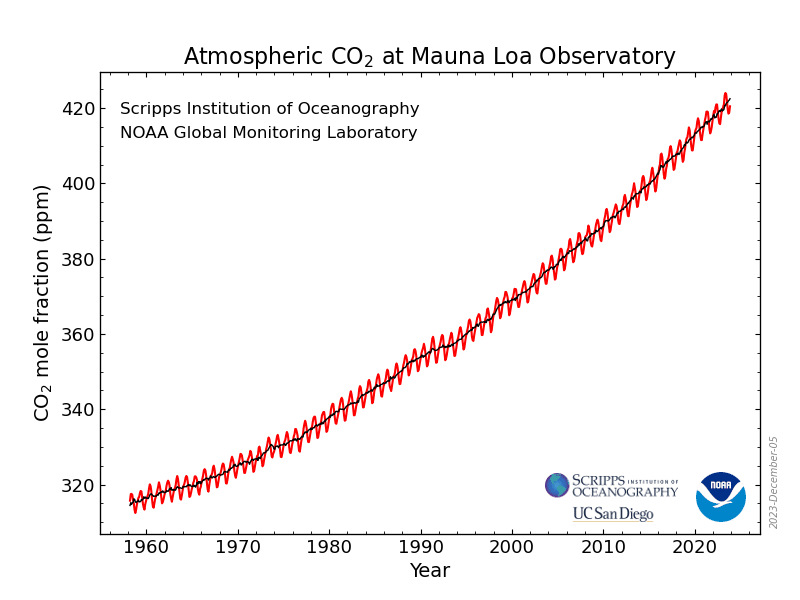
Increased emissions of greenhouse gases have led to a rapid and steady increase in global temperatures, which in turn is causing catastrophic events all over the world – from Australia and the US experiencing some of the most devastating bushfire seasons ever recorded, locusts swarming across parts of Africa, the Middle East and Asia, decimating crops, and a heatwave in Antarctica that saw temperatures rise above 20C for the first time. S cientists are constantly warning that the planet has crossed a series of tipping points that could have catastrophic consequences, such as advancing permafrost melt in Arctic regions, the Greenland ice sheet melting at an unprecedented rate, accelerating sixth mass extinction , and increasing deforestation in the Amazon rainforest , just to name a few.
The climate crisis is causing tropical storms and other weather events such as hurricanes, heatwaves and flooding to be more intense and frequent than seen before. However, even if all greenhouse gas emissions were halted immediately, global temperatures would continue to rise in the coming years. That is why it is absolutely imperative that we start now to drastically reduce greenhouse gas emissions, invest in renewable energy sources, and phase our fossil fuels as fast as possible.
You might also like: The Tipping Points of Climate Change: How Will Our World Change?
2. Poor Governance
According to economists like Nicholas Stern, the climate crisis is a result of multiple market failures .
Economists and environmentalists have urged policymakers for years to increase the price of activities that emit greenhouse gases (one of our biggest environmental problems), the lack of which constitutes the largest market failure, for example through carbon taxes, which will stimulate innovations in low-carbon technologies.
To cut emissions quickly and effectively enough, governments must not only massively increase funding for green innovation to bring down the costs of low-carbon energy sources, but they also need to adopt a range of other policies that address each of the other market failures.
A national carbon tax is currently implemented in 27 countries around the world , including various countries in the EU, Canada, Singapore, Japan, Ukraine and Argentina. However, according to the 2019 OECD Tax Energy Use report, current tax structures are not adequately aligned with the pollution profile of energy sources. For example, the OECD suggests that carbon taxes are not harsh enough on coal production, although it has proved to be effective for the electricity industry. A carbon tax has been effectively implemented in Sweden ; the carbon tax is U$127 per tonne and has reduced emissions by 25% since 1995, while its economy has expanded 75% in the same time period.
Further, organisations such as the United Nations are not fit to deal with the climate crisis: it was assembled to prevent another world war and is not fit for purpose. Anyway, members of the UN are not mandated to comply with any suggestions or recommendations made by the organisation. For example, the Paris Agreement , a historic deal within the United Nations Framework Convention on Climate Change (UNFCCC), says that countries need to reduce greenhouse gas emissions significantly so that global temperature rise is below 2C by 2100, and ideally under 1.5C. But signing on to it is voluntary, and there are no real repercussions for non-compliance. Further, the issue of equity remains a contentious issue whereby developing countries are allowed to emit more in order to develop to the point where they can develop technologies to emit less, and it allows some countries, such as China, to exploit this.
3. Food Waste
A third of the food intended for human consumption – around 1.3 billion tons – is wasted or lost. This is enough to feed 3 billion people. Food waste and loss account for approximately one-quarter of greenhouse gas emissions annually ; if it was a country, food waste would be the third-largest emitter of greenhouse gases, behind China and the US.
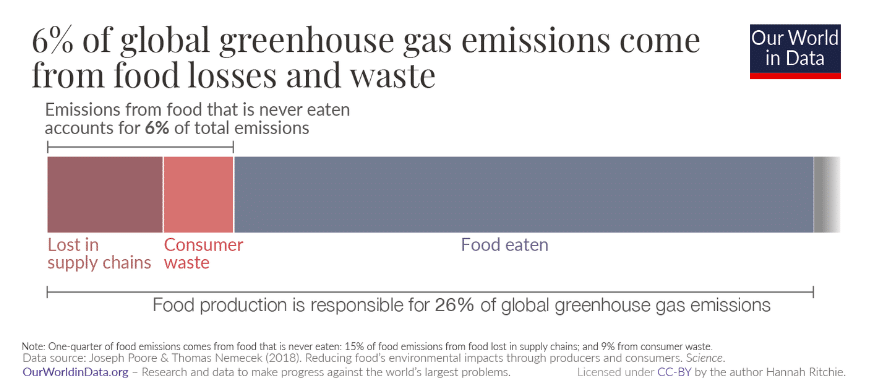
Food waste and loss occurs at different stages in developing and developed countries; in developing countries, 40% of food waste occurs at the post-harvest and processing levels, while in developed countries, 40% of food waste occurs at the retail and consumer levels.
At the retail level, a shocking amount of food is wasted because of aesthetic reasons; in fact, in the US, more than 50% of all produce thrown away in the US is done so because it is deemed to be “too ugly” to be sold to consumers- this amounts to about 60 million tons of fruits and vegetables. This leads to food insecurity , another one of the biggest environmental problems on the list.
You might also like: How Does Food Waste Affect the Environment?
4. Biodiversity Loss
The past 50 years have seen a rapid growth of human consumption, population, global trade and urbanisation, resulting in humanity using more of the Earth’s resources than it can replenish naturally.
A 2020 WWF report found that the population sizes of mammals, fish, birds, reptiles and amphibians have experienced a decline of an average of 68% between 1970 and 2016. The report attributes this biodiversity loss to a variety of factors, but mainly land-use change, particularly the conversion of habitats, like forests, grasslands and mangroves, into agricultural systems. Animals such as pangolins, sharks and seahorses are significantly affected by the illegal wildlife trade, and pangolins are critically endangered because of it.
More broadly, a recent analysis has found that the sixth mass extinction of wildlife on Earth is accelerating. More than 500 species of land animals are on the brink of extinction and are likely to be lost within 20 years; the same number were lost over the whole of the last century. The scientists say that without the human destruction of nature, this rate of loss would have taken thousands of years.
In Antarctica, climate change-triggered melting of sea ice is taking a heavy toll on emperor penguins and could wipe out entire populations by as early as 2100 , according to 2023 research.
You might also like: The Remarkable Benefits of Biodiversity
5. Plastic Pollution
In 1950, the world produced more than 2 million tons of plastic per year . By 2015, this annual production swelled to 419 million tons and exacerbating plastic waste in the environment.

A report by science journal, Nature, determined that currently, roughly 14 million tons of plastic make their way into the oceans every year, harming wildlife habitats and the animals that live in them. The research found that if no action is taken, the plastic crisis will grow to 29 million metric tons per year by 2040. If we include microplastics into this, the cumulative amount of plastic in the ocean could reach 600 million tons by 2040.
Shockingly, National Geographic found that 91% of all plastic that has ever been made is not recycled, representing not only one of the biggest environmental problems of our lifetime, but another massive market failure. Considering that plastic takes 400 years to decompose, it will be many generations until it ceases to exist. There’s no telling what the irreversible effects of plastic pollution will have on the environment in the long run.
You might also like: 8 Shocking Plastic Pollution Statistics to Know About
6. Deforestation
Every hour, forests the size of 300 football fields are cut down. By the year 2030, the planet might have only 10% of its forests; if deforestation isn’t stopped, they could all be gone in less than 100 years.
The three countries experiencing the highest levels of deforestation are Brazil, the Democratic Republic of Congo and Indonesia. The Amazon, the world’s largest rainforest – spanning 6.9 million square kilometres (2.72 million square miles) and covering around 40% of the South American continent – is also one of the most biologically diverse ecosystems and is home to about three million species of plants and animals . Despite efforts to protect forest land, legal deforestation is still rampant, and about one-third of global tropical deforestation occurs in Brazil’s Amazon forest, amounting to 1.5 million hectares each year .
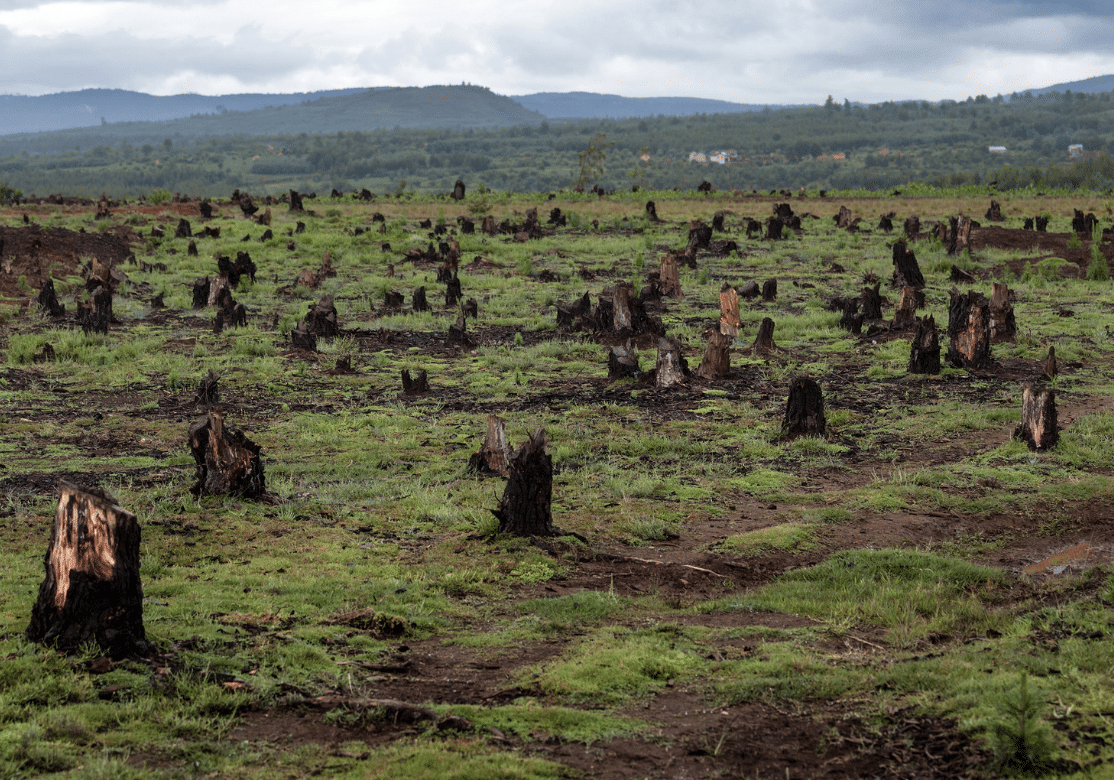
Agriculture is the leading cause of deforestation, another one of the biggest environmental problems appearing on this list. Land is cleared to raise livestock or to plant other crops that are sold, such as sugar cane and palm oil . Besides for carbon sequestration, forests help to prevent soil erosion, because the tree roots bind the soil and prevent it from washing away, which also prevents landslides.
You might also like: 10 Deforestation Facts You Should Know About
7. Air Pollution
One of the biggest environmental problems today is outdoor air pollution .
Data from the World Health Organization (WHO) shows that an estimated 4.2 to 7 million people die from air pollution worldwide every year and that nine out of 10 people breathe air that contains high levels of pollutants. In Africa, 258,000 people died as a result of outdoor air pollution in 2017, up from 164,000 in 1990, according to UNICEF . Causes of air pollution mostly comes from industrial sources and motor vehicles, as well as emissions from burning biomass and poor air quality due to dust storms.
According to a 2023 study, air pollution in South Asia – one of the most polluted areas in the world – cuts life expectancy by about 5 years . The study blames a series of factors, including a lack of adequate infrastructure and funding for the high levels of pollution in some countries. Most countries in Asia and Africa, which together contribute about 92.7% of life years lost globally due to air pollution, lack key air quality standards needed to develop adequate policies. Moreover, just 6.8% and 3.7% of governments in the two continents, respectively, provide their citizens with fully open-air quality data.
In Europe, a recent report by the European Environment Agency (EEA) showed that more than half a million people living in the European Union died from health issues directly linked to toxic pollutants exposure in 2021.
More on the topic: Less Than 1% of Global Land Area Has Safe Air Pollution Levels: Study
8. Melting Ice Caps and Sea Level Rise
The climate crisis is warming the Arctic more than twice as fast as anywhere else on the planet. Today, sea levels are rising more than twice as quickly as they did for most of the 20th century as a result of increasing temperatures on Earth. Seas are now rising an average of 3.2 mm per year globally and they will continue to grow up to about 0.7 metres by the end of this century. In the Arctic, the Greenland Ice Sheet poses the greatest risk for sea levels because melting land ice is the main cause of rising sea levels.
Representing arguably the biggest of the environmental problems, this is made all the more concerning considering that last year’s summer triggered the loss of 60 billion tons of ice from Greenland, enough to raise global sea levels by 2.2mm in just two months . According to satellite data, the Greenland ice sheet lost a record amount of ice in 2019: an average of a million tons per minute throughout the year, one of the biggest environmental problems that has cascading effects. If the entire Greenland ice sheet melts, sea level would rise by six metres .
Meanwhile, the Antarctic continent contributes about 1 millimetre per year to sea level rise, which is one-third of the annual global increase. According to 2023 data, the continent has lost approximately 7.5 trillion tons of ice since 1997 . Additionally, the last fully intact ice shelf in Canada in the Arctic recently collapsed, having lost about 80 square kilometres – or 40% – of its area over a two-day period in late July, according to the Canadian Ice Service .

Sea level rise will have a devastating impact on those living in coastal regions: according to research and advocacy group Climate Central, sea level rise this century could flood coastal areas that are now home to 340 million to 480 million people , forcing them to migrate to safer areas and contributing to overpopulation and strain of resources in the areas they migrate to. Bangkok (Thailand), Ho Chi Minh City (Vietnam), Manila (Philippines), and Dubai (United Arab Emirates) are among the cities most at risk of sea level rise and flooding.
You might also like: Two-Thirds of World’s Glaciers Set to Disappear by 2100 Under Current Global Warming Scenario
9. Ocean Acidification
Global temperature rise has not only affected the surface, but it is the main cause of ocean acidification . Our oceans absorb about 30% of carbon dioxide that is released into the Earth’s atmosphere. As higher concentrations of carbon emissions are released thanks to human activities such as burning fossil fuels as well as effects of global climate change such as increased rates of wildfires, so do the amount of carbon dioxide that is absorbed back into the sea.
The smallest change in the pH scale can have a significant impact on the acidity of the ocean. Ocean acidification has devastating impacts on marine ecosystems and species, its food webs, and provoke irreversible changes in habitat quality . Once pH levels reach too low, marine organisms such as oysters, their shells and skeleton could even start to dissolve.
However, one of the biggest environmental problems from ocean acidification is coral bleaching and subsequent coral reef loss . This is a phenomenon that occurs when rising ocean temperatures disrupt the symbiotic relationship between the reefs and algae that lives within it, driving away the algae and causing coral reefs to lose their natural vibrant colours. Some scientists have estimated coral reefs are at risk of being completely wiped by 2050. Higher acidity in the ocean would obstruct coral reef systems’ ability to rebuild their exoskeletons and recover from these coral bleaching events.
Some studies have also found that ocean acidification can be linked as one of the effects of plastic pollution in the ocean. The accumulating bacteria and microorganisms derived from plastic garbage dumped in the ocean to damage marine ecosystems and contribute towards coral bleaching.
10. Agriculture
Studies have shown that the global food system is responsible for up to one-third of all human-caused greenhouse gas emissions, of which 30% comes from livestock and fisheries. Crop production releases greenhouse gases such as nitrous oxide through the use of fertilisers .
60% of the world’s agricultural area is dedicated to cattle ranching , although it only makes up 24% of global meat consumption.
Agriculture not only covers a vast amount of land, but it also consumes a vast amount of freshwater, another one of the biggest environmental problems on this list. While arable lands and grazing pastures cover one-third of Earth’s land surfaces , they consume three-quarters of the world’s limited freshwater resources.
Scientists and environmentalists have continuously warned that we need to rethink our current food system; switching to a more plant-based diet would dramatically reduce the carbon footprint of the conventional agriculture industry.
You might also like: The Future of Farming: Can We Feed the World Without Destroying It?
11. Food and Water Insecurity
Rising temperatures and unsustainable farming practices have resulted in increasing water and food insecurity.
Globally, more than 68 billion tonnes of top-soil is eroded every year at a rate 100 times faster than it can naturally be replenished. Laden with biocides and fertiliser, the soil ends up in waterways where it contaminates drinking water and protected areas downstream.
Furthermore, exposed and lifeless soil is more vulnerable to wind and water erosion due to lack of root and mycelium systems that hold it together. A key contributor to soil erosion is over-tilling: although it increases productivity in the short-term by mixing in surface nutrients (e.g. fertiliser), tilling is physically destructive to the soil’s structure and in the long-term leads to soil compaction, loss of fertility and surface crust formation that worsens topsoil erosion.
With the global population expected to reach 9 billion people by mid-century, the Food and Agriculture Organization of the United Nations (FAO) projects that global food demand may increase by 70% by 2050 . Around the world, more than 820 million people do not get enough to eat.
The UN secretary-general António Guterres says, “Unless immediate action is taken, it is increasingly clear that there is an impending global food security emergency that could have long term impacts on hundreds of millions of adults and children.” He urged for countries to rethink their food systems and encouraged more sustainable farming practices.
In terms of water security, only 3% of the world’s water is freshwater , and two-thirds of that is tucked away in frozen glaciers or otherwise unavailable for our use. As a result, some 1.1 billion people worldwide lack access to water, and a total of 2.7 billion find water scarce for at least one month of the year. By 2025, two-thirds of the world’s population may face water shortages.
You might also like: Global Food Security: Why It Matters in 2023
12. Fast Fashion and Textile Waste
The global demand for fashion and clothing has risen at an unprecedented rate that the fashion industry now accounts for 10% of global carbon emissions, becoming one of the biggest environmental problems of our time. Fashion alone produces more greenhouse gas emissions than both the aviation and shipping sectors combined , and nearly 20% of global wastewater, or around 93 billion cubic metres from textile dyeing, according to the UN Environment Programme.
What’s more, the world at least generated an estimated 92 million tonnes of textiles waste every year and that number is expected to soar up to 134 million tonnes a year by 2030. Discarded clothing and textile waste, most of which is non-biodegradable, ends up in landfills, while microplastics from clothing materials such as polyester, nylon, polyamide, acrylic and other synthetic materials, is leeched into soil and nearby water sources. Monumental amounts of clothing textile are also dumped in less developed countries as seen with Chile’s Atacama , the driest desert in the world, where at least 39,000 tonnes of textile waste from other nations are left there to rot.
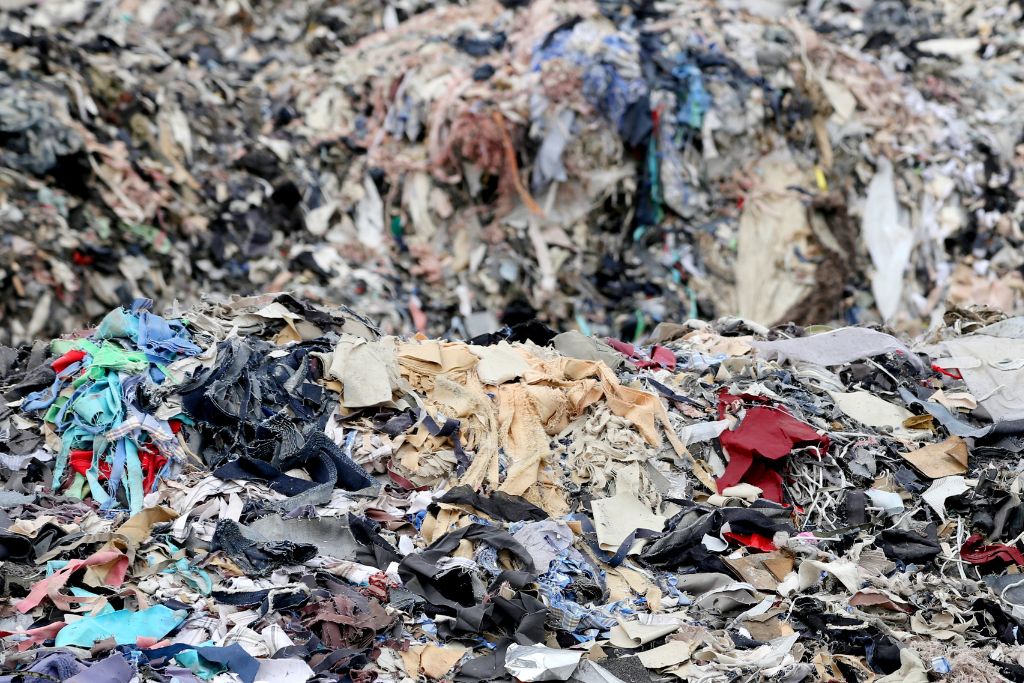
This rapidly growing issue is only exacerbated by the ever-expanding fast fashion business model, in which companies relies on cheap and speedy production of low quality clothing to meet the latest and newest trends. While the United Nations Fashion Industry Charter for Climate Action sees signatory fashion and textile companies to commit to achieving net zero emission by 2050, a majority of businesses around the world have yet to address their roles in climate change.
While these are some of the biggest environmental problems plaguing our planet, there are many more that have not been mentioned, including overfishing, urban sprawl, toxic superfund sites and land use changes. While there are many facets that need to be considered in formulating a response to the crisis, they must be coordinated, practical and far-reaching enough to make enough of a difference.
You might also like: Fast Fashion and Its Environmental Impact
13. Overfishing
Over three billion people around the world rely on fish as their primary source of protein. About 12% of the world relies upon fisheries in some form or another, with 90% of these being small-scale fishermen – think a small crew in a boat, not a ship, using small nets or even rods and reels and lures not too different from the kind you probably use . Of the 18.9 million fishermen in the world, 90% of them fall under the latter category.
Most people consume approximately twice as much food as they did 50 years ago and there are four times as many people on earth as there were at the close of the 1960s. This is one driver of the 30% of commercially fished waters being classified as being ‘overfished’. This means that the stock of available fishing waters is being depleted faster than it can be replaced.
Overfishing comes with detrimental effects on the environment, including increased algae in the water, destruction of fishing communities, ocean littering as well as extremely high rates of biodiversity loss.
As part of the United Nations’ 17 Sustainable Development Goals (SDG 14) , the UN and FAO are working towards maintaining the proportion of fish stocks within biologically sustainable levels. This, however, requires much stricter regulations of the world’s oceans than the ones already in place. In July 2022, the WTO banned fishing subsidies to reduce global overfishing in a historic deal. Indeed, subsidies for fuel, fishing gear, and building new vessels, only incentivise overfishing and represent thus a huge problem.
You might also like: 7 Solutions to Overfishing We Need Right Now
14. Cobalt Mining
Cobalt is quickly becoming the defining example of the mineral conundrum at the heart of the renewable energy transition . As a key component of battery materials that power electric vehicles (EVs), cobalt is facing a sustained surge in demand as decarbonisation efforts progress. The world’s largest cobalt supplier is the Democratic Republic of Congo (DRC), where it is estimated that up to a fifth of the production is produced through artisanal miners.
Cobalt mining , however, is associated with dangerous workers’ exploitation and other serious environmental and social issues. The environmental costs of cobalt mining activities are also substantial. Southern regions of the DRC are not only home to cobalt and copper, but also large amounts of uranium. In mining regions, scientists have made note of high radioactivity levels. In addition, mineral mining, similar to other industrial mining efforts, often produces pollution that leaches into neighbouring rivers and water sources. Dust from pulverised rock is known to cause breathing problems for local communities as well.
15. Soil Degradation
Organic matter is a crucial component of soil as it allows it to absorb carbon from the atmosphere. Plants absorb CO2 from the air naturally and effectively through photosynthesis and part of this carbon is stored in the soil as soil organic carbon (SOC). Healthy soil has a minimum of 3-6% organic matter. However, almost everywhere in the world, the content is much lower than that.
According to the United Nations, about 40% of the planet’s soil is degraded . Soil degradation refers to the loss of organic matter, changes in its structural condition and/or decline in soil fertility and it is often the result of human activities, such as traditional farming practices including the use of toxic chemicals and pollutants. If business as usual continued through 2050, experts project additional degradation of an area almost the size of South America. But there is more to it. If we do not change our reckless practices and step up to preserve soil health, food security for billions of people around the world will be irreversibly compromised, with an estimated 40% less food expected to be produced in 20 years’ time despite the world’s population projected to reach 9.3 billion people.
Featured image by Earth.Org Photographer Roy Mangersnes
This story is funded by readers like you
Our non-profit newsroom provides climate coverage free of charge and advertising. Your one-off or monthly donations play a crucial role in supporting our operations, expanding our reach, and maintaining our editorial independence.
About EO | Mission Statement | Impact & Reach | Write for us

International Day of Forests: 10 Deforestation Facts You Should Know About

13 Major Companies Responsible for Deforestation

Best Places to Live to Avoid Climate Change
Hand-picked stories weekly or monthly. We promise, no spam!
Boost this article By donating us $100, $50 or subscribe to Boosting $10/month – we can get this article and others in front of tens of thousands of specially targeted readers. This targeted Boosting – helps us to reach wider audiences – aiming to convince the unconvinced, to inform the uninformed, to enlighten the dogmatic.
Environmental Ethics Research Paper Topics

This comprehensive guide to environmental ethics research paper topics is designed to provide students and researchers with a wide array of subjects in the field of environmental ethics. The topics are carefully categorized into ten distinct areas, each offering ten unique research themes. This guide also provides expert advice on how to select a topic and how to write a compelling research paper on environmental ethics. Furthermore, it introduces iResearchNet’s professional writing services, which can assist students in crafting custom research papers on any given topic.
100 Environmental Ethics Research Paper Topics
The field of environmental ethics is a vast and diverse area of study that intersects with various disciplines such as philosophy, ecology, and sociology. It explores the moral relationship of human beings to the environment and its non-human contents. Here, we provide a comprehensive list of environmental ethics research paper topics, divided into ten categories, each with ten topics.
Academic Writing, Editing, Proofreading, And Problem Solving Services
Get 10% off with 24start discount code.
Theoretical Foundations of Environmental Ethics
- The role of anthropocentrism in environmental ethics.
- Biocentrism and its implications for environmental conservation.
- Ecocentrism: A holistic approach to environmental ethics.
- Deep ecology versus shallow ecology: A comparative study.
- The concept of intrinsic value in nature.
- The Gaia hypothesis and its ethical implications.
- Ecofeminism: A critical analysis.
- The role of religion in shaping environmental ethics.
- The concept of environmental justice.
- The principle of sustainability in environmental ethics.
Environmental Ethics and Wildlife Conservation
- Ethical considerations in wildlife conservation.
- The moral status of animals in environmental ethics.
- The ethics of hunting: A critical analysis.
- The ethical implications of animal captivity.
- The role of zoos and wildlife parks in conservation: An ethical perspective.
- The ethics of animal experimentation.
- The ethical implications of species extinction.
- The ethics of biodiversity conservation.
- The ethical dimensions of wildlife trade.
- The ethics of animal rights versus conservation needs.
Environmental Ethics and Climate Change
- The ethical implications of climate change.
- The ethics of climate change mitigation strategies.
- The ethical dimensions of climate change adaptation.
- The concept of climate justice.
- The ethics of intergenerational equity in the context of climate change.
- The ethical implications of geoengineering solutions to climate change.
- The ethics of carbon trading.
- The moral responsibility of developed nations in climate change.
- The ethical dimensions of climate change denial.
- The ethics of climate change communication.
Environmental Ethics and Pollution
- The ethical implications of pollution.
- The ethics of plastic pollution.
- The ethical dimensions of air pollution.
- The ethics of water pollution.
- The ethical implications of soil pollution.
- The ethics of noise pollution.
- The ethical dimensions of light pollution.
- The ethics of electronic waste.
- The ethical implications of nuclear pollution.
- The ethics of pollution control measures.
Environmental Ethics and Resource Management
- The ethical implications of resource extraction.
- The ethics of deforestation.
- The ethical dimensions of water management.
- The ethics of land use and land management.
- The ethical implications of overfishing.
- The ethics of agricultural practices.
- The ethical dimensions of mining activities.
- The ethics of waste management.
- The ethical implications of energy production and use.
- The ethics of sustainable resource management.
Environmental Ethics and Technology
- The ethical implications of green technology.
- The ethics of genetic engineering in the context of environmental conservation.
- The ethical dimensions of nanotechnology.
- The ethics of biotechnology in agriculture.
- The ethical implications of geoengineering.
- The ethics of renewable energy technologies.
- The ethical dimensions of information technology and the environment.
- The ethics of technology and waste management.
- The ethical implications of technology in wildlife conservation.
- The ethics of technology in climate change mitigation and adaptation.
Environmental Ethics and Urbanization
- The ethical implications of urbanization.
- The ethics of urban sprawl.
- Theethical dimensions of urban green spaces.
- The ethics of urban planning and design.
- The ethical implications of urban agriculture.
- The ethics of urban waste management.
- The ethical dimensions of urban water management.
- The ethics of urban air quality.
- The ethical implications of urban biodiversity.
- The ethics of sustainable urban development.
Environmental Ethics and Food Production
- The ethical implications of industrial agriculture.
- The ethics of organic farming.
- The ethical dimensions of genetically modified organisms (GMOs).
- The ethics of animal farming and animal rights.
- The ethical implications of aquaculture.
- The ethics of food waste.
- The ethical dimensions of food labeling.
- The ethics of food security and food sovereignty.
- The ethical implications of dietary choices.
- The ethics of sustainable food systems.
Environmental Ethics and Human Health
- The ethical implications of environmental health hazards.
- The ethics of environmental health policies.
- The ethical dimensions of environmental diseases.
- The ethics of health and environmental justice.
- The ethical implications of environmental toxins and human health.
- The ethics of occupational health and safety in environmentally hazardous industries.
- The ethical dimensions of climate change and human health.
- The ethics of health impacts of pollution.
- The ethical implications of the health-environment nexus.
- The ethics of health in the Anthropocene.
Environmental Ethics and Environmental Education
- The ethical implications of environmental education.
- The ethics of environmental literacy.
- The ethical dimensions of environmental awareness campaigns.
- The ethics of environmental activism.
- The ethical implications of environmental values in education.
- The ethics of teaching sustainability.
- The ethical dimensions of environmental justice education.
- The ethics of environmental education in policy-making.
- The ethical implications of youth involvement in environmental issues.
- The ethics of interdisciplinary approaches in environmental education.
In conclusion, the field of environmental ethics offers a rich array of topics for research papers. These topics span a wide range of issues, from theoretical foundations to practical applications, and from local to global scales. They invite us to critically examine our relationship with the environment and to explore new ways of thinking and acting that promote environmental sustainability and justice.
Environmental Ethics Research Guide
Environmental ethics plays a critical role in our understanding of environmental issues and the development of sustainable solutions. As students studying environmental science, it is essential to delve into the realm of environmental ethics and explore its significance in shaping our relationship with the natural world. This page aims to provide a comprehensive guide on environmental ethics research paper topics, helping you navigate the complexities of ethical considerations in environmental decision-making.
In today’s world, environmental challenges are more pressing than ever before. From climate change and deforestation to pollution and resource depletion, our planet faces numerous threats that require urgent attention. However, addressing these issues goes beyond scientific and technical solutions. It requires an ethical framework that guides our choices and actions, taking into account the moral and philosophical dimensions of environmental problems.
The field of environmental ethics explores the moral values and principles that inform our relationship with nature, the rights of non-human beings, and the responsibilities we hold towards future generations. By examining different ethical theories and perspectives, we gain insights into the ethical dilemmas surrounding environmental issues and can develop informed and ethical solutions.
This page serves as a valuable resource for students like you who are tasked with writing a research paper on environmental ethics. Whether you are new to the field or seeking inspiration for your next paper, the following sections will provide a wealth of information, guidance, and topic ideas to help you embark on a successful research journey.
Throughout this page, we will explore various aspects of environmental ethics, including different ethical frameworks, the concept of environmental justice, the ethics of sustainability, and the ethical considerations associated with specific environmental challenges. By delving into these environmental ethics research paper topics, you will develop a deeper understanding of the ethical dimensions of environmental science and be better equipped to critically analyze and contribute to the ongoing discourse in the field.
It is important to note that environmental ethics is a dynamic field with evolving perspectives and ongoing debates. As you navigate through the research paper topics and expert advice provided on this page, keep in mind that the goal is not to arrive at definitive answers but to foster critical thinking, engage in ethical deliberation, and contribute to the growing body of knowledge in environmental ethics.
Choosing an Environmental Ethics Topic
Choosing a compelling and relevant research topic is essential for crafting a successful environmental ethics research paper. With the wide range of issues and perspectives within the field, it can be overwhelming to narrow down your focus. To help you navigate this process, we have compiled ten expert tips to guide you in choosing environmental ethics research paper topics that are engaging, thought-provoking, and academically valuable.
- Identify your area of interest : Begin by reflecting on your personal interests and passions within the field of environmental ethics. Consider the ethical dimensions of specific environmental issues that resonate with you. This will help you stay motivated and engaged throughout your research and writing process.
- Explore current debates and controversies : Stay updated on current debates and controversies in environmental ethics. Scan recent literature, academic journals, and reputable online sources to identify topics that are generating significant discussion. Engaging with these debates can provide a fresh perspective and contribute to the ongoing discourse in the field.
- Conduct preliminary research : Before finalizing a topic, conduct preliminary research to ensure that there is sufficient information and scholarly resources available. Explore academic databases, books, and reputable websites to gauge the availability of relevant literature and sources for your chosen topic.
- Consider interdisciplinary approaches : Environmental ethics is a multidisciplinary field that intersects with various disciplines, including philosophy, sociology, ecology, law, and economics. Consider incorporating interdisciplinary perspectives into your research topic to provide a comprehensive analysis and broaden the scope of your paper.
- Narrow down your focus : Once you have identified a general area of interest, narrow down your focus by refining your research question. Clearly define the specific aspect of environmental ethics you wish to explore and formulate a concise and focused research question that guides your investigation.
- Consult with your instructor or advisor : Seek guidance from your instructor or advisor to ensure that your chosen topic aligns with the objectives and requirements of your research paper. They can provide valuable insights and help you refine your topic based on their expertise.
- Consider the practical implications : Environmental ethics research often addresses real-world challenges and policy implications. Consider topics that have practical relevance and examine the ethical considerations associated with proposed solutions or policy frameworks.
- Engage with diverse perspectives : Environmental ethics is a field characterized by diverse perspectives and theories. Choose a topic that allows you to explore different ethical frameworks, cultural perspectives, and stakeholder viewpoints. This will help you develop a well-rounded understanding of the topic and foster critical thinking.
- Identify gaps in the literature : Conduct a literature review to identify gaps or areas that have not been extensively explored within the realm of environmental ethics. Select a topic that fills these gaps and contributes to the existing knowledge base. This will enable you to make a unique and valuable contribution to the field.
- Reflect on personal and societal relevance : Finally, consider the personal and societal relevance of your chosen topic. Reflect on how it connects with broader environmental concerns, social justice issues, and the well-being of communities and ecosystems. Choosing a topic that resonates with these broader contexts will make your research more impactful and meaningful.
By following these expert tips, you can confidently select an environmental ethics research paper topic that aligns with your interests, engages with relevant debates, and contributes to the ongoing discourse in the field. Remember to remain open-minded, adaptable, and willing to refine your topic as you delve deeper into the research process.
How to Write an Environmental Ethics Research Paper
Writing an environmental ethics research paper requires careful planning, critical thinking, and effective communication of your ideas. Whether you are exploring ethical dimensions of climate change, biodiversity conservation, or environmental justice, the following ten tips will guide you in crafting a compelling and well-structured research paper in the field of environmental ethics.
- Understand the scope and purpose : Familiarize yourself with the scope and purpose of environmental ethics as a discipline. Gain a comprehensive understanding of the key concepts, theories, and ethical frameworks that underpin the field. This will provide a solid foundation for your research and analysis.
- Develop a clear research question : Formulate a clear and concise research question that addresses the ethical dimensions of your chosen environmental issue. The research question should be specific, focused, and provide a framework for your investigation.
- Conduct a thorough literature review : Begin by conducting a comprehensive literature review to understand the existing body of knowledge on your research topic. Explore relevant scholarly articles, books, and academic journals to gain insights into the different perspectives, debates, and theoretical frameworks within the field of environmental ethics.
- Analyze and evaluate different ethical theories : Environmental ethics encompasses a wide range of ethical theories, including anthropocentrism, biocentrism, and ecocentrism. Analyze and evaluate these theories in the context of your research question. Consider their strengths, weaknesses, and applicability to the environmental issue you are examining.
- Collect and analyze empirical data : Depending on the nature of your research, collect and analyze empirical data to support your arguments. This may involve conducting surveys, interviews, or case studies to gather firsthand information. Analyze the data using appropriate statistical or qualitative methods to derive meaningful insights.
- Consider stakeholder perspectives : Environmental ethics often involves considering the perspectives of different stakeholders, including communities, policymakers, industry representatives, and environmental organizations. Engage with these diverse viewpoints to gain a holistic understanding of the ethical challenges and potential solutions related to your research topic.
- Address counterarguments : Anticipate and address counterarguments to your research findings or ethical positions. Engage with opposing viewpoints and demonstrate a nuanced understanding of the complexities surrounding your chosen environmental issue. This will strengthen your argument and showcase your ability to critically evaluate multiple perspectives.
- Organize your paper effectively : Structure your research paper in a logical and organized manner. Begin with an introduction that provides background information, states the research question, and outlines the significance of your study. Use clear headings and subheadings to organize your content, and ensure a smooth flow between sections.
- Support your arguments with evidence : Back up your arguments and claims with credible evidence and scholarly sources. Use a combination of empirical data, case studies, and theoretical frameworks to support your analysis. Properly cite all your sources following the appropriate citation style (e.g., APA, MLA, Chicago).
- Conclude with a strong summary and reflection : In your conclusion, summarize the key findings of your research and restate the importance of your research question. Reflect on the implications of your study for environmental ethics, policy, or practice. Highlight the broader significance of your research and suggest avenues for future research.
By following these ten tips, you will be well-equipped to write an impactful environmental ethics research paper. Remember to maintain a critical and ethical stance throughout your writing, engage with the complexities of the environmental issues at hand, and make connections between theory and practice.
Custom Research Paper Writing Services
When it comes to writing a comprehensive and well-researched environmental ethics research paper, you may encounter challenges along the way. If you find yourself in need of expert assistance, iResearchNet is here to help. Our writing services provide a range of benefits and features that can support you in crafting a high-quality and customized research paper on environmental ethics. Here are thirteen features that set our services apart:
- Expert degree-holding writers : Our team consists of expert writers with advanced degrees in environmental science and related fields. They possess in-depth knowledge and expertise in environmental ethics and are well-equipped to tackle complex research topics.
- Custom written works : We understand the importance of originality and tailor each research paper according to your unique requirements and instructions. Our writers conduct thorough research and develop custom-written works that address your specific research question and objectives.
- In-depth research : Our writers are skilled researchers who delve deep into the literature and conduct extensive research to ensure that your paper is well-informed and backed by credible sources. They stay updated with the latest developments in environmental ethics to provide current and relevant insights.
- Custom formatting : We offer custom formatting options to align your research paper with the required citation style, whether it’s APA, MLA, Chicago, Turabian, or Harvard. Our writers are proficient in various citation styles and ensure accurate and consistent formatting throughout your paper.
- Top quality : Quality is our utmost priority. We adhere to rigorous quality control measures to deliver research papers of the highest standard. Our writers follow a systematic approach to ensure that every aspect of your paper meets the highest quality benchmarks.
- Customized solutions : We understand that every research paper is unique, and we tailor our services to meet your specific needs. Whether you require assistance with topic selection, literature review, methodology, or analysis, we provide customized solutions that address your research requirements.
- Flexible pricing : We offer competitive and flexible pricing options to accommodate students with varying budgets. Our pricing structure is transparent, and we strive to provide affordable services without compromising on quality.
- Short deadlines : We recognize the importance of meeting deadlines. If you have a tight schedule and need your research paper urgently, our writers can work efficiently to deliver within short time frames, even as little as 3 hours.
- Timely delivery : We value punctuality and understand the significance of submitting your research paper on time. Our writers work diligently to ensure that your paper is delivered within the agreed-upon deadline, allowing you sufficient time for review and revisions.
- 24/7 support : Our customer support team is available 24/7 to address any queries or concerns you may have. Whether you need assistance with placing an order, communicating with your writer, or tracking the progress of your paper, our support team is ready to assist you at any time.
- Absolute privacy : We prioritize the confidentiality and privacy of our clients. Your personal information and order details are treated with the utmost confidentiality, and we have robust security measures in place to ensure the protection of your data.
- Easy order tracking : Our user-friendly platform allows you to easily track the progress of your order. You can stay updated on the status of your research paper, communicate with your writer, and upload additional materials or instructions as needed.
- Money-back guarantee : We are committed to customer satisfaction, and we offer a money-back guarantee to provide you with peace of mind. If you are not satisfied with the final research paper, we will work to resolve any issues or provide a refund, ensuring your satisfaction.
At iResearchNet, we are dedicated to supporting students in their academic journey by offering top-notch writing services for environmental ethics research papers. Our team of expert writers, customized solutions, and commitment to quality and customer satisfaction make us a reliable choice for your research paper needs. Place your order today and let us assist you in achieving your academic goals.
Unlock Your Academic Potential with Our Services
Are you ready to excel in your environmental science studies and make a meaningful contribution to the field of environmental ethics? Don’t let the challenges of writing a research paper hold you back. At iResearchNet, we offer comprehensive writing services that can empower you to produce a stellar environmental ethics research paper. With our expert writers, customized solutions, and commitment to quality, we are here to support you every step of the way.
Maximize your research paper’s impact and showcase your understanding of environmental ethics with the assistance of our expert team. Our services go beyond just writing – we provide in-depth research, customized solutions, and adherence to academic standards to ensure your paper stands out. Let us help you unlock your academic potential and make a positive difference in the field of environmental science.
Ready to take the next step in your academic journey? Place your order today and experience the benefits of our writing services. Our expert degree-holding writers, in-depth research, custom formatting, and top-quality papers are just a few clicks away. Don’t let time constraints or complex topics hinder your progress. With our flexible pricing, short deadlines, and 24/7 support, you can confidently order a custom environmental ethics research paper tailored to your requirements.
ORDER HIGH QUALITY CUSTOM PAPER

Read our research on: Abortion | Podcasts | Election 2024
Regions & Countries
3. local impact of climate change, environmental problems.
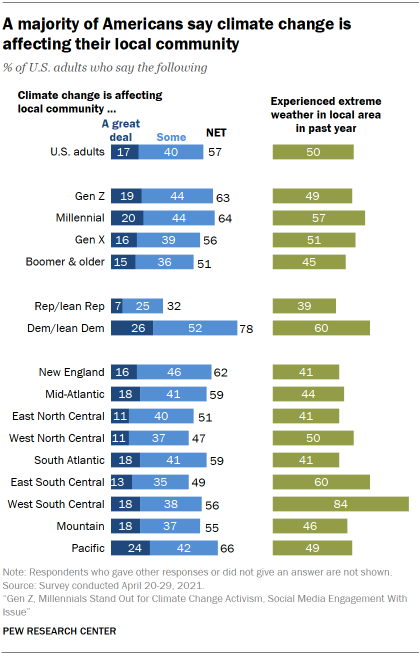
A majority of Americans say climate change is having at least some impact on their local community, and half say their area has experienced extreme weather over the past year, particularly those living in South Central states such as Texas and Alabama. On a related policy question, a large majority of Americans favor the idea of revising building standards so new construction can better withstand extreme weather events.
At the local level, experience with environmental problems – such as air and water pollution – varies across groups. Black and Hispanic adults are particularly likely to say they experience environmental problems in their local community, as are those with lower family incomes.
And when it comes to climate policy considerations, large majorities of Black and Hispanic adults – across income levels – say it’s very important to ensure that lower-income communities benefit from proposals aimed at reducing the effects of climate change.
More than half of U.S. adults say they have seen at least some local effects of climate change
Overall, 57% of U.S. adults say climate change is affecting their own community either a great deal (17%) or some (40%). Smaller shares say climate change is affecting their community not too much (27%) or not at all (15%).
Most Americans, including a majority of Republicans, say human activity plays at least some role in climate change
Most Americans (77%) say human activity contributes either a great deal (44%) or some (33%) to global climate change. Far fewer (22%) say human activities such as the burning of fossil fuels contribute not too much or not at all to climate change.
Republicans continue to be less likely to believe that human activity plays at least some part in global climate change. Still, 59% of this group says human activity contributes at least some, while 40% say human activity has not too much of a role or no role in climate change.
Democrats across generations are in broad agreement that human activity has at least some effect on climate change. Among Republicans, Gen Zers and Millennials are more likely than Gen X and Baby Boomer and older adults to see human activity as playing a role in global climate change. See the Appendix for details.
The overall share of Americans who say their area is affected a great deal by climate change is down 7 percentage points, from 24% a year ago to 17% today.
Americans’ beliefs about local impact of climate change are more closely linked to their partisanship than to where they live. Perceptions of local climate impact vary modestly across census regions. The regions that are relatively likely to say climate change is impacting their communities, such as New England and the Pacific, tend to be places that lean Democratic in their political affiliation. There are also modest differences by generation in beliefs about its local impact.
A separate question in the survey finds that half of Americans say their local area experienced an extreme weather event in the past 12 months.
A large majority (84%) in the West South Central region say they have experienced extreme weather in the last 12 months. The region was impacted by a severe winter storm in February that led to a power crisis in Texas. In contrast to the overall partisan differences seen on this question, comparable majorities of Republicans and Democrats in the West South Central region report their communities have experienced extreme weather in the past year.
Wide public support for revised building standards to protect against extreme weather
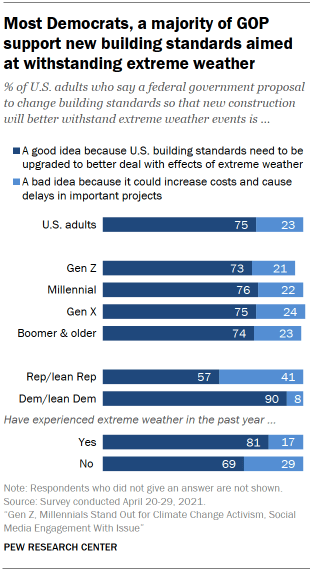
Climate change is thought to be a key factor in the occurrence of more frequent and intense or extreme weather events. When asked about a federal government proposal to change building standards so that new construction will better withstand extreme weather events, 75% of U.S. adults responded in favor of this proposal, while 23% said it is a bad idea because it could increase costs and cause delays in important projects.
There is near consensus among Democrats and Democratic-leaning independents (90%) that revising building standards so construction better withstands extreme weather is a good idea. A 57% majority of Republicans and GOP leaners agree, although support is considerably higher among moderate and liberal Republicans (71%) than conservative Republicans (50%).
People who report direct experience with extreme weather in the past year are particularly likely to consider this a good idea (81% vs. 69% of those who do not report recent experience with extreme weather).
Black, Hispanic and lower-income adults more likely to report living in areas with big problems when it comes to air pollution, other environmental concerns
Overall, about six-in-ten Americans say they see at least moderate problems where they live when it comes to an excess of garbage (62%) and water pollution in lakes, rivers and streams (60%). About half (52%) say the same about local air pollution, and about four-in-ten say safe drinking water (41%) or a lack of greenspace (39%) are at least moderate problems.
Past research has found that Black, Hispanic and Asian American communities are more likely to be exposed to air pollution and other environmental hazards in their local area.
The Center survey finds Black and Hispanic adults particularly likely to say their local communities are having problems across this set of five environmental issues, and they stand out for the large share who consider these to be “big problems” where they live. About four-in-ten Black (41%) and Hispanic (37%) adults say the amount of garbage, waste and landfills in their community is a big problem. Black and Hispanic adults are also more likely than White adults to report that their community has big problems with air and water pollution, drinking water safety and a lack of greenspace and parks. A majority of Black (57%) and about half of Hispanic adults (53%) consider at least one of these five issues a big problem in their local area.
Lower-income Americans are also more likely to report that their area has big problems with these environmental issues. For example, about three-in-ten lower-income adults say their local community has a big problem with air pollution. About half as many upper-income adults (16%) say the same about their community. Half of those with lower family incomes say their local communities are having a big problem with at least one of these five environmental issues.
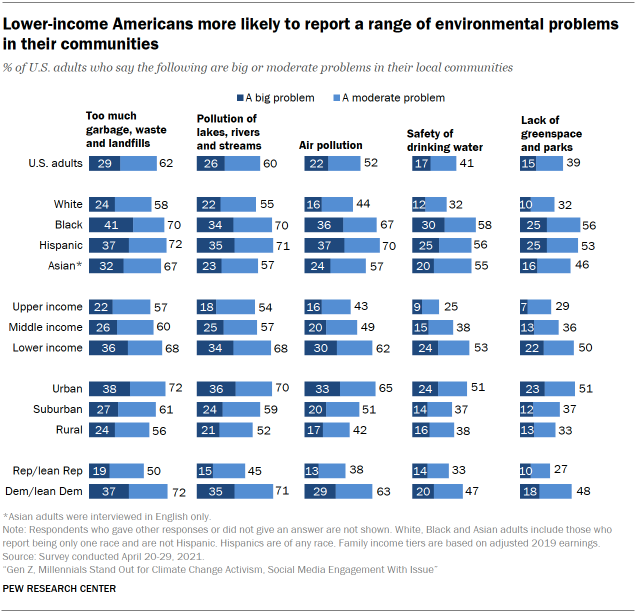
The Biden administration has brought a new focus to environmental justice concerns underlying climate and energy policy. Biden has called for $1.4 billion in his recent budget proposal for initiatives aimed at helping communities address racial, ethnic and income inequalities in pollution and other environmental hazards.
As Americans think about proposals to address climate change, Black (68%) and Hispanic adults (55%) stand out for the high shares who say it is very important to them that such proposals help lower-income communities.
More than half of lower-income Americans (54%) say this is very important to them, compared with 36% of upper-income adults.
Middle- and upper-income Black adults (70%) are about as likely as lower-income Black adults (66%) to say this is very important to them, however. Similarly, there are no differences on this question between middle/upper income Hispanic adults and those with lower incomes (54% vs. 57%, respectively).
A majority of Democrats and independents who lean toward the Democratic Party (59%) say it is very important to them that climate change proposals help lower-income communities; far fewer Republicans and Republican leaners (27%) say this.
Older Americans are more likely to say they regularly try to live in ways that help the environment
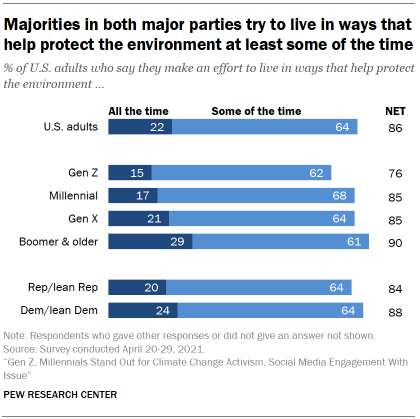
A large majority of Americans (86%) say they try to live in ways that help protect the environment all the time (22%) or some of the time (64%). Just 14% say they never or rarely make such an effort. These findings are largely unchanged since the question was last asked in October 2019 .
In contrast to views and behaviors related to climate change, Baby Boomer and older adults are more likely than those in younger generations to say they try to live in environmentally conscious ways all the time (29%, vs. 21% in Gen X, 16% of Millennials and 15% in Gen Z).
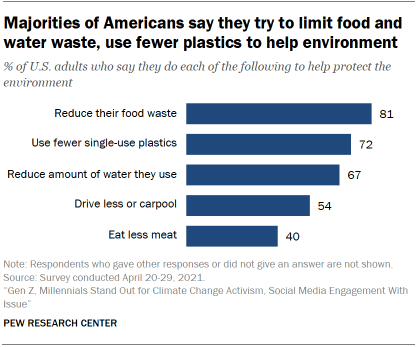
And, unlike views on many policy issues related to the environment, similar shares of Democrats (88%) and Republicans (84%) say they make an effort to do this at least some of the time.
Majorities of U.S. adults say they take some everyday actions in order to help protect the environment, including reducing their food waste (81%), using fewer plastics that cannot be reused such as plastic bags, straws or cups (72%) or reducing the amount of water they use (67%). More than half of Americans (54%) say they drive less or carpool to help the environment, and 40% say they eat less meat.
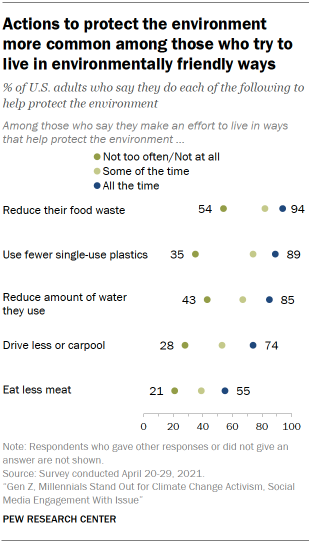
About one-in-five adults (18%) say they do all five of these activities to help the environment, a similar share to when these questions were last asked in October 2019. On average, Americans do 3.3 of these activities.
People who say they try to be environmentally conscious all the time are much more likely to say they are doing specific things to protect the environment. For instance, a large majority (89%) of people who make an effort to live in ways that help protect the environment all the time say they use fewer single-use plastics such as bags and straws in order to protect the environment. This compares with 35% of those who say they do not or don’t often make an effort to protect the environment.
Facts are more important than ever
In times of uncertainty, good decisions demand good data. Please support our research with a financial contribution.
Report Materials
Table of contents, assessing the effects of generation using age-period-cohort analysis, how pew research center will report on generations moving forward, 5 things to keep in mind when you hear about gen z, millennials, boomers and other generations, millennials overtake baby boomers as america’s largest generation, defining generations: where millennials end and generation z begins, most popular.
About Pew Research Center Pew Research Center is a nonpartisan fact tank that informs the public about the issues, attitudes and trends shaping the world. It conducts public opinion polling, demographic research, media content analysis and other empirical social science research. Pew Research Center does not take policy positions. It is a subsidiary of The Pew Charitable Trusts .
Open waste burning linked to air pollution in Northwestern Greenland
A case study on the effects of open waste burning on air quality in Northwestern Greenland calls attention to the importance of no-one-left-behind sustainable air quality monitoring in the Arctic region.
To better understand the air quality risks faced by remote Arctic communities, an international team monitored aerial pollutants at a community in Northwestern Greenland. Their findings, published in Atmospheric Science Letters , reveal that open waste burning elevates the concern of health risks to the community.
The study focused on Qaanaaq, a small village in Northwestern Greenland with a population of approximately 600. During the summer of 2022, the team conducted the first-time measurement of particulate matter (PM 2.5 ) in the ambient air there and identified an increase in PM 2.5 pollution. PM 2.5 refers to tiny particles with a diameter of 2.5 micrometers or less, such as dust and smoke.
PM 2.5 pollution is closely linked with severe air pollution and is particularly harmful to human health; PM 2.5 exposures are correlated with a spectrum of health problems, including respiratory ailments such as asthma and bronchitis, cardiovascular diseases, and even premature death.
Monitoring PM 2.5 levels is important for assessing air quality and protecting public health. However, compared to the mid-latitudes, the PM 2.5 observations in high-latitude regions are relatively left behind (i.e., fewer PM 2.5 observations) in terms of the SDG's mission statement.
The research team, which included researchers from Hokkaido University, the University of Tsukuba, Nagoya University, and NASA, and was led by Associate Professor & Distinguished Researcher Teppei J. Yasunari at the Arctic Research Center, used commercially available advanced PM 2.5 measurement systems for cold regions, which was updated from their previous research, to collect continuous PM 2.5 data spanning the period from July 20 to August 13, 2022. Their analysis uncovered multiple instances of heightened PM 2.5 levels, particularly notable from August 8 onwards. These increases were attributed to local open waste burning activities, as evidenced by the visible black smoke emitted from the Qaanaaq dump site on the same day with combined data analyses using NASA's re-analysis data and NOAA's HYSPLIT model online simulations.
Although further investigation indicated that pollutants originating from sources outside of the study area may have also contributed some during the early stages of the study, the analyses indicated these contributions were minimal, highlighting the significant impact of local pollution sources on air quality in Qaanaaq. The hourly mean PM 2.5 concentrations did not reach alarming levels during the measurement period. However, additional analysis based on the NOAA HYSPLIT online dispersion simulations also implied that there were likely particulate matter depositions from the open waste burning to the nearby sea areas, including Baffin Bay, suggesting important research targets in environmental science in the future.
"This is the first time we've studied PM 2.5 in a small Arctic residential area of Northwestern Greenland where we didn't know the air quality before. We found out how much pollution increases with PM 2.5 during local open waste burning," Yasunari said. "Now, Qaanaaq uses an incinerator, stopping open waste burning. But, continuous air quality monitoring is crucial because pollution doesn't choose timing or stop at borders." He emphasizes the need for healthy air for everyone, Arctic residents included, underlining continuous monitoring as essential for long-term health, in line with the SDGs.
- Air Quality
- Environmental Science
- Air Pollution
- Environmental Issues
- Earth Science
- Environmental Awareness
- Air pollution
- Air conditioning
- Global warming
- Seasonal affective disorder
- Surface weather analysis
Story Source:
Materials provided by Hokkaido University . Note: Content may be edited for style and length.
Journal Reference :
- Teppei J. Yasunari, Tomoki Kajikawa, Yutaka Matsumi, Kyu‐Myong Kim. Increased atmospheric PM2.5 events due to open waste burning in Qaanaaq, Greenland, summer of 2022 . Atmospheric Science Letters , 2024; DOI: 10.1002/asl.1231
Cite This Page :
Explore More
- Heart Disease Risk: More Than One Drink a Day
- Unlocking Supernova Stardust Secrets
- Why Do Some Memories Become Longterm?
- What Controls Sun's Differential Rotation?
- Robot, Can You Say 'Cheese'?
- Researchers Turn Back the Clock On Cancer Cells
- Making Long-Term Memories: Nerve-Cell Damage
- A Solar Cell You Can Bend and Soak in Water
- 'Cosmic Cannibals': Fast-Moving Jets in Space
- Risk Factors for Faster Brain Aging
Trending Topics
Strange & offbeat.
Thank you for visiting nature.com. You are using a browser version with limited support for CSS. To obtain the best experience, we recommend you use a more up to date browser (or turn off compatibility mode in Internet Explorer). In the meantime, to ensure continued support, we are displaying the site without styles and JavaScript.
- View all journals
- Explore content
- About the journal
- Publish with us
- Sign up for alerts
Articles in 2023
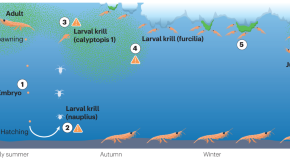
Climate change impacts on Antarctic krill behaviour and population dynamics
Krill are food sources for megafauna, are drivers of carbon export and are being impacted by sea-ice declines and changing climate conditions. This Review examines changes in krill populations, habitats and behaviour in the Southern Ocean, and discusses their potential drivers and implications for fishery management in the future.
- So Kawaguchi
- Angus Atkinson
- Devi Veytia
Publisher Correction: Non-perennial segments in river networks
- Thibault Datry
- Andrew J. Boulton
- Klement Tockner

Towards scientific forecasting of magmatic eruptions
Volcanic eruptions are major natural hazards, but forecasting their activity remains challenging. This Review discusses scientific and monitoring approaches used to forecast magmatic eruptions.
- Valerio Acocella
- Maurizio Ripepe
- Erouscilla Joseph
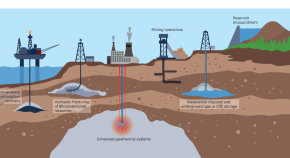
The physical mechanisms of induced earthquakes
Induced earthquakes can occur during several industrial activities, including geothermal developments and underground storage. This Review discusses the current physics-based understanding of induced earthquakes and the implications for forecasting, monitoring, seismic hazard and risk assessments and mitigation strategies.
- Mohammad J. A. Moein
- Cornelius Langenbruch
- Serge Shapiro

Disaster risk communication requires dissemination, dialogue and participation
Disaster risk communication traditionally focuses on authorities conveying hazard and risk information to at-risk populations, with little consideration of local community knowledge. To enable risk reduction and resilience, disaster management must forge partnerships with local communities and empower citizen-led initiatives.
- I. S. Stewart
- E. Yahya Menteşe
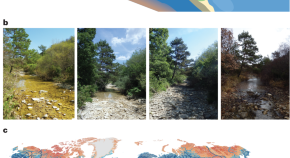
Non-perennial segments in river networks
Non-perennial segments of rivers undergo cycles of flowing, non-flowing and dry phases, influencing ecosystem dynamics and services across the river network. This Review describes the occurrence, ecology and future of these intermittent and ephemeral flows and highlights the importance of protecting these segments.
Controversies of carbon dioxide removal
Various methods of carbon dioxide removal (CDR) are being pursued in response to the climate crisis, but they are mostly not proven at scale. Climate experts are divided over whether CDR is a necessary requirement or a dangerous distraction from limiting emissions. In this Viewpoint, six experts offer their views on the CDR debate.
- Kevin Anderson
- Holly Jean Buck

Climate change impacts on crop yields
Warmer temperatures, increased CO 2 concentrations and changing water availability affect cereal crop production. This Review examines changes in crop yield in response to these variables and discusses adaptation strategies.
- Ehsan Eyshi Rezaei
- Heidi Webber
- Dilys Sefakor MacCarthy
Publisher Correction: Evidence and attribution of the enhanced land carbon sink
- Sophie Ruehr
- Trevor F. Keenan
- César Terrer
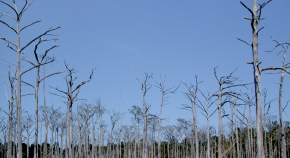
Ghost forests stand apart
An article in Soil & Environmental Health finds ghost forests are distinct from freshwater forested wetlands and salt marshes.
- Laura Zinke
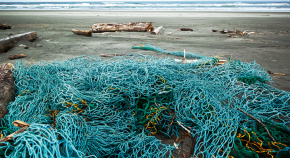
Mitigating ghost fishing
An article in Marine Policy assessed the abundance and causes of discarded fishing gear in Kerala, India, to help inform fishing debris management practices.
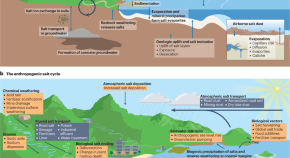
The anthropogenic salt cycle
Widespread use of salts in food, construction, road deicing and industry is driving salinization of water, soil and air. This Review describes the anthropogenic salt cycle, compares it with natural processes and examines its environmental consequences.
- Sujay S. Kaushal
- Gene E. Likens
- Megan A. Rippy
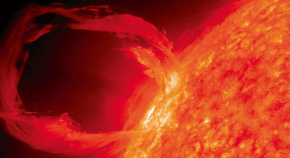
Halloween-like solar storm impacts
An article in Space Weather estimates that an event like the Halloween solar storm of 2003 could cause large economic losses in the aviation sector if it occurred in the present day.
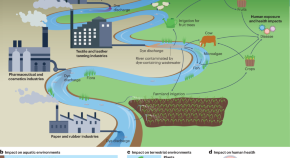
Environmental impacts and remediation of dye-containing wastewater
Wastewater dyes from textile, food and pharmaceutical industries are a major environmental concern. This Review discusses the environmental impacts of dye-containing wastewater and explores both conventional and emerging remediation strategies.
- Jiuyang Lin
- Bart Van der Bruggen
Author Correction: Irrigation in the Earth system
- Sonali McDermid
- Mallika Nocco
- Tokuta Yokohata
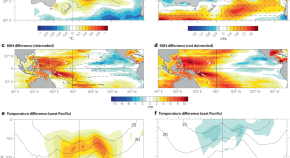
Mechanisms of tropical Pacific decadal variability
Several mechanisms have been put forward to explain tropical Pacific decadal variability, the contributions of which are debated. This Review outlines the different drivers of tropical Pacific decadal variability, summarizing that tropical pycnocline adjustment to wind forcing and Rossby wave activity is likely the dominant mechanism, albeit with uncertainty.
- Antonietta Capotondi
- Shayne McGregor
- Tongtong Xu
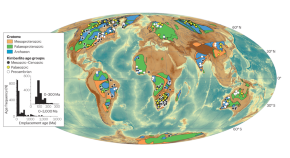
Genesis and evolution of kimberlites
Kimberlites are rare volcanic rocks with unusually deep origins. This Review explores the origin and evolution of kimberlite melts and their insights into mantle composition and dynamics.
- Andrea Giuliani
- Max W. Schmidt
- Yana Fedortchouk

Darkening clouds after restrictions in maritime sulfur emissions
An article in Atmos. Chem. Phys . found that reductions in maritime sulfur emissions led to less reflective clouds above a major shipping corridor, with potential implications for regional warming.

Greenhouse gas emissions and mitigation in rice agriculture
Rice paddies account for a large proportion of total agricultural methane and nitrous oxide emissions. This Review outlines the characteristics, changes and mitigation options for these emissions, highlighting the benefits of water and organic matter management.
- Xiangchen Zhu
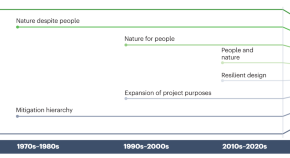
Jointly advancing infrastructure and biodiversity conservation
Infrastructure development and biodiversity conservation are often planned and executed in isolation. However, outcomes from these efforts are interlinked, with coordinated actions required to jointly address sustainability challenges. Natural infrastructure — encompassing a spectrum of natural to conventional solutions — is key to the infrastructure–biodiversity connection and should be brought into large-scale application.
- S. Kyle McKay
- Seth J. Wenger
- Todd S. Bridges
Quick links
- Explore articles by subject
- Guide to authors
- Editorial policies

- SUGGESTED TOPICS
- The Magazine
- Newsletters
- Managing Yourself
- Managing Teams
- Work-life Balance
- The Big Idea
- Data & Visuals
- Reading Lists
- Case Selections
- HBR Learning
- Topic Feeds
- Account Settings
- Email Preferences
How to Improve a Meeting (When You’re Not in Charge)
- Tijs Besieux
- Amy C. Edmondson

You can use these tactics before, during, or after.
Research shows that many employees find meetings ineffective, inefficient, or unproductive, but unless you work in a psychologically safe environment, where candor is encouraged, you’re unlikely to raise your hand and speak up about what’s wrong — especially if you’re not the person running the meeting. The authors have identified a series of interventions that anyone can use:
- The helpful workaround is useful when there is low psychological safety on the team or with the person conducting the meeting. Here, you don’t explicitly name the thing that bothers you, but you ask a question that can help resolve the feelings of frustration you may be experiencing in the meeting.
- The solution-centric proposal works when there is moderate psychological safety. Here, you are to point to the problem area by asking a question that demonstrates how resolving the issue will increase the effectiveness of the meeting.
- The constructive confrontation is for high psychological safety situations. With this approach, you decide to explicitly name the problem and give feedback to forge a productive solution.
Organizations hold meetings all the time — lots of them. In the U.S. alone, 55 million meetings happen daily, but how many of them are actually useful? According to most employees and managers — not very many.
- Tijs Besieux is an independent researcher at Harvard Business School. He is a senior advisor at &samhoud and the founder of Voice Up.
- Amy C. Edmondson is the Novartis Professor of Leadership and Management at Harvard Business School. Her latest book is Right Kind of Wrong: The Science of Failing Well (Atria Books, forthcoming in September 2023).
Partner Center

IMAGES
VIDEO
COMMENTS
Environmental Research Topics are as follows: Climate change and its impacts on ecosystems and society. The effectiveness of carbon capture and storage technology. The role of biodiversity in maintaining healthy ecosystems. The impact of human activity on soil quality. The impact of plastic pollution on marine life.
Topics & Ideas: Environmental Chemistry. The impact of cobalt mining on water quality and the fate of contaminants in the environment. The role of atmospheric chemistry in shaping air quality and climate change. The impact of soil chemistry on nutrient availability and plant growth in wheat monoculture.
2) Renewable Energy. Renewable energy is another fairly mainstream topic in which there is much to learn and research. Although scientists have identified many forms of sustainable energy, such as wind, solar, and hydroelectric power, questions remain about how to best implement these energy sources.
Updated 2024: Top 150 Environmental Science Research Topics Now we are presenting an extensive collection of current and relevant subjects shaping the field. Covering climate change, biodiversity conservation, pollution, renewable energy, and much more, this curated list reflects the latest trends and pressing issues in environmental science.
Whether you're majoring in environmental science or hoping to write a compelling research paper, here are some of the most interesting environmental science topics you can pursue right now. 1. Climate Change. One thing is certain: We'll always have an environment. The question is whether or not it'll be an environment we can actually live in.
As 2021 dawns, people, ecosystems, and wildlife worldwide are facing a panoply of environmental issues. In an effort to help experts and policymakers determine where they might focus research, a panel of 25 scientists and practitioners—including me—from around the globe held discussions in the fall to identify emerging issues that deserve increased attention.
351 Environmental Science Research Topics & Ideas. Environmental science research topics depend on a vast range of issues pivotal to understanding and safeguarding the natural world. Some themes may dive deep into studies of climate change, assessing its impact on ecosystems and suggesting mitigation strategies.
Atom. RSS Feed. Environmental science is the multidisciplinary study of all aspects of the Earth's physical and biological environments. It encompasses environmental chemistry, soil science ...
Ecological restoration projects are expected to increase the terrestrial carbon sink of Tibetan Plateau grassland ecosystems by 15 to 21 tetragrams of carbon by 2060, under high to low emissions ...
Rehydrating Planet Earth. Michael Pollock. Laura Norman. Francina Dominguez. 2,270 views. An innovative journal that advances knowledge of the natural world and its intersections with human society. It supports the formulation of policies that lead to a more inhabitable and sustainable ...
The environment is experiencing a series of problems that have never been seen before. Climate change, which is about to occur, the terrifying rate at which biodiversity is decreasing, and pollution as a ubiquitous problem, among others, have made environmental issues some of the main concerns in today's world.. It is important to carry out research and create awareness on these critical ...
Environmental biotechnology is the branch of biotechnology that addresses environmental problems, such as the removal of pollution, renewable energy generation or biomass production, by exploiting ...
Provided below is a list of topics for an environmental science project that is suitable for your research paper: Air pollution effects on human health. Climate change effects on health. Water pollution and public health. Noise pollution effects on well-being. Mental health effects of environment-related toxins.
This comprehensive list of environmental issues research paper topics provides a wide range of areas to choose from for your research. The topics cover major environmental issues, from climate change and air pollution to biodiversity loss and overpopulation. Each of these topics can be explored from various angles, providing a rich source of ...
Global climate change is not a future problem. Changes to Earth's climate driven by increased human emissions of heat-trapping greenhouse gases are already having widespread effects on the environment: glaciers and ice sheets are shrinking, river and lake ice is breaking up earlier, plant and animal geographic ranges are shifting, and plants and trees are blooming sooner.
EPA's resources on environmental issues include research, basics, what you can do, and an index covering more specific terms. EPA's resources on environmental issues include research, basics, what you can do, and an index covering more specific terms. ... EPA's environmental topics guides you to the most popular pages in your topic of interest.
Environmental research topics refer to conditions of the physical, chemical and biological aspects of the environment. This can include human activity, living organisms, weather and naturally occurring landmarks. Environmental research focuses largely on conservation or prevention. Many professionals may perform environmental research, such as ...
2. Climate, energy and environmental policy. By Alec Tyson, Brian Kennedy and Cary Funk. A majority of Americans consider climate change a priority today so that future generations can have a sustainable planet, and this view is held across generations. Looking to the future, the public is closely divided on what it will take to address climate ...
Environmental economics is the study of the economics of ecological and environmental issues. It focuses on the monetary value of ecosystems and the costs and benefits of environmental policies ...
The life cycle of tornados. History of environmental studies. Positive impact of birdwatching. Drinking water and the environment. Christianity's impact on the climate crisis. Climate's effect on mountain ecosystems. How aviation contributes to global warming. Early commercial adaptation of thermal energy.
Here are some of the biggest environmental problems of our lifetime, from deforestation and biodiversity loss to food waste and fast fashion. —. 1. Global Warming From Fossil Fuels. 2023 was the hottest year on record, with global average temperatures at 1.46C above pre-industrial levels and 0.13C higher than the eleven-month average for 2016 ...
This comprehensive guide to environmental ethics research paper topics is designed to provide students and researchers with a wide array of subjects in the field of environmental ethics. The topics are carefully categorized into ten distinct areas, each offering ten unique research themes. This guide also provides expert advice on how to select ...
Pew Research Center May 26, 2021. Gen Z, Millennials Stand Out for Climate Change Activism, Social Media Engagement With Issue. 3. Local impact of climate change, environmental problems. By Alec Tyson, Brian Kennedy and Cary Funk. A majority of Americans say climate change is having at least some impact on their local community, and half say ...
The research team, ... Environmental Issues; Earth Science; Environmental Awareness; ... View all the latest top news in the environmental sciences, or browse the topics below:
Darkening clouds after restrictions in maritime sulfur emissions. An article in Atmos. Chem. Phys. found that reductions in maritime sulfur emissions led to less reflective clouds above a major ...
The numbers are staggering. In 2022, the world generated 62 million metric tons of electronic waste, also known as "e-waste," according to the United Nations Global E-waste Monitor released ...
Summary. Research shows that many employees find meetings ineffective, inefficient, or unproductive, but unless you work in a psychologically safe environment, where candor is encouraged, you're ...